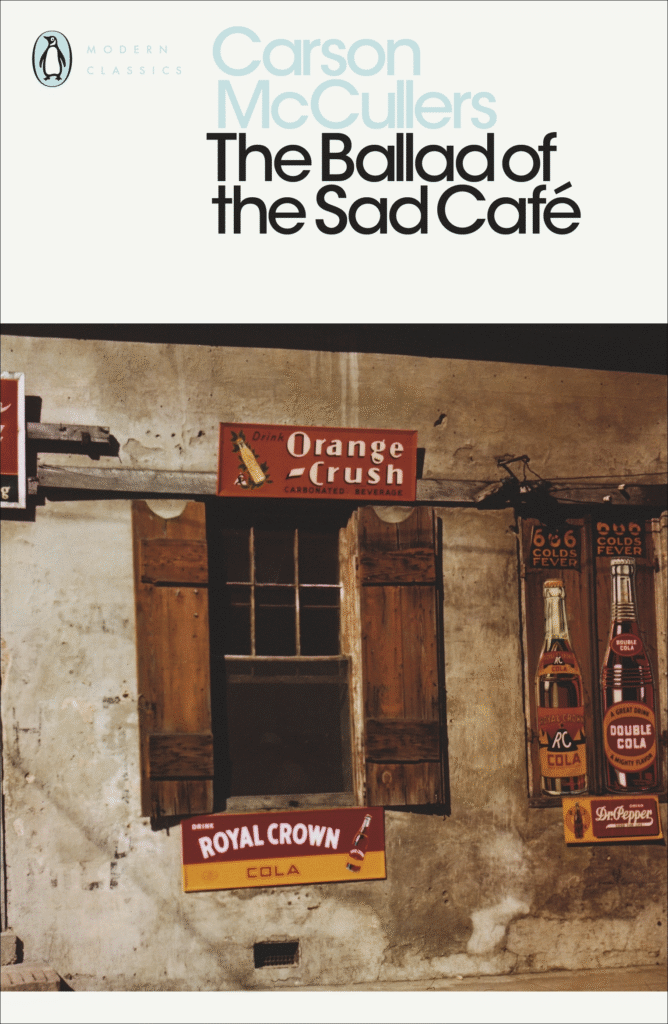
Sunday 26 October 2025
Ankara, Türkiye
The night is still heavy over Ankara when you wake, not to the call of inspiration, but to the high-pitched drone of a mosquito.
It is 3:30 a.m.
Outside, the world sleeps.
Inside, something stirs — part irritation, part calling.
The kind that brings a man to lace his shoes, not for exercise of the body, but for the wandering of the spirit.
There is a city waiting —
Silent, breathing.
A city of poets and ghosts, prophets and gamblers.
And among its stone and asphalt, you will seek not what is shown, but what is revealed.

Above: Ankara, Türkiye
The first light of morning glows faint and blue as Kuğulu Park comes into view.
Swans glide across the pond like white question marks on a sentence the city hasn’t finished.
The surrounding benches cradle the remnants of old conversations.
Here, the world of creation begins.

Above: Kuğulu Park, Ankara
A poet in a heavy coat sits beneath a leafless tree, tearing yesterday’s page from his notebook.
He meets your eyes briefly.
You nod in brotherhood.
There is no competition here —
Only a shared obligation to witness.
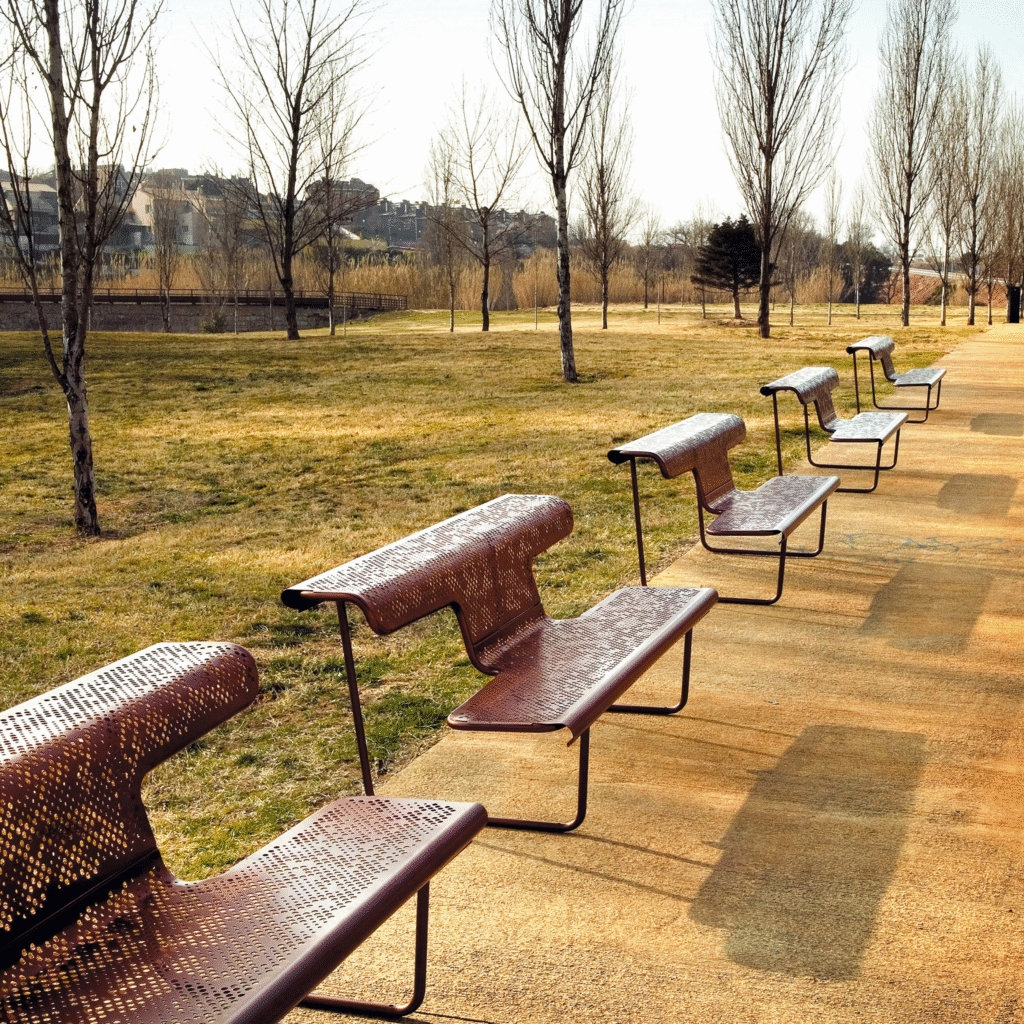
Tunalı Hilmi Avenue murmurs awake.

Above: Tunalı Hilmi Avenue, Ankara
A black Passat idles at the lights.
Its windows are tinted so deeply they become a metaphor.
Is someone watching, or is it only your perception that is being observed?

“The city wears two faces”, the poet says without being asked.
“Only one of them returns your gaze.”
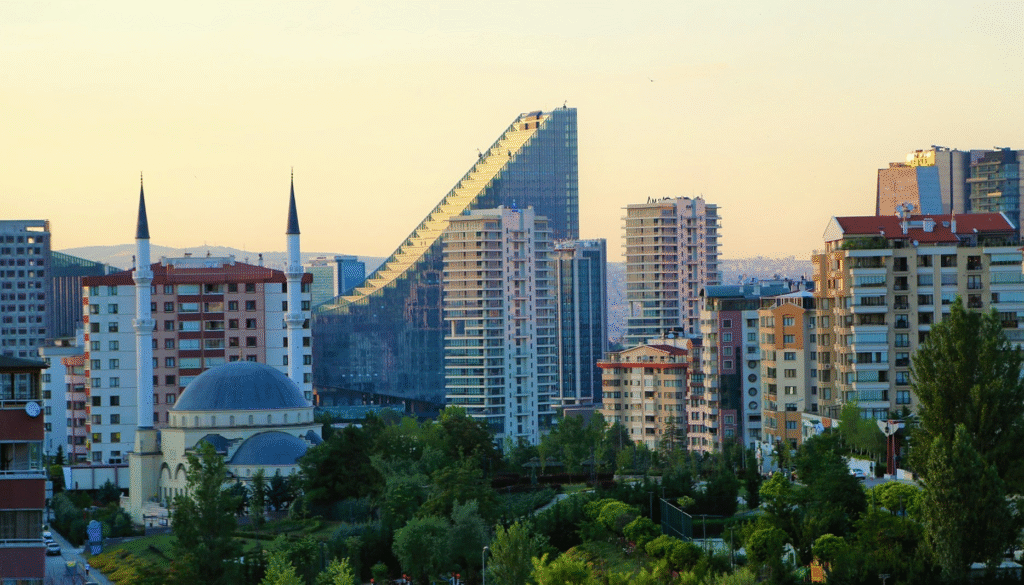
Above: Ankara, Türkiye
As you descend toward Kızılay, the air grows thicker with cigarette smoke and unspoken opinions.
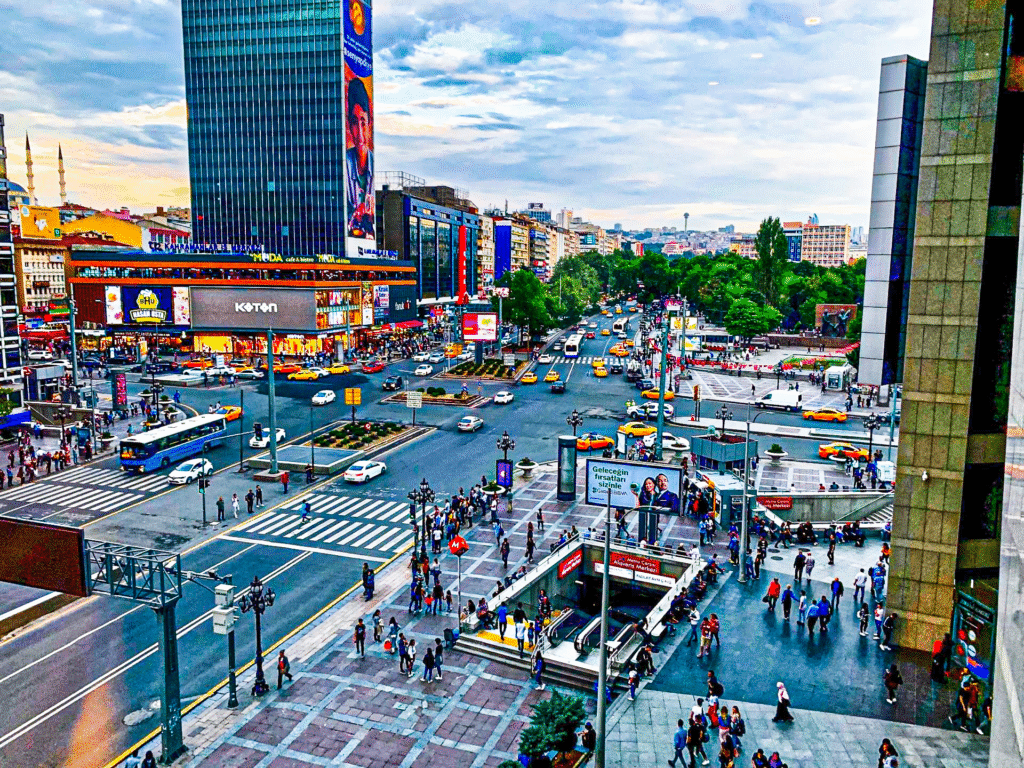
Above: Kizilay Square, Ankara
Sakarya Caddesi is not pretty in daylight, but it is real in the way truth is real —
Unpolished, confrontational, alive.

Above: Sakarya Caddesi, Ankara
You pass secondhand bookstores where Atatürk’s speeches lie beside banned poetry.


Above: Turkish President Mustafa Kemal Atatürk (1881 – 1938)
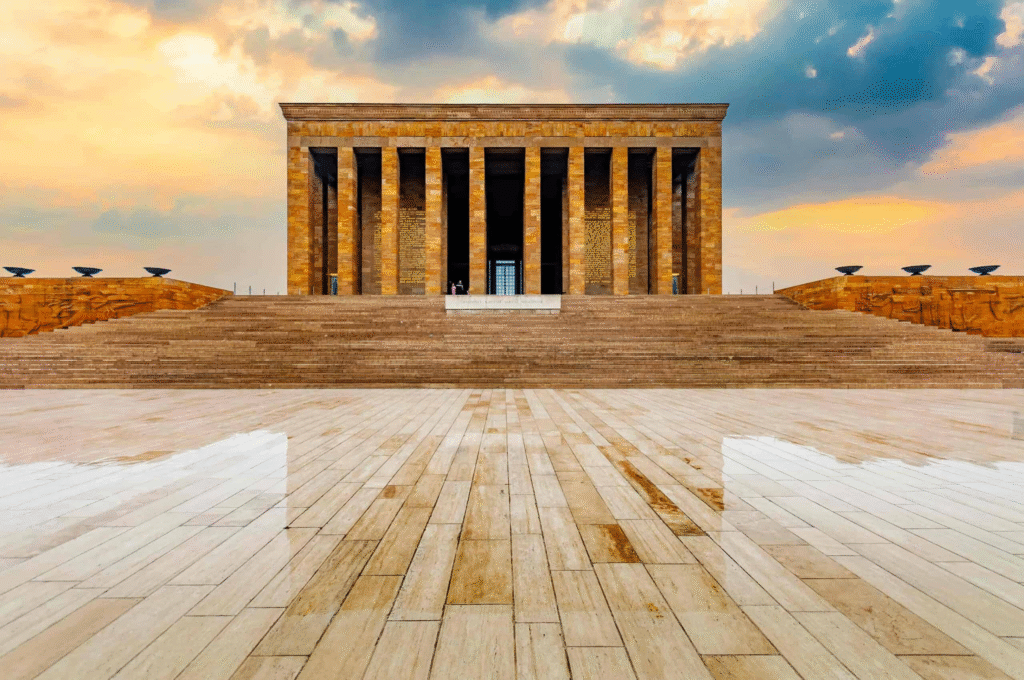
Above: Anitkabir (Atatürk’s mausoleum), Ankara
A group of university students huddle around a lone plastic table outside a tea shop, arguing over whether Camus was a nihilist or a moralist.
Their voices rise and fall with passion, not malice.


Above: French novelist/philosopher Albert Camus (1913 – 1960)
Then, silence falls as another black Passat slides past.
Eyes lower.
Voices resume after it turns the corner — but softer now, cautious.
Freedom here is not assumed.
It is negotiated, poem by poem.

The hill to Ankara Castle rises before you like a vertebra of history.
Cobblestones worn by centuries massage your doubts into contemplation.
Antique dealers set out their relics:
Ottoman keys, Roman coins, black-and-white photos of families who have long since dispersed into time.
From the ramparts, you see the full scope of Ankara:
The polished districts to the west, the sprawling uncertainty to the east.
You follow the line where the city’s breath changes —
Where cafés give way to tenements, where calligraphy becomes graffiti.
A call to prayer echoes.
A saz joins it from a nearby doorway, turning devotion into music.
Beauty here is ancient and unashamed, but never blind.

Above: Ankara Kale (castle)
You do not enter.
You approach.
Altındağ stretches before you, its colors muted like a photograph left too long in the sun.
Laundry flaps from rusted balconies.
A boy on a cracked sidewalk beats rhythms on an empty paint can –
Hip-hop born of necessity, not trend.
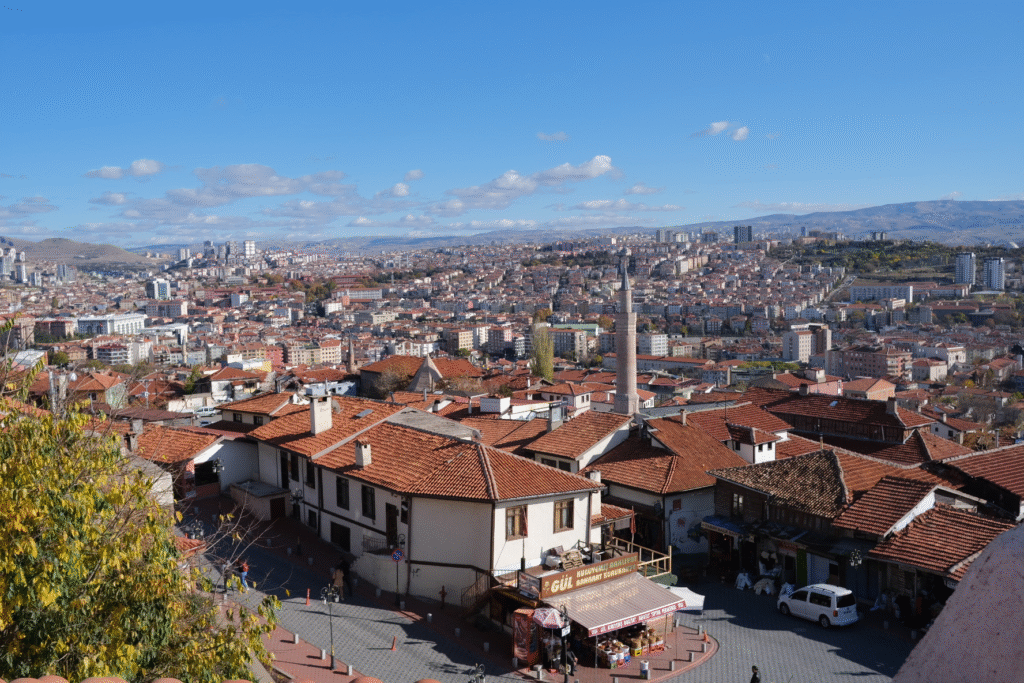
Above: Altindağ, Ankara
A black Passat appears, slow, deliberate.
No music.
Its presence is louder than sound.
Children scatter not out of fear, but out of respect for a law older than legislation:
This is someone else’s rhythm now.

You hear Ankara rap lyrics echo in your memory:
“CinCinnn – Ankara’nın kalbi değil, yarasıdır.
Ama her yara yaşamın kanıtıdır.”
(Çinçin – not the heart, but the wound of Ankara.
Yet every wound proves life.)
In the face of this place, your bohemian ideals are tested.
Is the artist an observer or must he bear witness even when the truth is sharp?
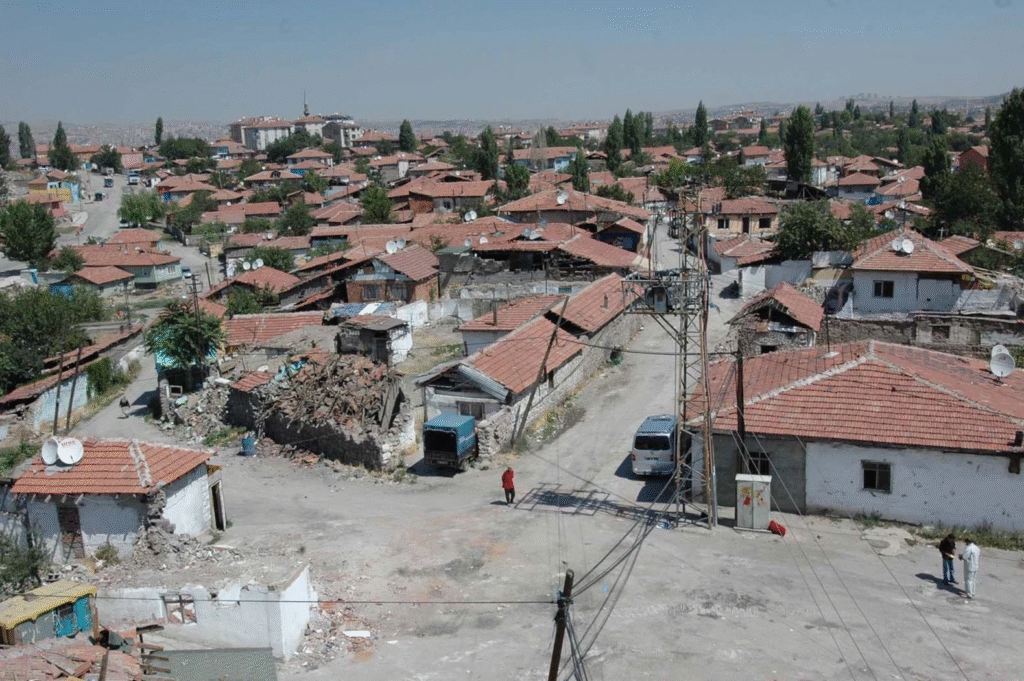
Above: Çincin, Ankara
You return westward as twilight blooms.
Hamamönü glows with lantern light.
Restored Ottoman houses cradle cafés where Sufi musicians pluck eternity from strings.
Jasmine and rosewater perfume the air.
Here, art is not defiance —
It is healing.
Students sketch at wooden tables.
A calligrapher writes huşu, reverence, in looping ink.
Tea is poured, not consumed — shared.

Above: Hamamönu, Ankara
And yet, you carry the memory of Çincin in your bones.

Above: Çincin, Ankara
You realize:
Ankara is not a city of contradictions.
It is a city of wholeness.
It contains both wound and remedy, despair and dream.
It is not divided between the enlightened and the fallen —
It is alive with the tension of becoming.
To write in Ankara is to hold both realities in one hand and let neither overpower the other.
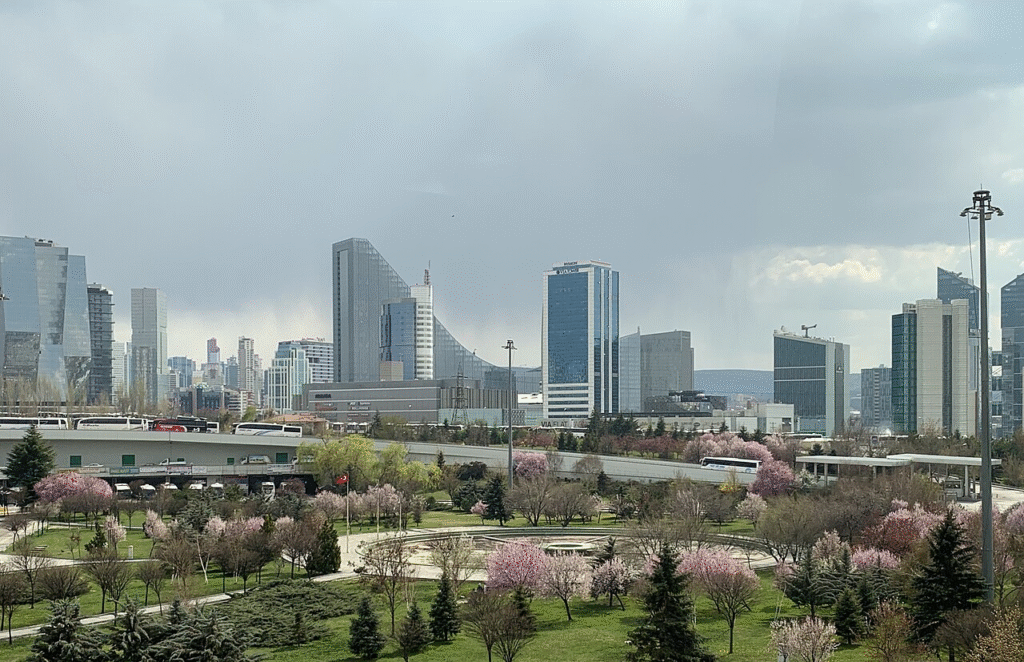
Above: Ankara, Türkiye
You return to your room.
The mosquito is gone.
The city sleeps, but does not rest.
It dreams in two voices:
One of poetry, the other of warning.
And you understand now:
The true bohemian is not the escapist —
But the reconciler.
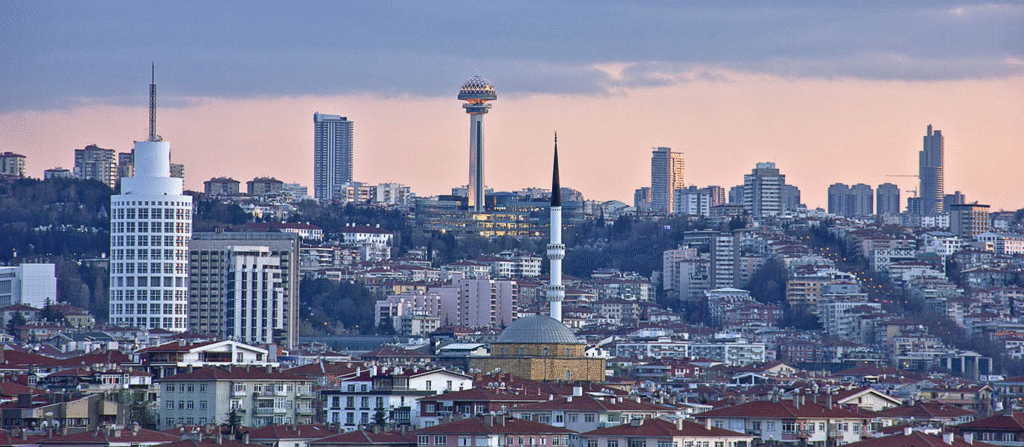
Above: Ankara, Türkiye
A day off.
Wonder of wonders, miracle of miracles.
My mind peeks around the corner of that which has been constructed.
A story tickles the edges of imagination.
An artist, a musician, a writer wishing they were haunted by their visionary predecessors.

One can find inspiration in the works of others.
Whatever your imagination is, they are waiting for you.
Dead or alive, good or bad, the greatest writers are available as guides.
That reading improves you as a writer is unquestionable.
Emulation, imitation, the standing on the shoulders of those creative giants, can be the source of inspiration for whatever one seeks to achieve.

I imagine a story of three creative types wishing they were visited by those who inspired them.
(I imagine that this may have been what Jonathan Swift had in mind when he had Lemuel Gulliver visit a magician’s island where one could converse with the dead.

Above: Irish writer Jonathan Swift (1667 – 1745)

Writers are always in dialogue or conflict with their predecessors —but not as haunting in a supernatural sense, but rather as inheritance, rivalry and necessity.

Margaret Atwood suggests that to write is to enter into a conversation with all writers who came before you.
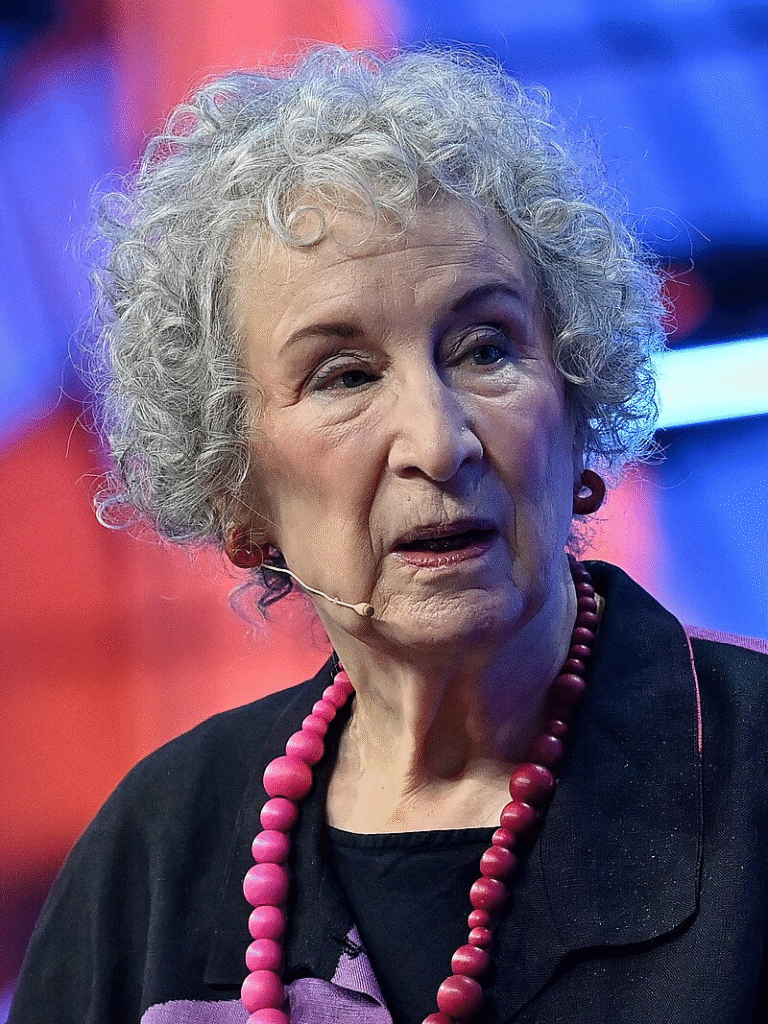
Above: Canadian writer Margaret Atwood
You “negotiate with the dead” because they form the tradition you must confront, respond to, or rebel against.
She writes that all artists stand on a threshold between life and death (creating something that will outlive them), are influenced by dead authors — sometimes lovingly, sometimes in resistance – and participate in a lineage and must decide consciously what to inherit and what to abandon.
Atwood suggests that the dead are both helpers and threats:
They can inspire you, but they can also overshadow you.
Originality is always relational:
You are original in response to what has already been done.
“All writers learn from the dead.
Some make the dead into idols.
Others tear them down to build something new from the rubble.”

I picture a café I hope my feet will one day find, the Café de la Paix – a name inspired by former haunts no longer my own – the Café de la Paix in Québec City, the Café Wim in Ottawa, the Schwarz Engel of St. Gallen, taverns and cafés I have known in Freiburg im Breisgau and Montréal, Oxford and Bruges, Valetta and Antwerp – such places to love.

Above: Café de la Paix, Québec City, Québec, Canada
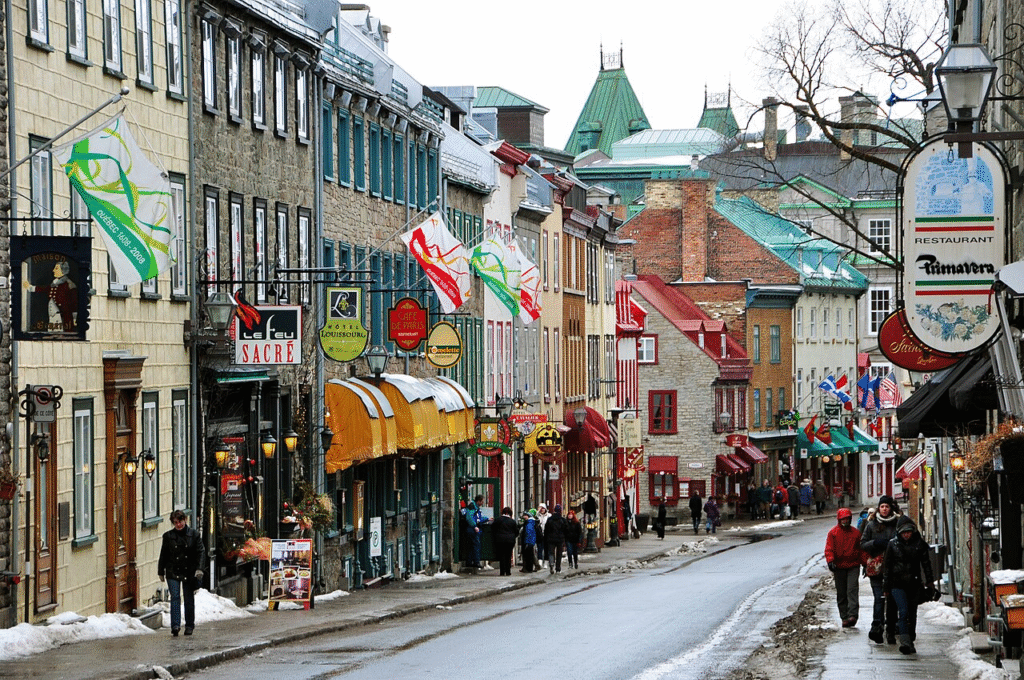
Above: Québec City, Québec, Canada


Above: Parliament Hill, Ottawa, Ontario, Canada

Above: Schwarz Engel, St. Gallen, Switzerland
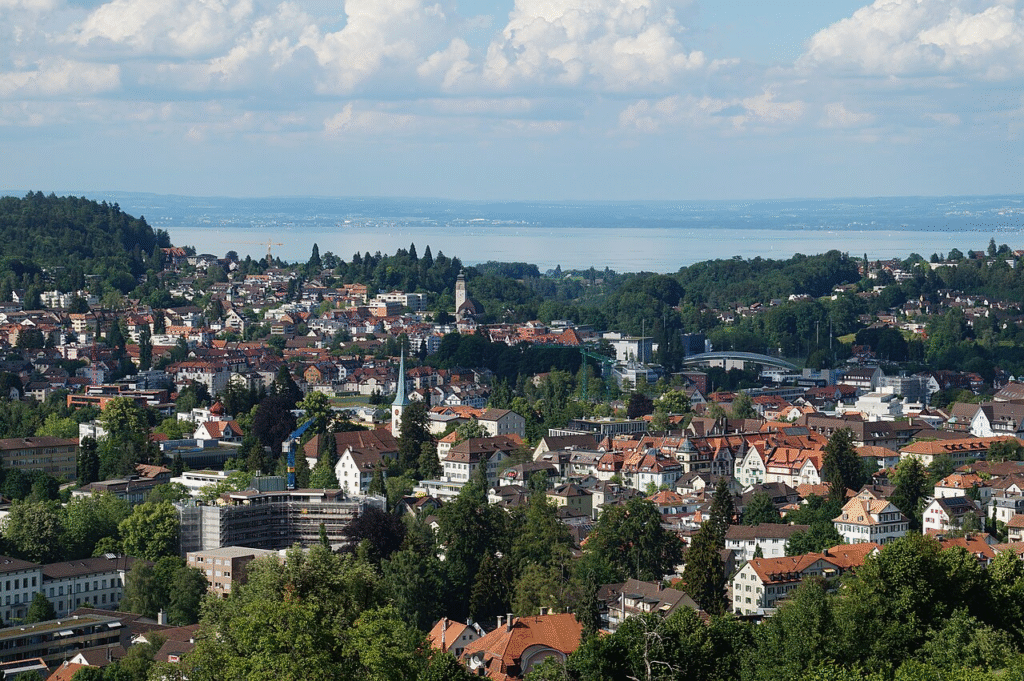
Above: St. Gallen, Switzerland
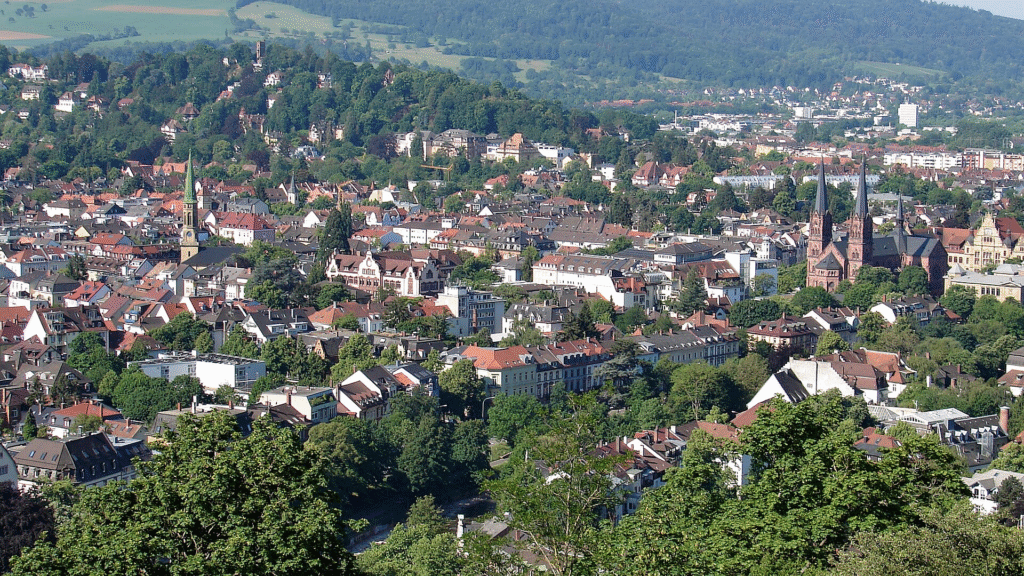
Above: Freiburg im Breisgau, Baden-Württemberg, Germany
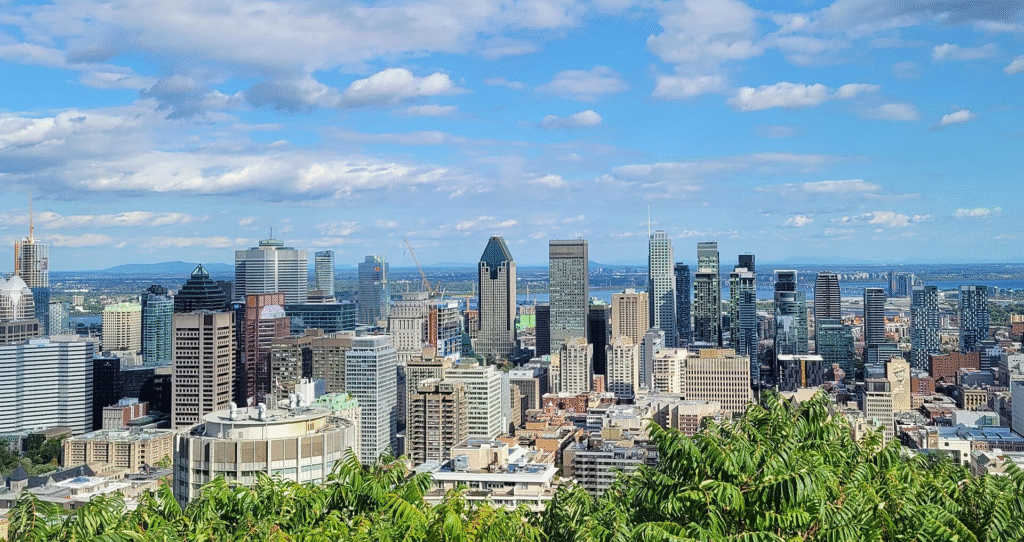
Above: Montréal, Québec, Canada

Above: Oxford, England
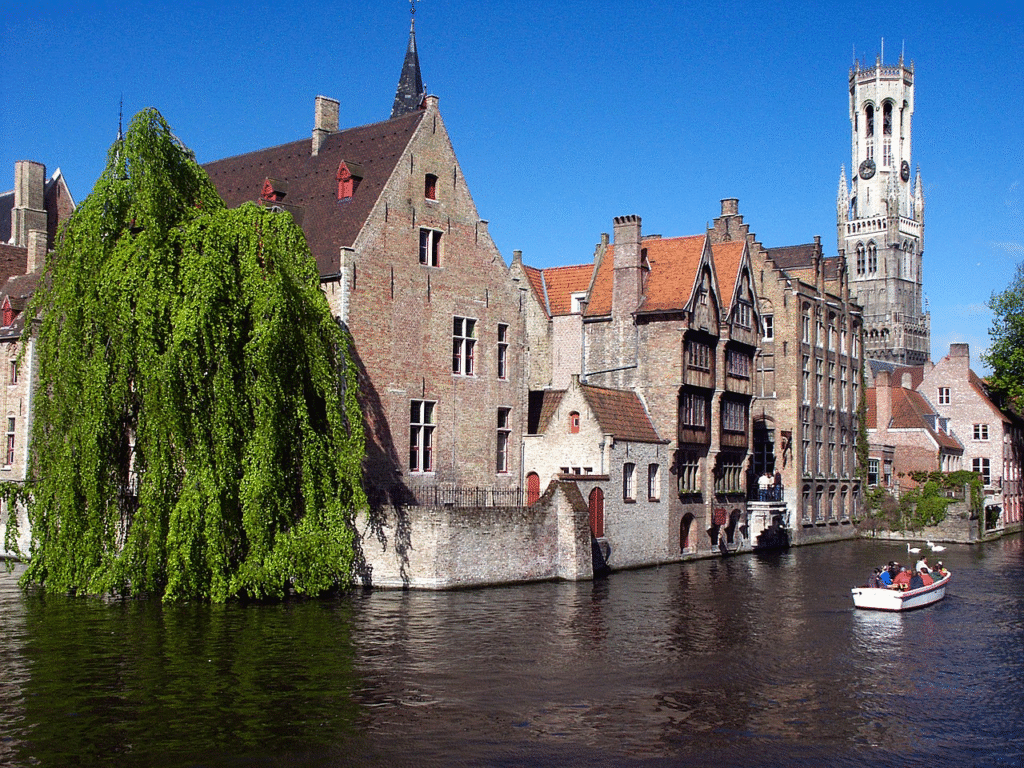
Above: Bruges, Belgium
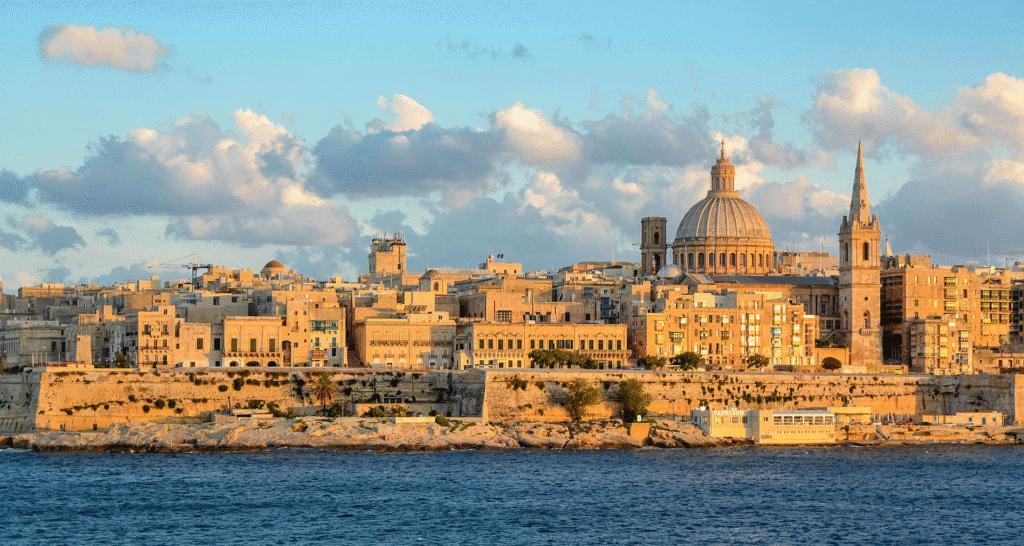
Above: Valetta, Malta
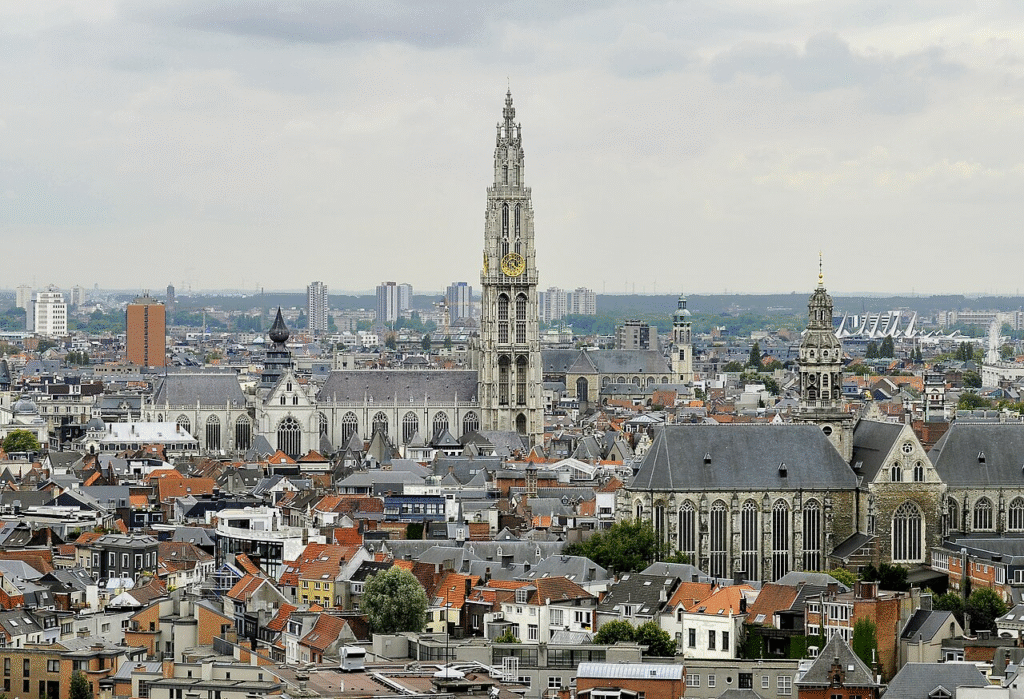
Above: Antwerp, Belgium
Low lighting, steaming bowls of café au lait during the day.

Red red wine by candlelight at night.

Jazz softly playing from the hidden hearts of concealed speakers.

Tabletops cracked, battered and scarred yet still bearing an unbroken, unspoken dignity.

Étienne’s pen hovers over the page for a long time before the words finally come:
“Peace is a beautiful lie.
We come to the Café de la Paix believing we are pilgrims of genius, seeking conversation with the dead.
But what we find, sitting already at our table, are the unborn versions of ourselves —
Silent, disappointed and waiting.“
He lowered the pen.
Across from him, the other two say nothing.
Perhaps they have seen them too.
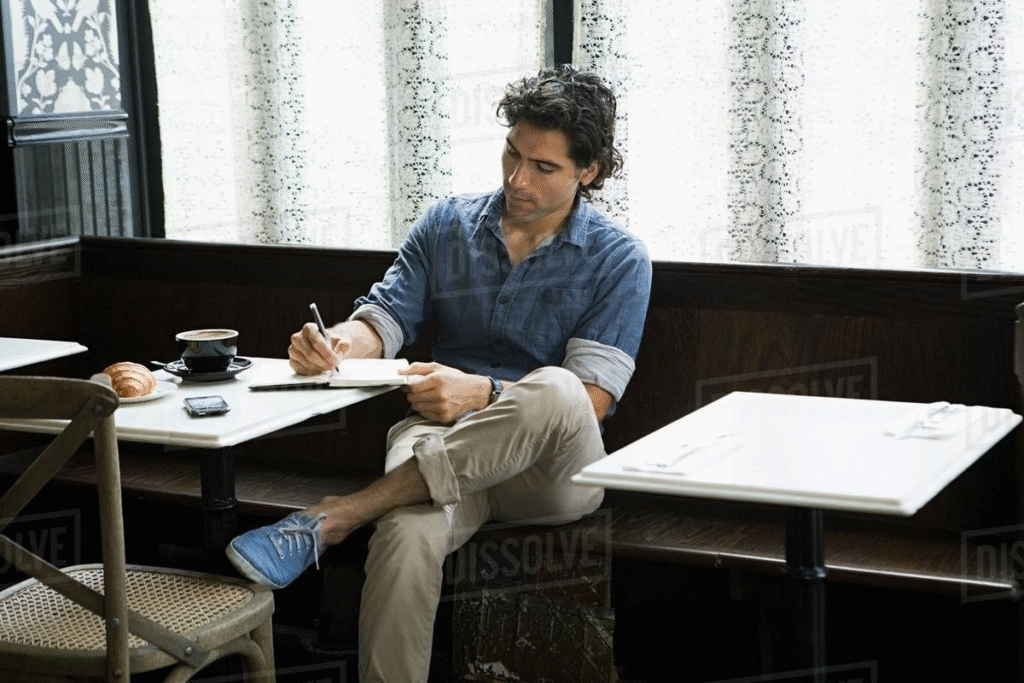
The three are gathered around a table.
Two women and a man, college alumni all resident in an unnamed city.
This could be Rotterdam or anywhere,

Liverpool or Rome.
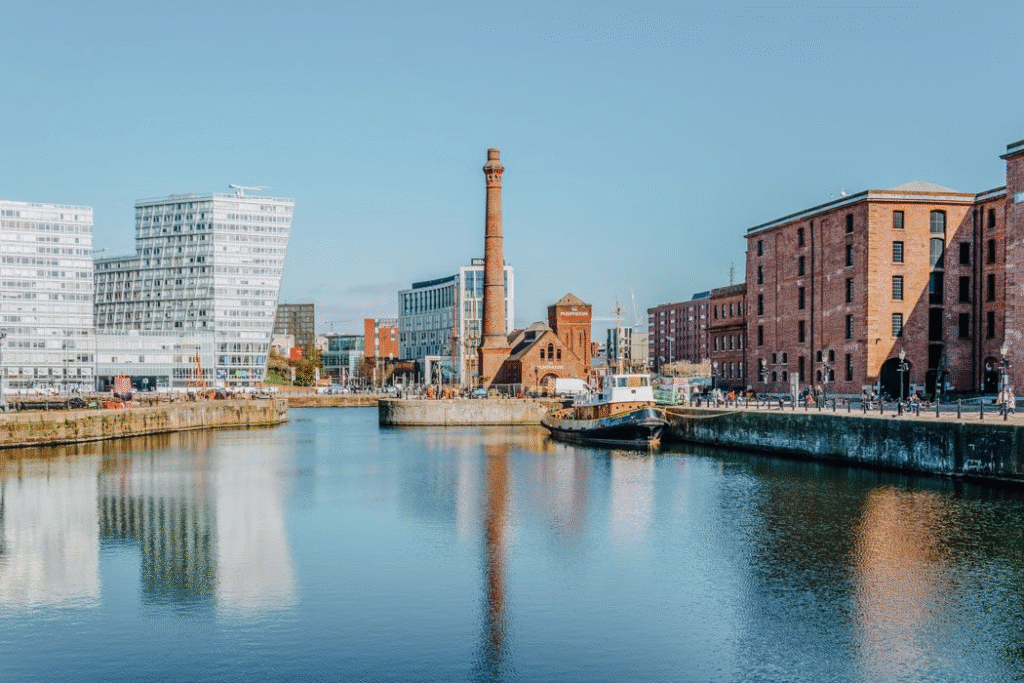
Above: Liverpool, Merseyside, England

Above: Rome, Italy
Hints of Paris or Montréal,

Above: Paris, France

Above: Montréal, Québec, Canada
Bruxelles or Bruges.
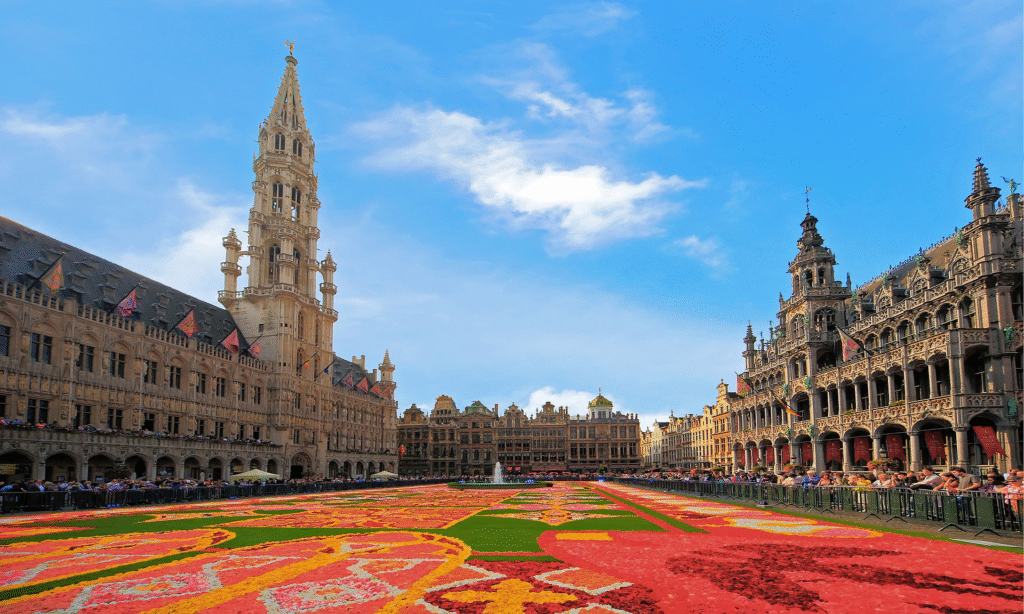
Above: Grand Place, Brussels, Belgium
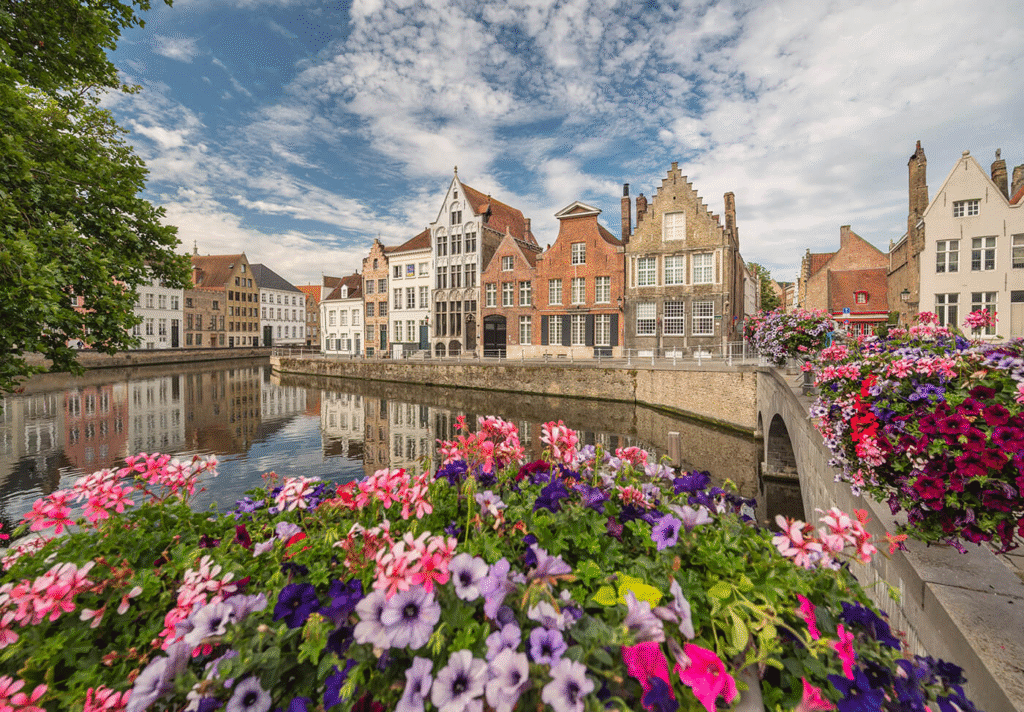
Above: Bruges, Flanders, Belgium
Their conversation resembles Billy Joel’s “Scenes in an Italian Restaurant“.
“A bottle of white, a bottle of red,
Perhaps a bottle of rose instead
We’ll get a table near the street
In our old familiar place
You and I, face to face
A bottle of red, a bottle of white,
It all depends upon your appetite
I’ll meet you any time you want
In our Italian restaurant.…
A bottle of red, a bottle of white,
Whatever kind of mood you’re in tonight
I’ll meet you anytime you want
In our Italian restaurant.“
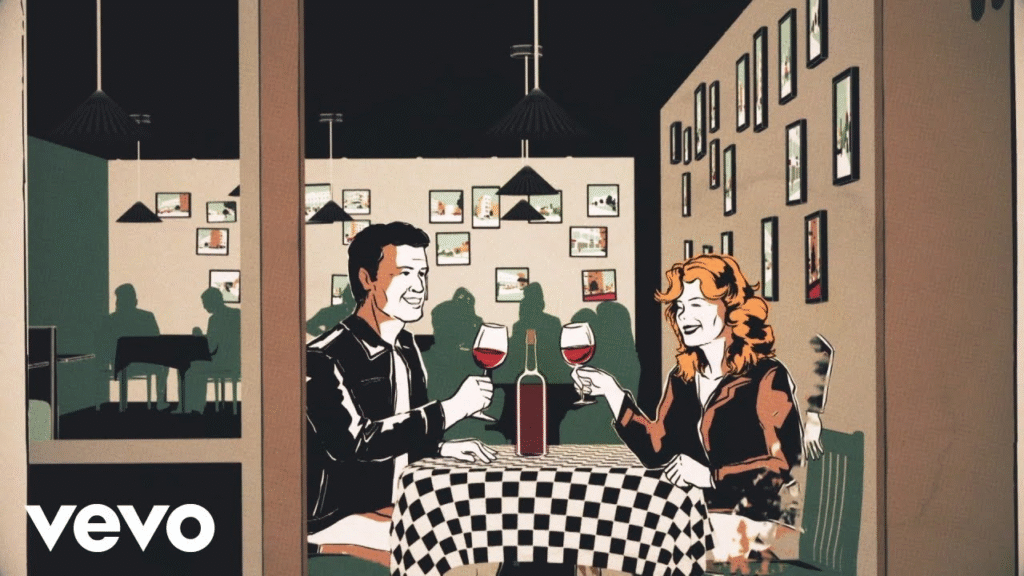
Étienne keeps his palm pressed flat over the page, as if the words beneath might rise up and expose him.
His eyes avoids the fourth chair —
The one no one has pulled out, yet which seems to have seated itself.
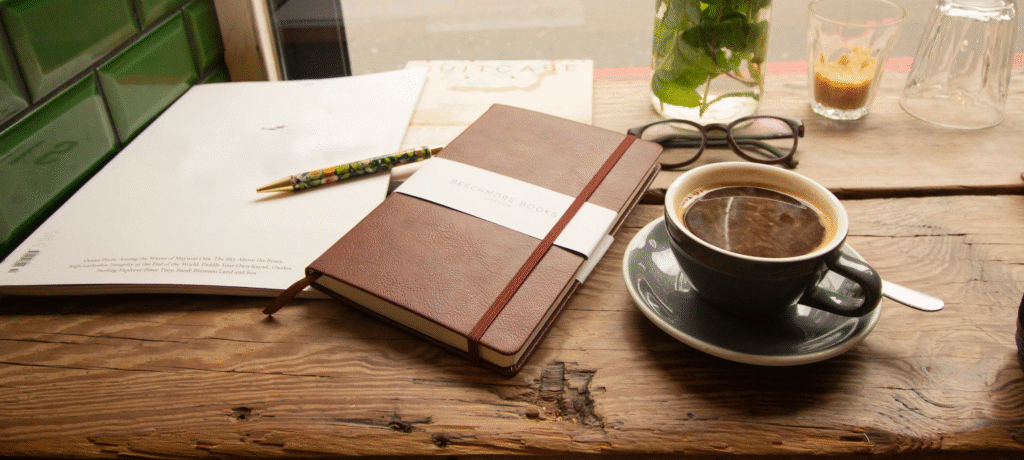
Across from him sits Mireille, her fingers stained with the cadmium yellow she claims to have washed off hours ago.
She is not looking at Étienne.
She is staring at the lamplight reflecting in the café window —watching, not her own reflection, but another’s.
The woman in the glass is everything she fears she will never become:
Fearless, unapologetic, incandescent with purpose.
Mireille blinks once, as if to dismiss it, but the apparition remains.

Beside her, Clara sits motionless, her hands resting on the closed lid of an imaginary piano only she can hear.
Some nights the music comes unbidden, unwelcomed —
Fragments of Mozart’s laughter,
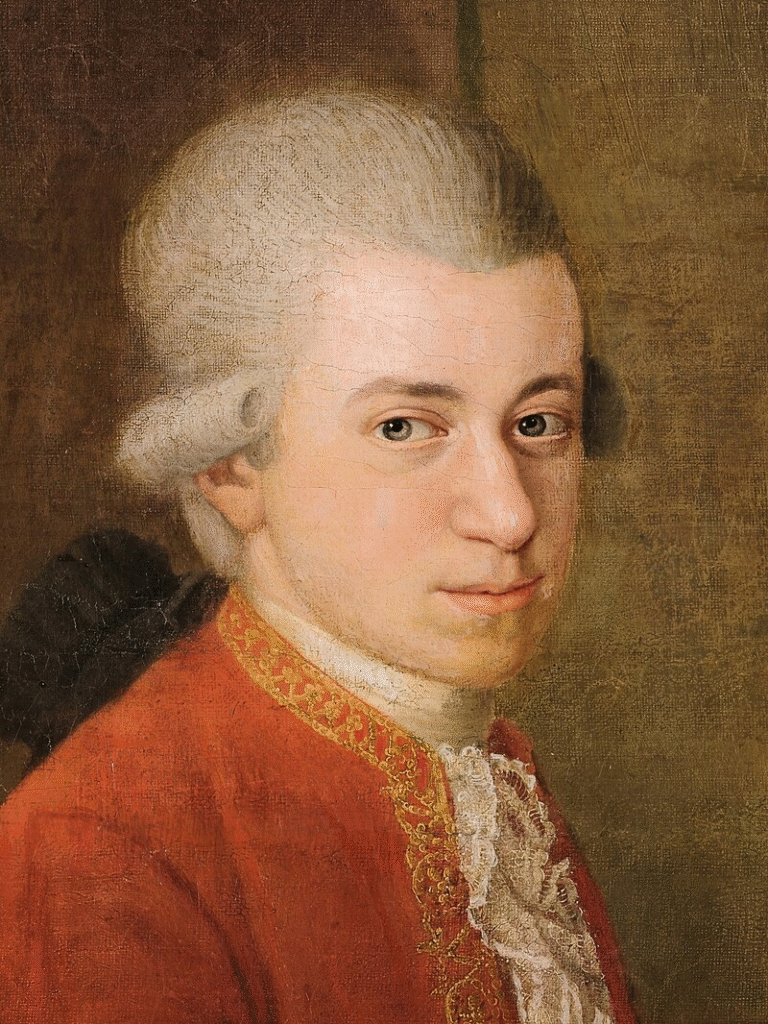
Above: Austrian composer Wolfgang Amadeus Mozart (1756 – 1791)
Beethoven’s rage.

Above: German composer Ludwig van Beethoven (1770 – 1827)
But tonight it is worse.
Tonight there is no music at all.
Only silence.
A silence that does not comfort, but accuses.

None of them dare speak of the fourth presence at their table.
For each sees a different figure there.
Not a master they have worshipped—
But a self they have abandoned.

Above: Paul Gauguin’s armchair, Vincent van Gogh (1888)
The conversation is reflective, contemplative, the scent of My Dinner with André (1981):

(Struggling playwright Wally dreads having dinner with his old friend André, whom he has been avoiding since André gave up his career as a theater director in 1975 amidst a midlife crisis and embarked on an extended hiatus during which he travelled the world.
Wally reflects that as he has aged he has had to focus more on making money than art.
“The life of a playwright is tough.
It’s not easy as some people seem to think.
You work hard writing plays and nobody puts them on.
You take up other lines of work to try to make a living.
I became an actor, and people don’t hire you.
So you just spend your days doing the errands of your trade.
Today I had to be up by ten in the morning to make some important phone calls.
Then I’d gone to the stationery store to buy envelopes.
Then to the xerox shop.
There were dozens of things to do.
By five o’clock, I’d finally made it to the post office and mailed off several copies of my plays, meanwhile checking constantly with my answering service to see if my agent had called with any acting work.
In the morning, the mailbox had just been stuffed with bills!
What was I supposed to do?
How was I supposed to pay them?
After all, I was already doing my best!
I’ve lived in this city all my life.
I grew up on the Upper East Side, and when I was 10 years old, I was rich!
I was an aristocrat.
Riding around in taxis, surrounded by comfort, and all I thought about was art and music.
Now I’m 36, and all I think about is money!”

Above: American actor/playwright Wallace Shawn
At the Café des Artistes in Manhattan, André tells Wally about some of the adventures he has had since they last saw each other, which included:
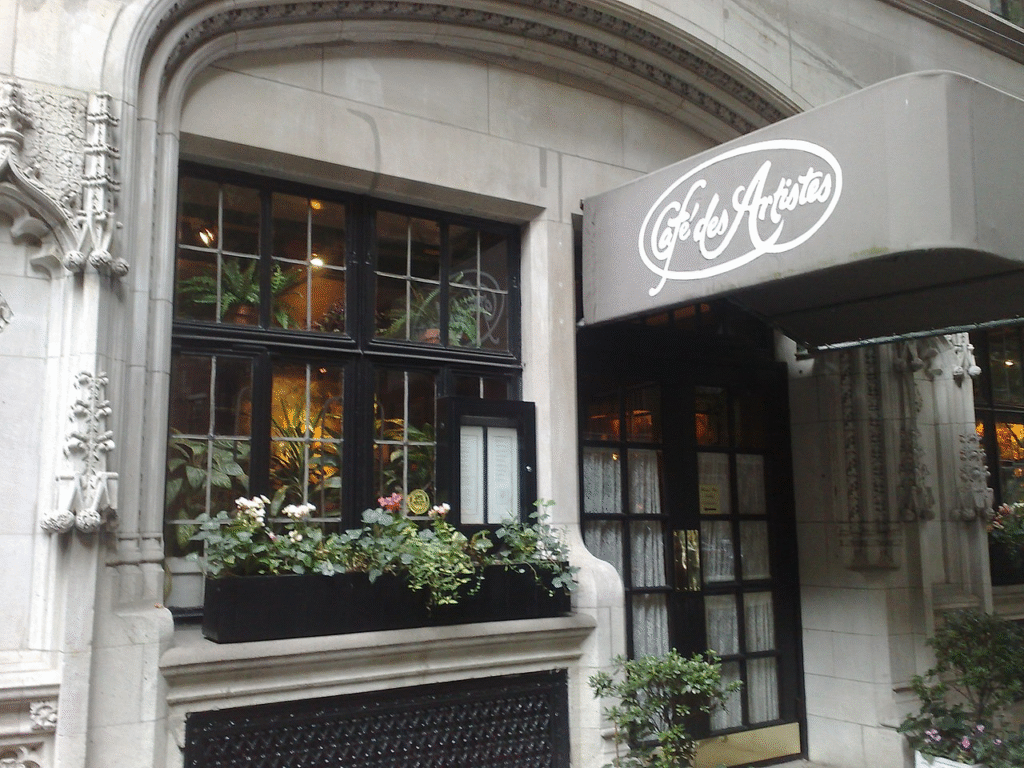
Above: Café des Artistes, Manhattan, New York City
- Working with his mentor Jerzy Grotowski and a group of Polish actors in a forest in Poland
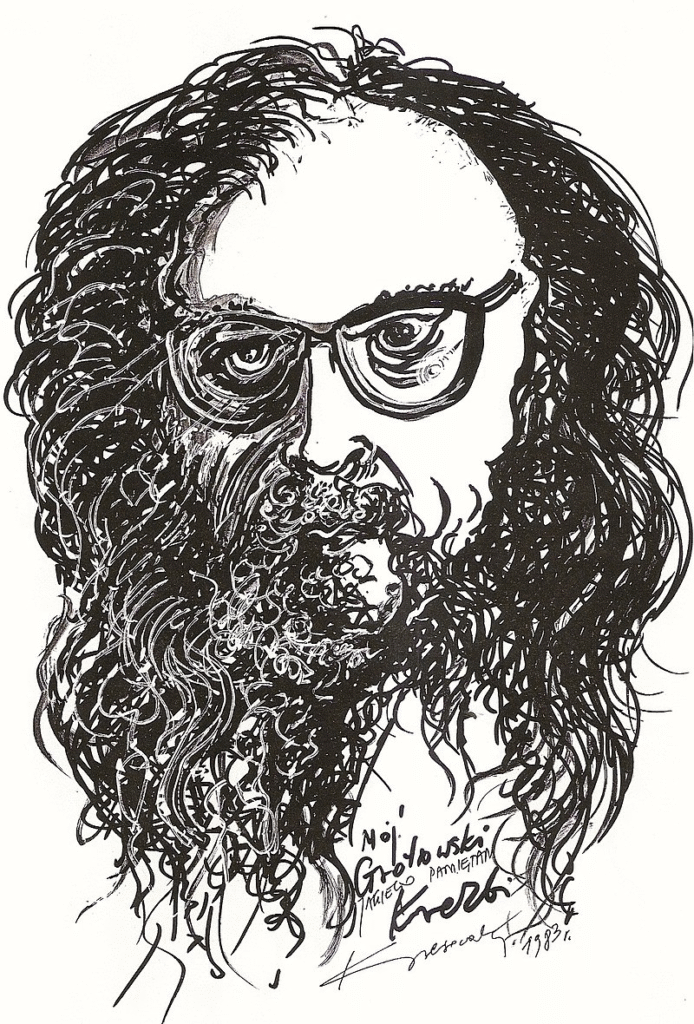
Above: Polish theatre director/dramatic theorist Jerzy Grotowski (1933 – 1999)

Above: Bialowieza Forest, Poland
- Traveling to the Sahara while trying to create a play based on The Little Prince by Antoine de Saint-Exupéry

Above: The Sahara Desert, Algeria
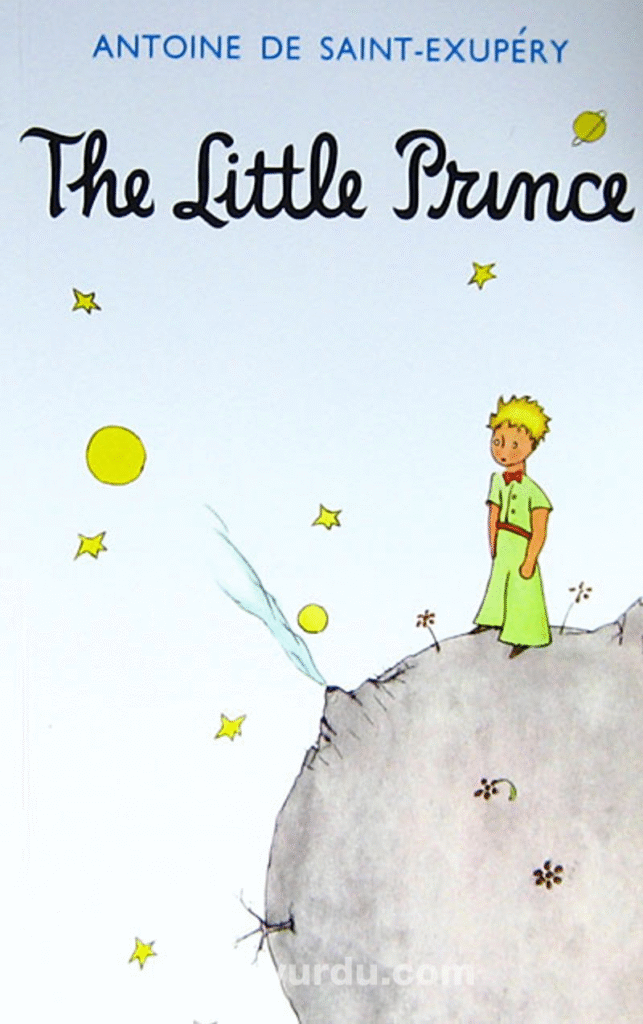

Above: French aviator/writer Antoine de Saint-Exupéry (1900 – 1944)
- Visiting the ecological commune Findhorn in Scotland
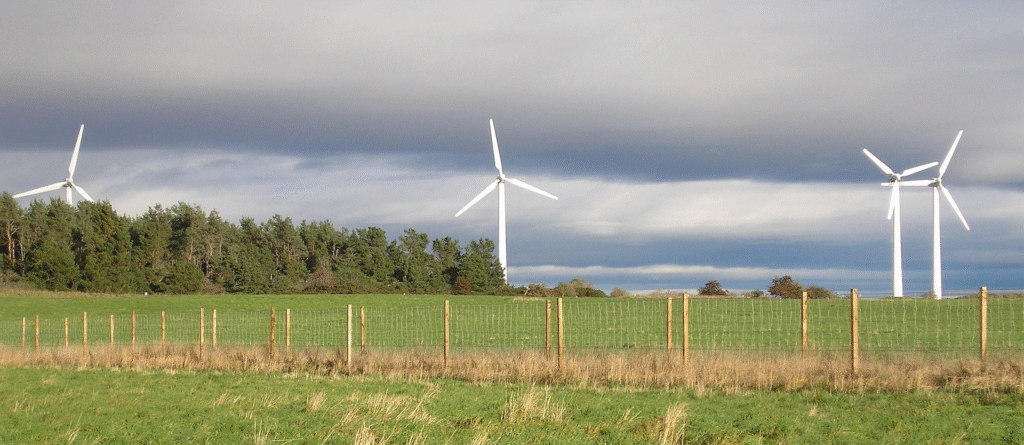
Above: Findhorn, Scotland
The last in this string of events was when André and a small group of friends arranged Halloween-themed experiences for each other at an estate in Montauk, including the participants being briefly buried alive.


Above: Montauk, Long Island, New York, USA
André says he needed to do all of these things to get out of the rut he was in and learn how to be human.
“We’re bored.
We’re all bored now.
But has it ever occurred to you, Wally, that the process that creates this boredom that we see in the world now, may very well be a self perpetuating, unconscious form of brainwashing created by a world totalitarian government based on money and that all of this is much more dangerous than one thinks, and its not just a question of individual survival, Wally, but that somebody who’s bored is asleep, and somebody who’s asleep will not say no?“
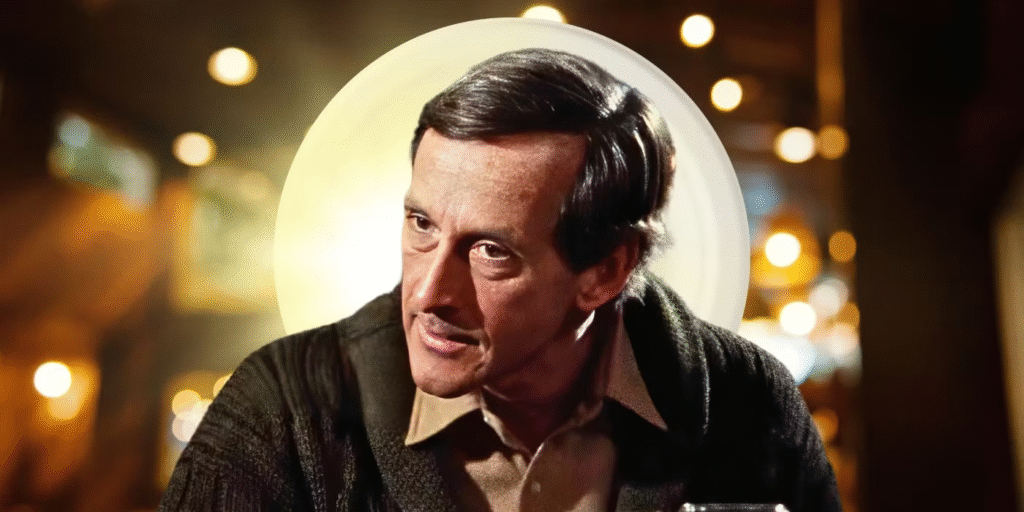
Above: French-born American theatre director, writer and actor André Gregory
Wally argues that living as André has done for the past several years is simply not possible for most people.
He describes how he finds pleasure in more ordinary things, like a cup of coffee or his new electric blanket.

André asserts that focusing too much on comfort can be dangerous.
What passes for normal life in New York City is more akin to living in a dream than reality.
While Wally agrees with many of Andre’s criticisms of modern society, he takes issue with the more mystical aspects of Andre’s stories.

Above: Scene from My Dinner with André
André: What does it do to us, Wally, living in an environment where something as massive as the seasons or winter or cold, don’t in any way affect us?
I mean, we’re animals after all.
I mean…
What does that mean?
I think that means that instead of living under the sun and the moon and the sky and the stars, we’re living in a fantasy world of our own making.
Wally: Yeah, but I mean, I would never give up my electric blanket, Andre.
I mean, because New York is cold in the winter.
I mean, our apartment is cold!
It’s a difficult environment.
I mean, our life is tough enough as it is.
I’m not looking for ways to get rid of a few things that provide relief and comfort.
I mean, on the contrary, I’m looking for more comfort because the world is very abrasive.
I mean, I’m trying to protect myself because, really, there’s these abrasive beatings to be avoided everywhere you look!
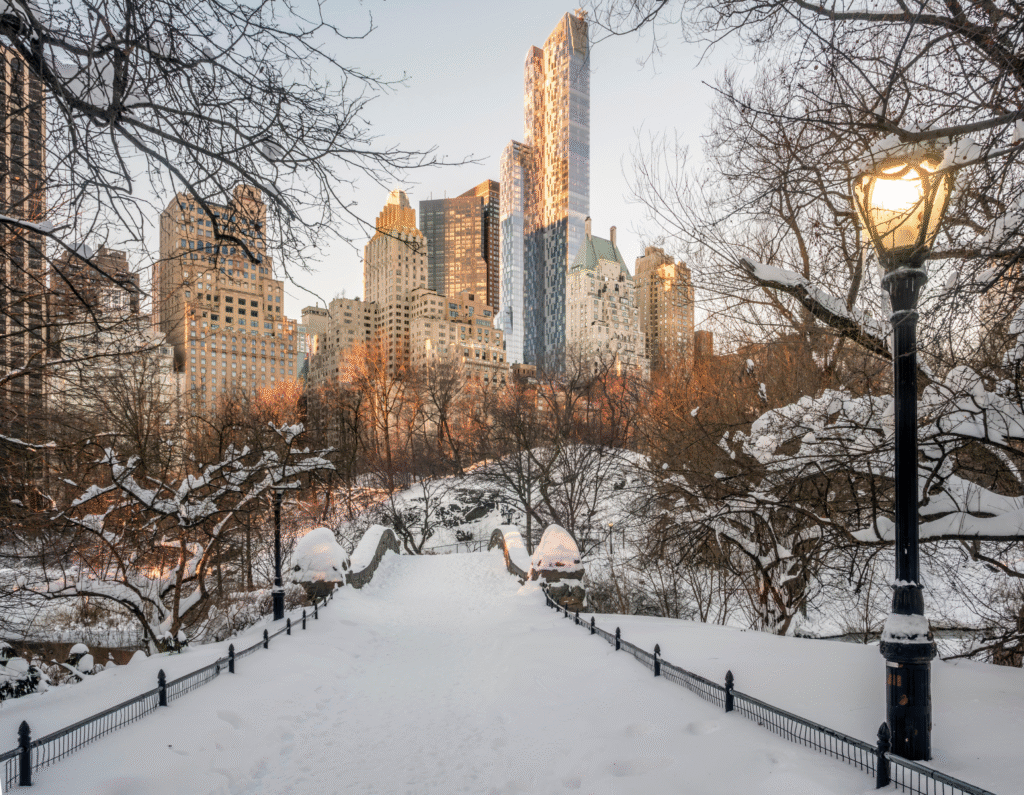
Above: New York City
“It’s four in the morning, the end of December.
I’m writing you now just to see if you’re better.
New York is cold, but I like where I’m living.
There’s music on Clinton Street all through the evening.
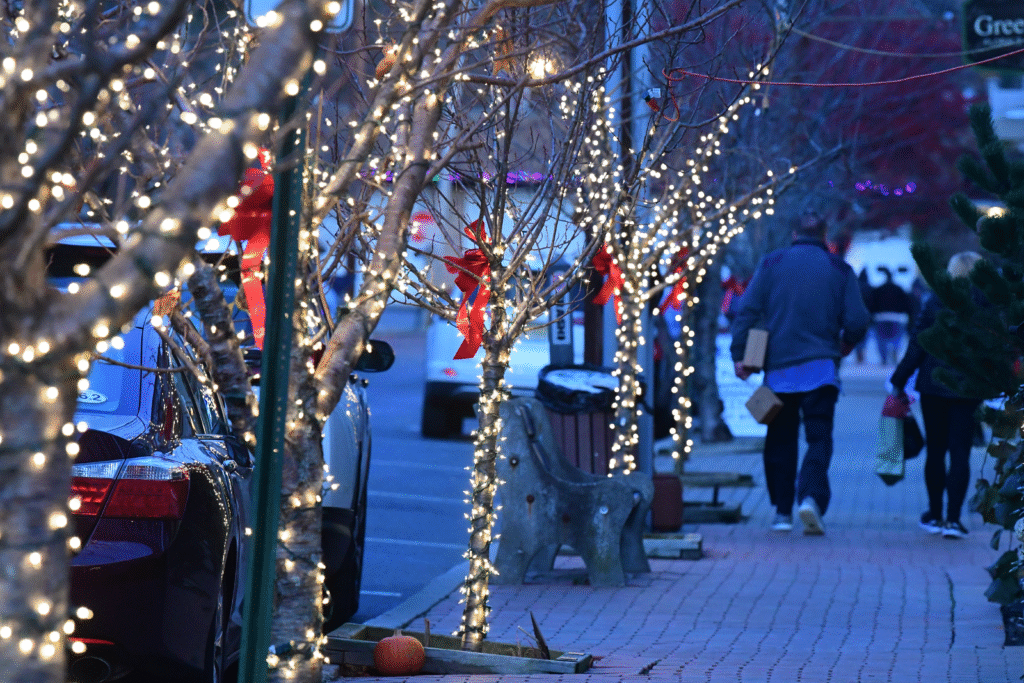
Above: Clinton Street, New York City
I hear that you’re building your little house deep in the desert
You’re living for nothing now.
I hope you’re keeping some kind of record.

Yes, and Jane came by with a lock of your hair.
She said that you gave it to her.
That night that you planned to go clear:
Did you ever go clear?

Ah, the last time we saw you you looked so much older.
Your famous blue raincoat was torn at the shoulder.
You’d been to the station to meet every train.
You came home without Lili Marlene.
And you treated my woman to a flake of your life.
And when she came back she was nobody’s wife.
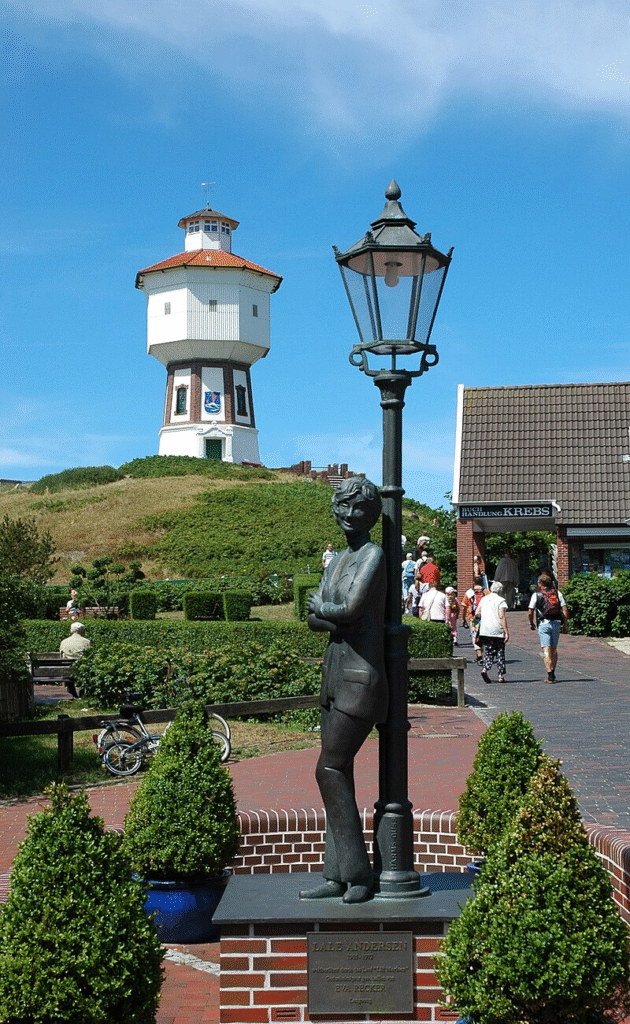
Above: Statue of Lili Marlene, Langeoog, Germany
Well, I see you there with the rose in your teeth.
One more thin gypsy thief.
Well, I see Jane’s awake.
She sends her regards.

And what can I tell you my brother, my killer.
What can I possibly say?
I guess that I miss you, I guess I forgive you.
I’m glad you stood in my way.
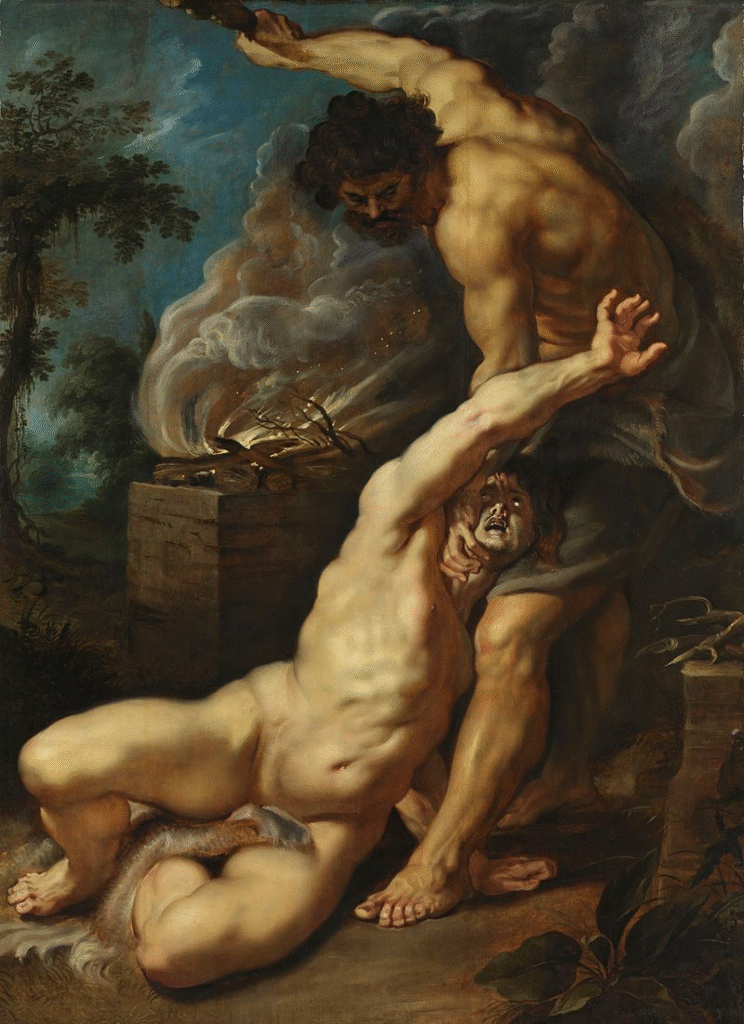
Above: Cain slaying Abel, Peter Paul Rubens, 1600
If you ever come by here, for Jane or for me.
Well, your enemy is sleeping, and his woman is free.
Yes, and thanks, for the trouble you took from her eyes.
I thought it was there for good so I never tried.
And Jane came by with a lock of your hair
She said that you gave it to her
That night that you planned to go clear
Sincerely, L Cohen“

Andre: But, Wally, don’t you see that comfort can be dangerous?
I mean, you like to be comfortable and I like to be comfortable too, but comfort can lull you into a dangerous tranquility. )
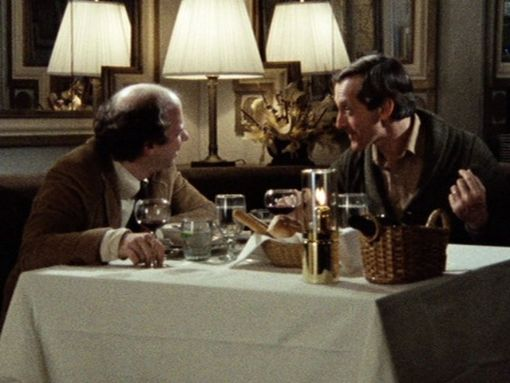
Above: Scene from My Dinner with André
In the vein of Midnight in Paris….

(A 2011 fantasy comedy film set in Paris, the film follows Gil Pender, a screenwriter and aspiring novelist, who is forced to confront the shortcomings of his relationship with his materialistic fiancée and their divergent goals, which become increasingly exaggerated as he travels back in time to the 1920s each night at midnight.

Above: Gil Pender (Owen Wilson), Midnight in Paris
A golden age where Hemingway and Fitzgerald and the denizens of that “movable feast” thrive.

Above: Zelda (1900 – 1948)(Alison Pill) and F. Scott Fitzgerald (1896 – 1940)(Tom Hiddleston), Midnight in Paris

Above: Ernest Hemingway (1899 – 1961)(Corey Stoll), Midnight in Paris
“No subject is terrible if the story is true, if the prose is clean and honest, and if it affirms courage and grace under pressure...
The assignment was to take the hill.
There were four of us, five if you counted Vicente, but he had lost his hand when a grenade went off and couldn’t fight as he could when I first met him.
And he was young and brave, and the hill was soggy from days of rain.
And it sloped down toward a road and there were many German soldiers on the road.
And the idea was to aim for the first group, and if our aim was true we could delay them...
You’ll never write well if you fear dying.
It’s something all men before you have done, all men will do.
It was a good book because it was an honest book, and that’s what war does to men.
And there’s nothing fine and noble about dying in the mud unless you die gracefully.
And then it’s not only noble but brave...
I believe that love that is true and real, creates a respite from death.
All cowardice comes from not loving or not loving well, which is the same thing.
And then the man who is brave and true looks death squarely in the face, like some rhino-hunters I know or Belmonte, who is truly brave…
It is because they make love with sufficient passion, to push death out of their minds…
Until it returns, as it does, to all men…
And then you must make really good love again.“

“If you are lucky enough to have lived in Paris as a young man, then wherever you go for the rest of your life, it stays with you, for Paris is a moveable feast.
I would stand and look out over the roofs of Paris and think:
“Do not worry.
You have always written before and you will write now.
All you have to do is write one true sentence.
Write the truest sentence you know.”

Above: Gertrude Stein (1874 – 1946)(Kathy Bates), Midnight in Paris
“We all fear death and question our place in the universe.
The artist’s job is not to succumb to despair, but to find an antidote for the emptiness of existence.” )
The trio at the café table do not wish to time travel à la Pender, but rather they desire to consult the ghosts of the famous so that they the struggling artists can be more inspired in their art.
The trio are as complex as the love triangle of The Unbearable Lightness of Being:


The lesbian ladies, one the painter, the other the pianist, sit comfortably with the straight man, he who would write what others would want to read.

Étienne has secretly loved both of them and so is happy that they found each other.
But his heart ponders whether he could ever be loved in the manner in which he longs.
He wants to emulate Cervantes.
The world needs more Don Quixote in his opinion.

Above: Spanish writer Miguel de Cervantes (1547 – 1616)

Mireille the painter wants to create colours as vibrant as Van Gogh and as gorgeous as Gauguin.

Above: Self-portrait, Dutch painter Vincent van Gogh (1853 – 1890)

Above: French painter Paul Gauguin (1848 – 1903)
Clara the pianist wants to make music akin to Beethoven and Mozart.


The mood is as evocative as a Leonard Cohen piece.
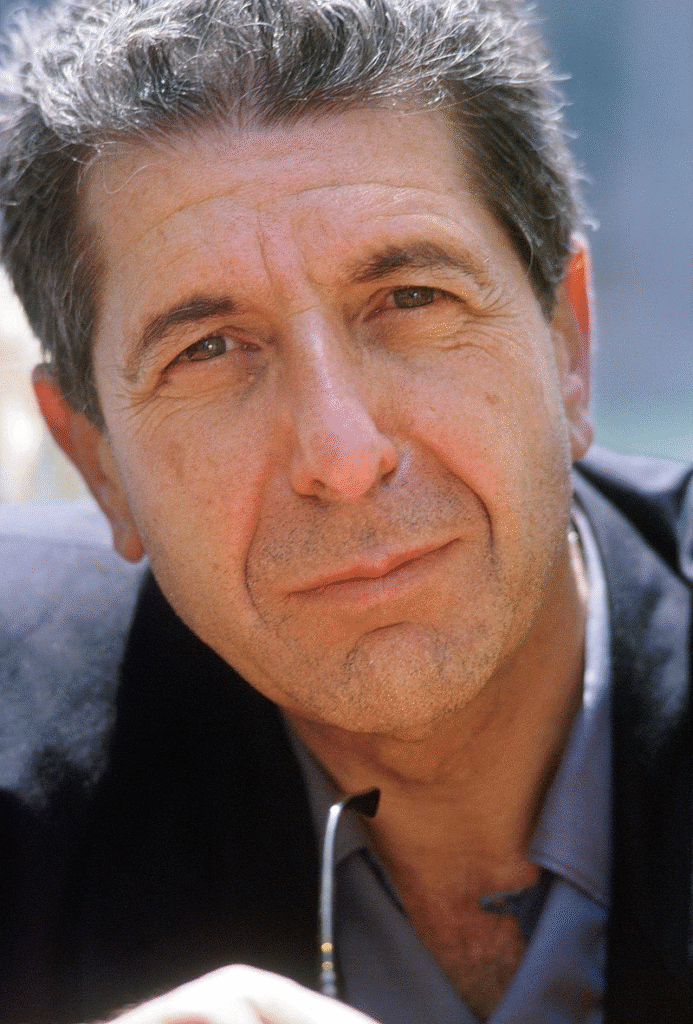
Above: Canadian musician/poet Leonard Cohen (1934 – 2016)
“Now in Vienna there’s ten pretty women.
There’s a shoulder where Death comes to cry.
There’s a lobby with nine hundred windows.
There’s a tree where the doves go to die.
There’s a piece that was torn from the morning,
And it hangs in the Gallery of Frost
Ay, Ay, Ay, Ay
Take this waltz, take this waltz
Take this waltz with the clamp on its jaws

Étienne is the first to break the silence.
“Do you ever wonder,“ he says, without looking up, “whether we come here to be inspired — or merely to postpone the realization that we may never be?“

Mireille does not answer immediately.
Her eyes are still on the phantom in the glass.
“Inspiration is not my fear,“ she says softly.
“My fear is that I have already been inspired — that I have seen what I am meant to do — and lacked the courage to do it.“
She touches the rim of her wine glass, tracing the condensation as though it might reveal a path.

Clara’s fingers twitch, as if pressing ghost-keys in the air.
“What if originality is not creation, but confession?“ she murmurs.
“Not something we make, but something we finally admit?“
Her voice wavers, not with emotion, but with restraint —
The restraint of a woman who fears that if she speaks honestly,
She will never be able to return to silence again.

Étienne closes his notebook.
He can feel the gaze of the unborn self in the fourth chair —
A gaze without eyes, without form,
Yet heavier than any stare he has ever endured.
“Cervantes does not haunt me,“ he says at last.
“The man who haunts me is the one who never wrote the book.“
He looks at the other two.
“The one who waits.
The one who believes the world owes him a revelation before he has earned it.“

Above: Miguel de Cervantes
Mireille inhales sharply,
As if stabbed by recognition.
“And if the ghosts we worship are only shadows cast by our own refusal to begin?“

Clara looks toward the fourth chair.
“Then this café is not a sanctuary,“ she whispers, “but a courtroom.“

And in that moment, no one can say whether they have come seeking absolution —
Or judgment.
They long to find their own voices, textures and melodies, but they fear that their admiration of figures of the past cast shadows over their hopes.
Clara’s gaze remains on the fourth chair.
“It isn’t only admiration,” she says.
Her voice, though quiet, holds the tremor of a truth finally risking birth.
“It’s devotion.
A kind of secret worship.
And what is worship, if not a confession that one does not believe oneself worthy of divinity?“
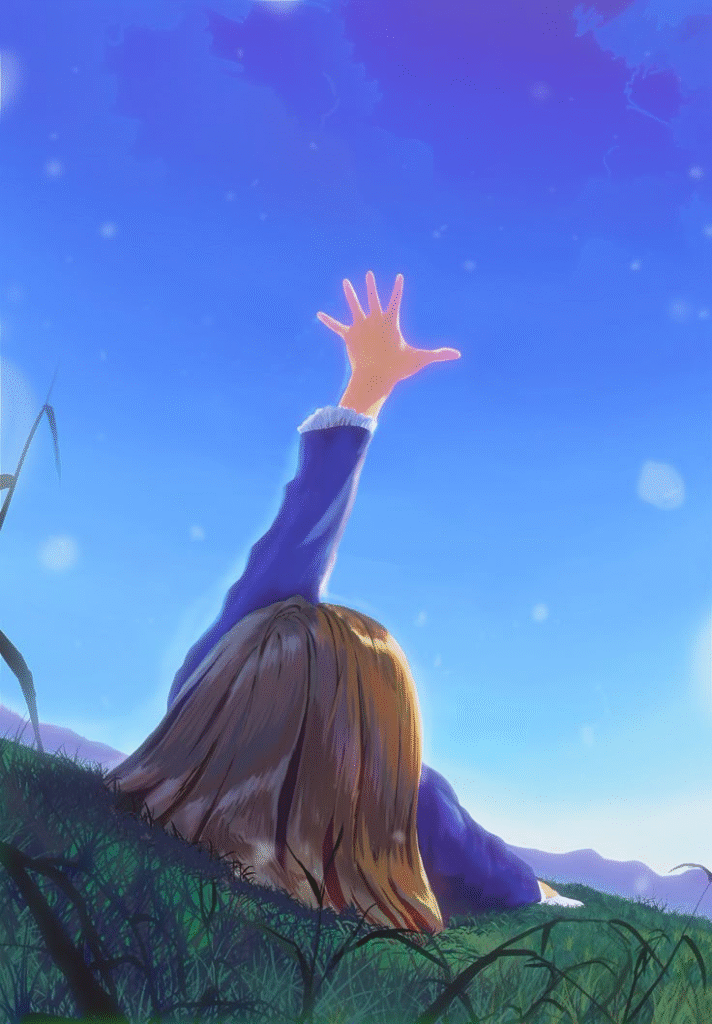
Mireille’s eyes shift from the glass to Étienne.
“I have lived more years as a witness than as a participant,” she said.
“I have painted what I thought art should be — not what I knew life to be.
But if I set aside Van Gogh, what remains?
What if when the shadow lifts — there is nothing of me beneath it?“

Above: Still life with open Bible, extinguished candle and novel, Vincent van Gogh (1885)
Étienne leans forwards, elbows on the table, his hands clasped as though in prayer — or surrender.
“We are terrified,” he says, “not that the dead will speak to us, but that they already have — and found us unworthy of reply.“
The fourth chair remains silent.
Not empty.
Silent.
For silence, in that café, is not absence —
It is judgment withheld.
Somewhere deep in the walls, a clock that has not ticked in decades seems to clear its throat.
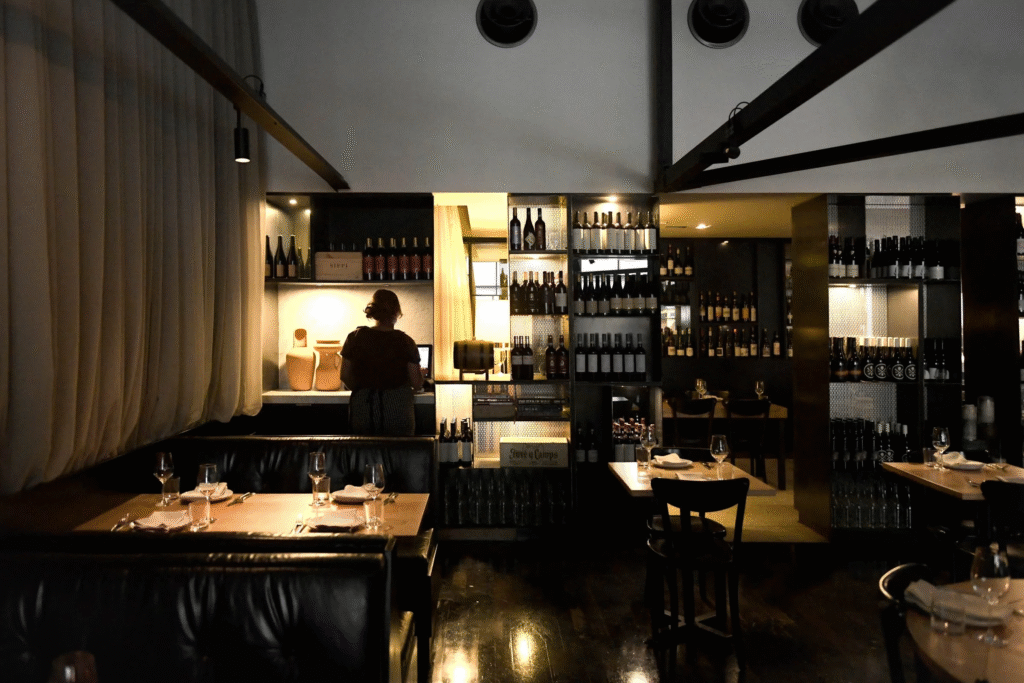
“What if peace,“ Clara whispers, “is not given to us by the dead — but demanded of us by the unborn?“
Étienne glances at her.
“And what if the price of that peace… is rebellion?“
As if in answer, the café door opens —
Not with the sound of hinges,
But with the hush of a breath drawn in.
The night itself steps into the room.

“Oh, I want you, I want you, I want you
On a chair with a dead magazine
In the cave at the tip of the lily
In some hallways where love’s never been
On a bed where the moon has been sweating
In a cry filled with footsteps and sand
Ay, Ay, Ay, Ay
Take this waltz, take this waltz
Take its broken waist in your hand
This waltz, this waltz, this waltz, this waltz
With its very own breath of brandy and Death
Dragging its tail in the sea.”
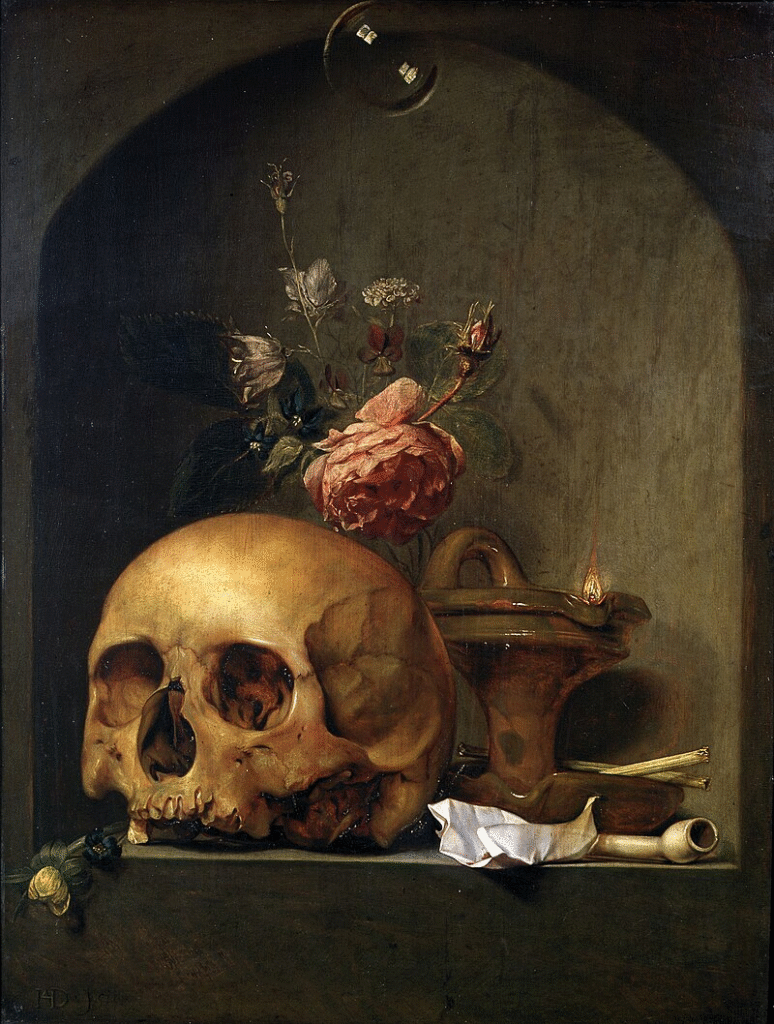
This Café de la Paix of memory and imagination is neither past nor present.
It exists in the liminal hour of longing where desire and fatigue fuse into vision.
These three creatives are not haunted yet, but they yearn to be.
In a world where inspiration feels silent, where they cannot hear the Muses that guided the geniuses of old.
They feel exiled from the great lineage of creation.
They believe that if only those Muses would speak to them – if only the spirits would come – they could unlock their innate greatness.
But herein lies the truth of the story:
The ghosts are already there.
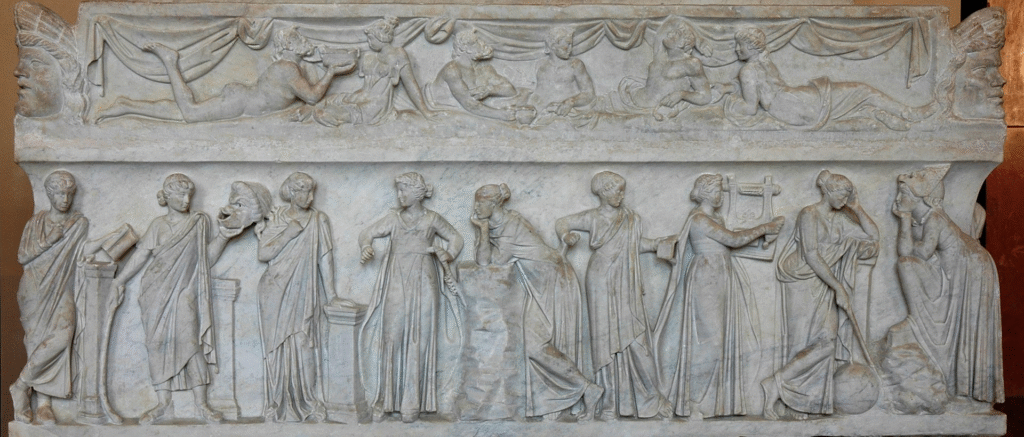
Above: The nine Muses
They do not appear as monochromes from Henri Matisse,

Above: French artist Henri Matisse (1869 – 1954)
Homilies from Ernest Hemingway,

Above: American writer Ernest Hemingway (1899 – 1961)
Or chords from Frederic Chopin.
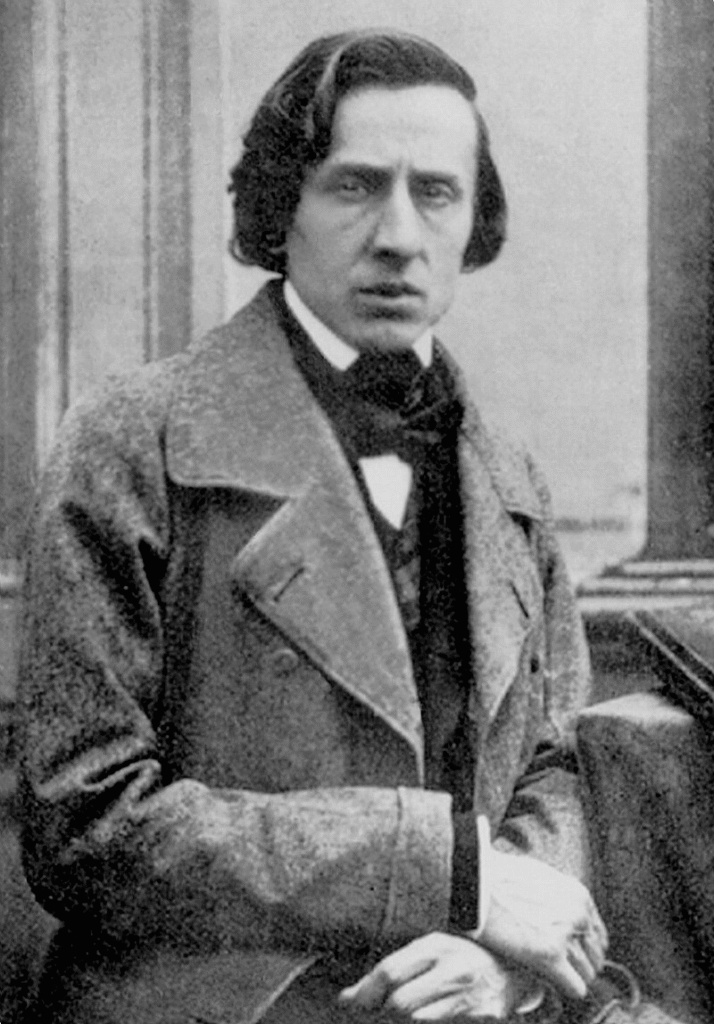
Above: Polish composer Frederic Chopin (1810 – 1849)
They appear through doubt,
Through longing,
Through yearning itself.
The haunting they want is already happening –
But they must realize it.

“There’s a concert hall in Vienna
Where your mouth had a thousand reviews
There’s a bar where the boys have stopped talking
They’ve been sentenced to death by the blues
Ah, but who is it climbs to your picture
With a garland of freshly cut tears?
Ay, Ay, Ay, Ay
Take this waltz, take this waltz
Take this waltz it’s been dying for years.”

Above: Vienna, Austria
The shadows along the walls tremble,
Not with wind,
But with expectation.
The fourth chair — still occupied by the unborn self — seems to inhale, pressing its presence into the space between them.

Above: Bedroom in Arles, Vincent van Gogh (1888)
Étienne feels the air thicken,
As though each word he might speak could shatter or summon something greater than himself.

Mireille reaches for her brush, then freezes, realizing the colors on her palette have become heavier, more urgent —
Pulsing with voices she can not name.
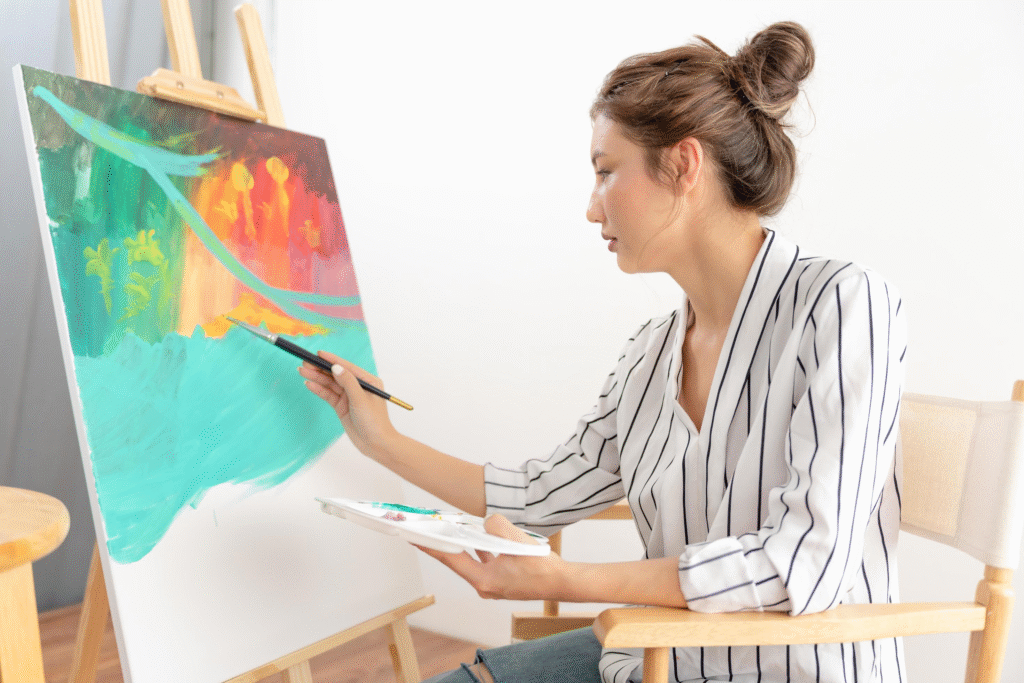
Clara’s hands hovers above the table, fingers trembling as if the piano she imagines could finally sound a chord meant only for them three —
And yet, also for the silent judge at their side.
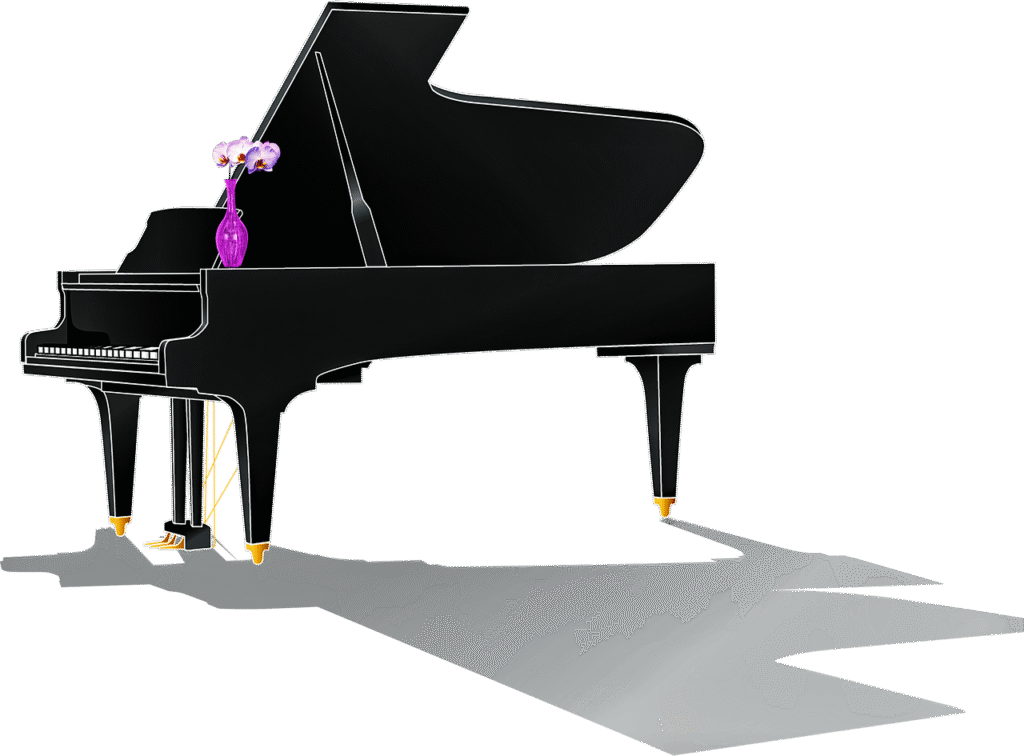
A whisper, almost imperceptible, drifts from the walls:
“Begin.“
Not a command,
But a question.
The Café waits.
Not for ghosts.
Not for muses.
For action.
For the living to dare to confront the selves they have long denied.
And in that moment, the trio realizes —
They have not come here to be haunted.
They have come to begin.

“There’s an attic where children are playing
Where I’ve got to lie down with you soon
In a dream of Hungarian lanterns
In the mist of some sweet afternoon
And I’ll see what you’ve chained to your sorrow
All your sheep and your lilies of snow
Ay, Ay, Ay, Ay
Take this waltz, take this waltz
With its “I’ll never forget you, you know!”“

The Café de la Paix is a place out of time –
Like the taverns of Maeterlinck or the cafés of Pessoa,
Where the veil between worlds is thin,
Not because ghosts cross over,
But because the soul leans backward into Eternity.

The Café in daytime is soft amber light, newspapers, steam and the slight sorrow of rain.
The Café at night is candlelight trembling in the reflection of glasses of red red wine, ashtrays of deadened cigarettes, a saxophone solo aching like bittersweet memory.
It is never crowded.
It is never empty.

“This waltz, this waltz, this waltz, this waltz …
And I’ll dance with you in Vienna
I’ll be wearing a river’s disguise
The hyacinth wild on my shoulder,
My mouth on the dew of your thighs
And I’ll bury my soul in a scrapbook,
With the photographs there, and the moss
And I’ll yield to the flood of your beauty
My cheap violin and my cross
And you’ll carry me down on your dancing
To the pools that you lift on your wrist
Oh my love, Oh my love
Take this waltz, take this waltz
It’s yours now. It’s all that there is.“
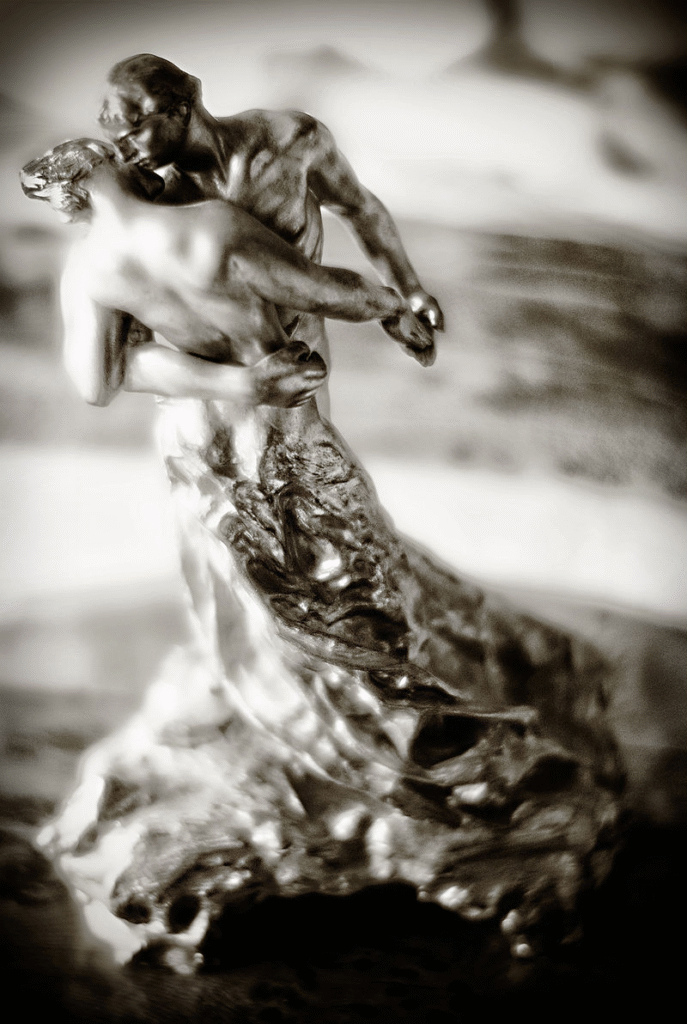
Above: The Waltz, Camille Claudel (1905)
It is the House of the Rising Sun.
“There is a house in New Orleans
They call the Rising Sun
And it’s been the ruin of many a poor boy
Dear God, I know I was one.“

It is the Sad Café.
“Out in the shiny night, the rain was softly falling
Tracks that ran down the boulevard had all been washed away
Out of the silver light, the past came softly calling
And I remember the times we spent inside the Sad Café
Oh, it seemed like a holy place, protected by amazing grace
And we would sing right out loud, the things we could not say
We thought we could change this world with words like love and freedom
We were part of the lonely crowd inside the Sad Café
Oh, expecting to fly
We would meet on that beautiful shore in the sweet by and by
Some of their dreams came true, some just passed away
And some of them stayed behind, inside the Sad Café.“
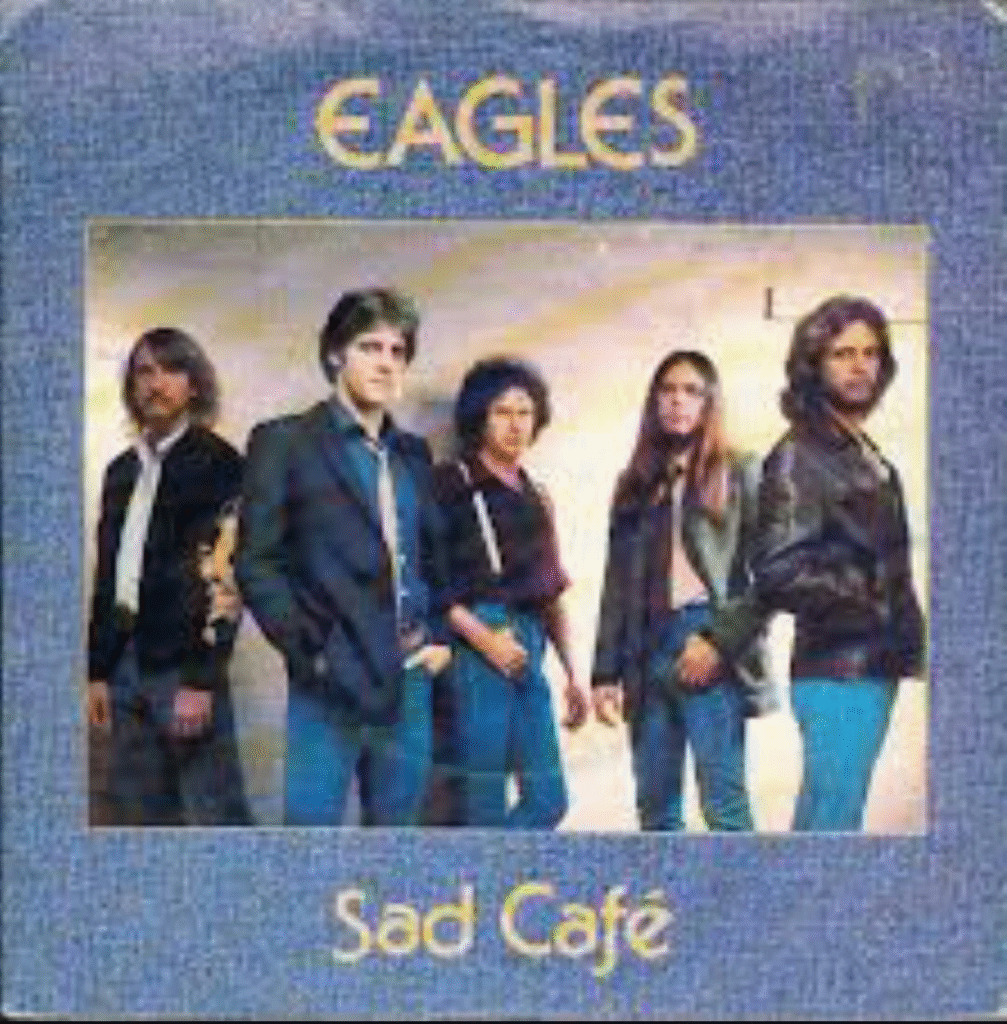
It is Heartbreak Hotel.
“Well, since my baby left me
I found a new place to dwell
It’s down at the end of Lonely Street
At Heartbreak Hotel.”

It is the Hotel California.
“Welcome to the Hotel California.
Such a lovely place (such a lovely place).
Such a lovely face.
They’re livin’ it up at the Hotel California.
What a nice surprise (what a nice surprise)
Bring your alibis.
Mirrors on the ceiling, the pink champagne on ice
And she said, “We are all just prisoners here of our own device”
And in the Master’s Chambers, they gathered for the feast.
They stab it with their steely knives, but they just can’t kill the beast.
Last thing I remember, I was running for the door.
I had to find the passage back to the place I was before.
“Relax,” said the night man, “We are programmed to receive
You can check out any time you like, but you can never leave.””

The Café regulars are characters straight out of an unwritten novel.
“Just like an old time movie
‘Bout a ghost from a wishin’ well
In a castle dark or a fortress strong….
You know that ghost is me
And I will never be set free
As long as I’m a ghost, you can’t see.
Just like a paperback novel,
The kind the drugstore sells.
When you reach the part where the heartaches come….
You won’t read that book again
Because the ending’s just too hard to take….
I never thought I could feel this way
And I’ve got to say that I just don’t get it.
I don’t know where we went wrong,
But the feeling’s gone and I just can’t get it back.“

The trio always meet at the same battered table by the window.
Étienne struggles to write that first novel.
He is haunted not by spirits but by deafening silence.
He believes that if Cervantes would only visit him in a dream or apparition, he would finally understand his purpose.
He confuses authentic inspiration with divine intervention.
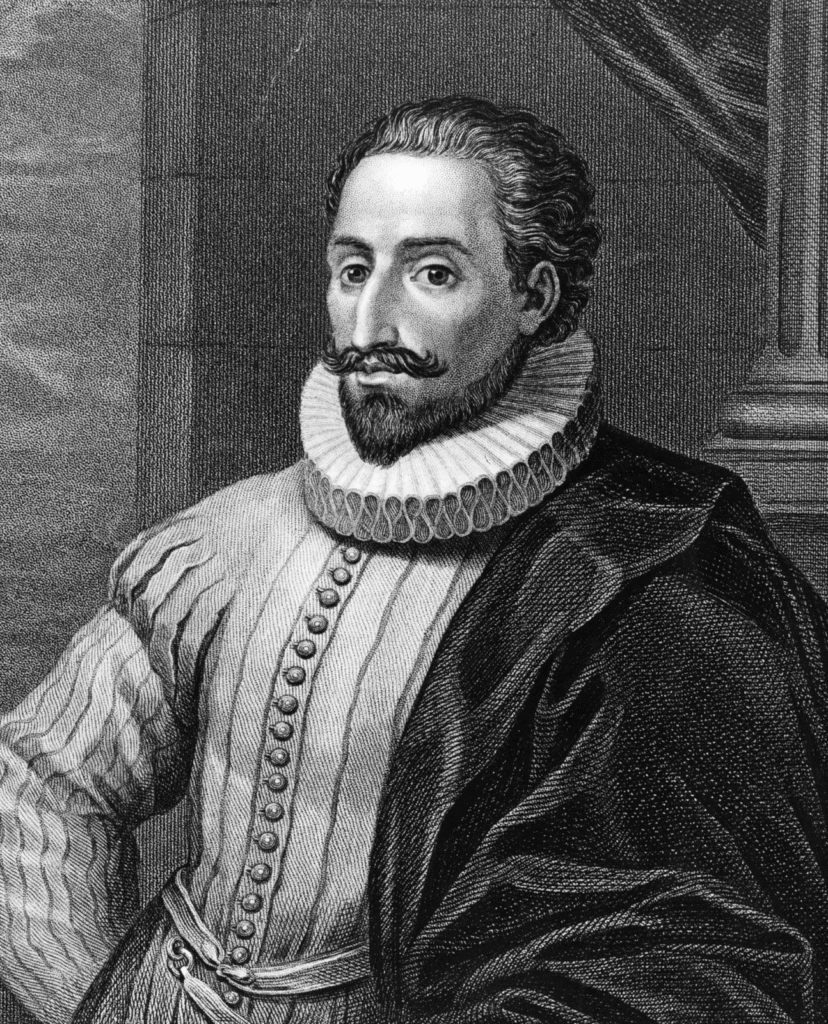
Above: Miguel de Cervantes
“Stay on the streets of this town,
And they’ll be carving you up, all right.
They say you gotta stay hungry.
Hey, baby, I’m just about starving tonight.
I’m dying for some action.
I’m sick of sitting ’round here trying to write this book.
I need a love reaction.
Come on now, baby, gimme just one look.“

Mireille paints in explosive colour but feels her work is derivative.
She gazes at reproductions of Gauguin and Van Gogh, wondering if madness is the price of true originality.
She wants courage to bleed truth onto her canvas.
She fears becoming a pale echo.
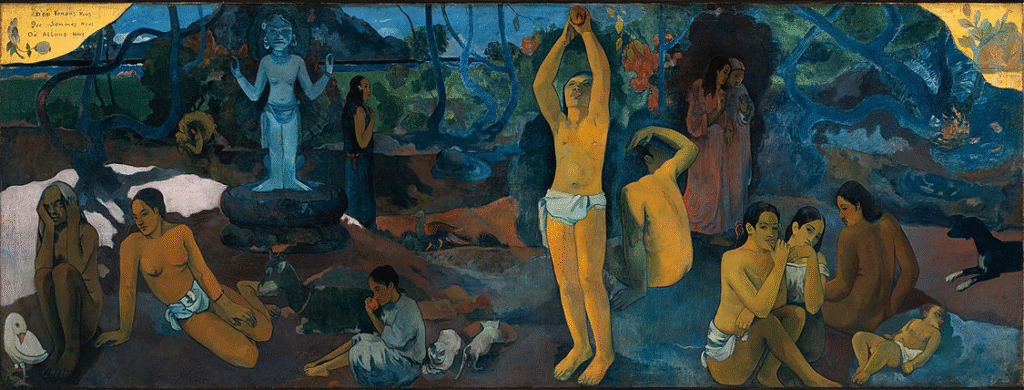
Above: Where Do We Come From? What Are We? Where Are We Going?, Paul Gauguin (1897)
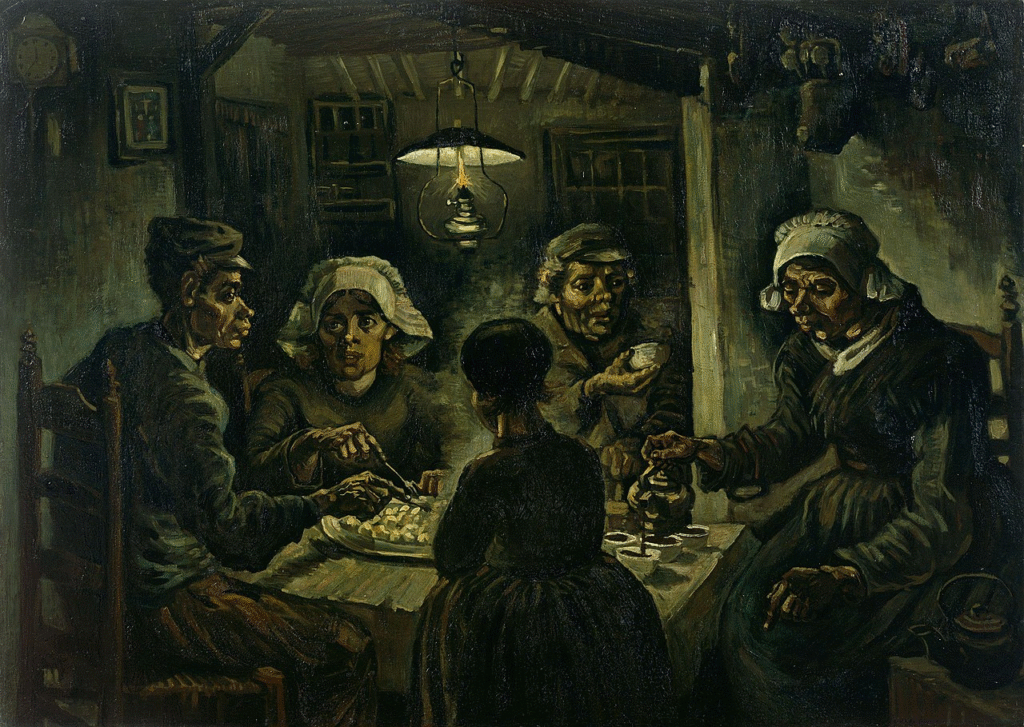
Above: The potato eaters, Vincent van Gogh (1885)
“You with the sad eyes,
Don’t be discouraged.
Oh, I realize,
It’s hard to take courage.
In a world full of people
You can lose sight of it all
And the darkness inside you
Can make you feel so small.
But I see your true colors
Shining through.
I see your true colors
And that’s why I love you.
So, don’t be afraid to let them show:
Your true colors.
True colors, are beautiful
Like a rainbow.“

Clara is a pianist, a composer, at least that is what she tells others, that is what she tells herself.
She desires Beethoven’s defiance against fate and Mozart’s passion, but she hears no music in her sleep.
She is terrified of being merely talented rather than called.

Mireille is her lover.
Together, they form a passionate and tortured creative bond.
Between the three is friendship, unspoken love, jealousy, reverence and a collective yearning for ghosts they are not sure even exist.
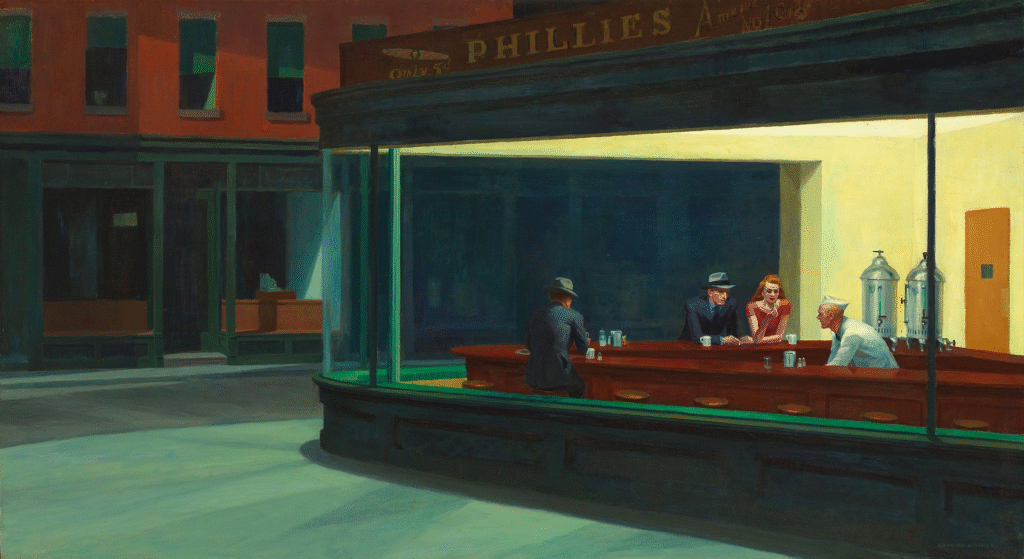
Above: Nighthawks, Edward Hopper (1942)
“I’m a ghost
Living in a ghost town
I’m a ghost
Living in a ghost town
You can look for me
But I can’t be found
You can search for me
I had to go underground
Life was so beautiful
Then we all got locked down
Feel like a ghost
Living in a ghost town.”

Étienne’s fingers traces the rim of his coffee cup, as though mapping the contours of a self he has yet to meet.
Mireille’s brush trembles in her grasp, as if the weight of unseen eyes presses upon it.
Clara exhales softly, the silence between them thick, almost musical — a fugue of possibility.
The fourth chair shifts slightly, not with motion, but with presence.
Each of them feel it not as threat, but as mirror:
The self they have neglected, postponed or denied.
And then Étienne speaks, voice low:
“If we do not begin, they will leave us unfinished.“
Mireille’s eyes find his, bright with unshed tears:
“And if we fail?“
“Then we fail alive,” Étienne says.
“But at least we fail awake.“
The Café leans in, listening.
Waiting.
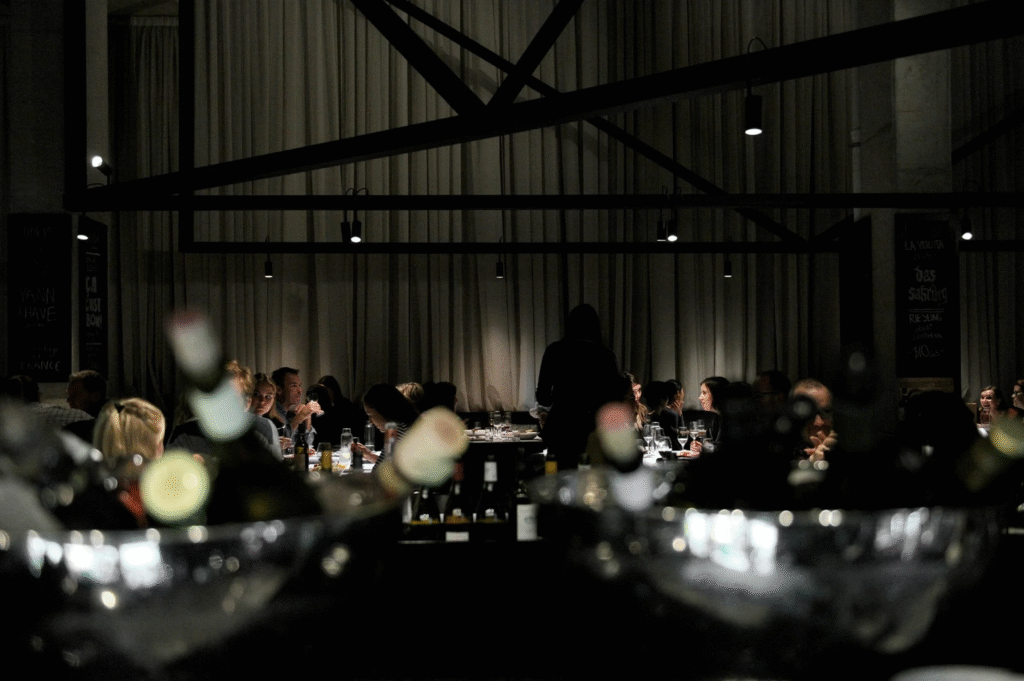
There are places not defined by geography, but by a state of soul.
Taverns and cafés act as thresholds –
Between waking and dreaming,
Art and life,
Mortality and transcendence.
The lamplight pools like warm honey over the worn wood, catching the dust motes that drift like tiny dancers in the air.
Shadows stretch along the walls,
Not threatening,
But expectant,
As if time itself pauses to witness.
Each table hums faintly with the residue of dreams — a lover’s confession, a writer’s first sentence, a painter’s daring stroke — though all long abandoned by their makers.
Here, a sigh becomes a note of music;
A hesitation becomes a line of poetry.
The trio feel the Café breathe with them.
Every corner invites them to step across unseen thresholds:
The one between thought and action, fear and courage, who they are and who they might yet become.
The fourth chair — silent, impossible, alive — is no longer merely a mirror.
It is a summons.
A question without words:
Will you answer?

I think of Maurice Maeterlinck, a Belgian who believed that the real drama of life is invisible –
Not in physical action,
But in the silent forces surrounding us:
Fate, death, memory, destiny.
His taverns are not boisterous inns, but mystical spaces where time stands still.
Characters enter a tavern that seems ordinary,
But they soon sense they are suspended between life and death.
The tavern is not a destination.
It is a waiting room for revelation.
People go there without knowing why, then find themselves listening to some invisible presence.
Nothing dramatic happens, yet everything is charged with impending revelation.
Silence is its own character.
Maeterlinck uses spaces to suggest that inspiration, truth, death are already in the room –
But humans are too noisy, too distracted, to hear.

Above: Belgian writer Maurice Maeterlinck (1862 – 1949)
Inside the Café de la Paix, ghostly presences of artistic genius are felt, not seen.
Silence speaks louder than words.
The fourth chair shifts again, imperceptibly,
A suggestion more than a movement.

Étienne feels it first —
A quiet pressure at the base of his skull,
The soft insistence of a voice he does not hear, but knows.
His fingers itch to take up the pen,
To chase the sentence that has been circling,
Teasing him for weeks.

Mireille’s brush trembles in her grasp, then lifts as if by its own volition.
Colors she has long avoided — vermilion, cobalt, emerald — seem to pulse beneath the bristles.
Each stroke on the canvas whispers a truth she has been too afraid to paint:
That her life and her art are inseparable,
And that only courage could make them real.

Clara inhales sharply,
Her hands hovering above the imagined keys.
Then, in a gesture so slight it might have been imagined, her fingers strike an invisible chord.
The room responds.
The silence of the Café thickens, and in it, a harmony forms —
Delicate, trembling, insisting.
She feels a rhythm she has not yet claimed,
A melody that belongs to no one but herself.
The unborn selves leans in with them,
Not as guides,
Not as judges,
But as catalysts.
They do not speak,
But the energy they carry reverberates in the air,
Through the table,
Into the artists’ veins.
Each heartbeat becomes a drum.
Each breath,
A measure of music,
Each glance,
A stanza of narrative.

The Café whispers again, faintly,
Like wind through the cracks of the windows:
Begin.
And they do.

Étienne’s pen finds its path,
Dancing across the page with a daring that startles him.
Words he has hoarded for months pour out,
Raw, jagged, truthful.

Mireille’s brush follows,
Leaving trails of color that seem to glow from within,
The canvas alive in a way that terrifies and exhilarates her.
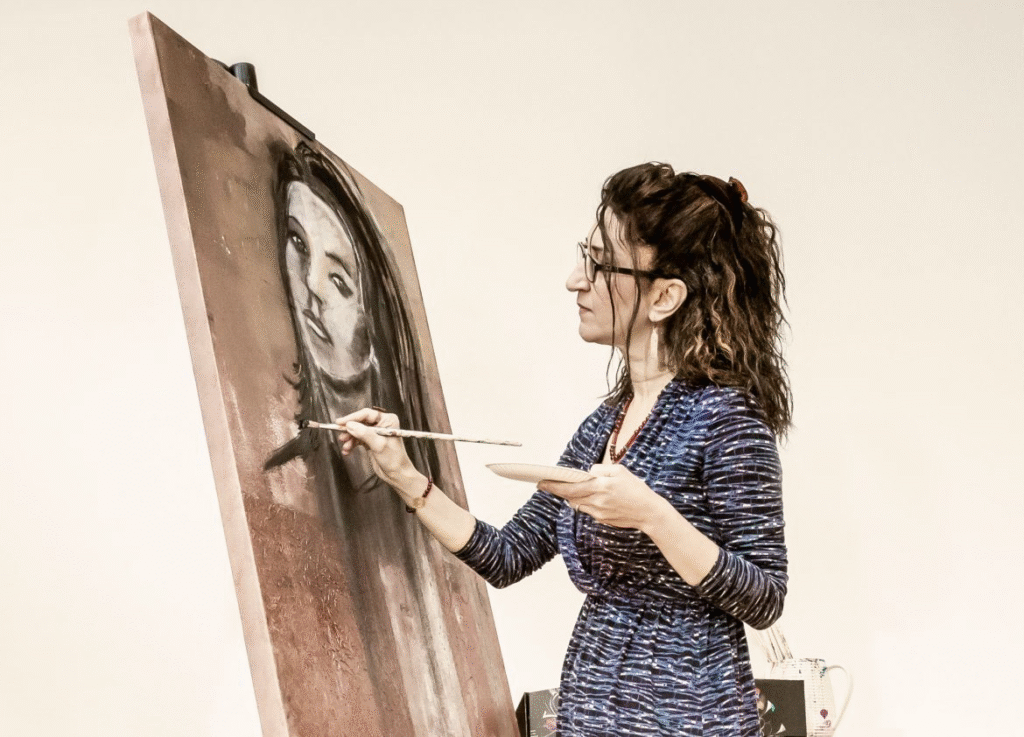
Clara’s hands finally fall upon an imaginary keyboard,
Now imagined no longer.
Music fills the room —
Not from strings or keys,
But from the collision of will and intention,
Soundless yet unmistakable,
A fugue made visible in the air around them.
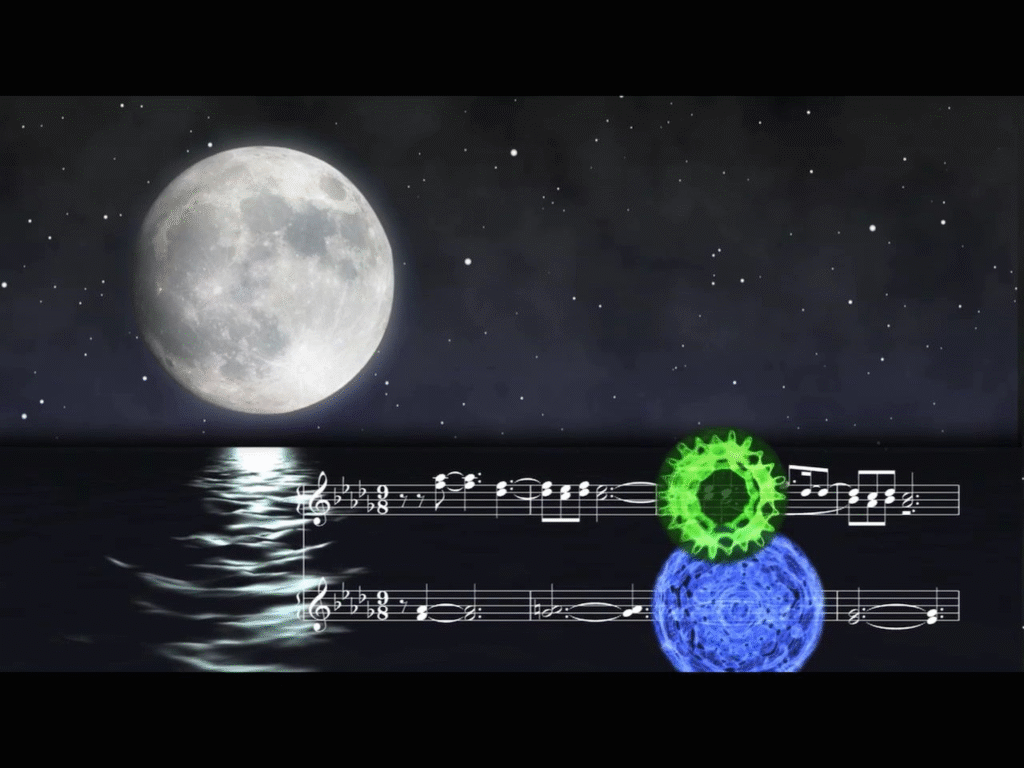
For the first time, they understand:
The Café has never been a place to summon the dead.
It has been a place to awaken themselves.
The fourth chair remains,
Silent, patient, unyielding.
A presence that will follow them always,
Yet only as long as they dare to continue.
And in that liminal glow,
Between candlelight and memory,
Between fear and desire,
The three creatives begin —
Fully, irrevocably, alive.
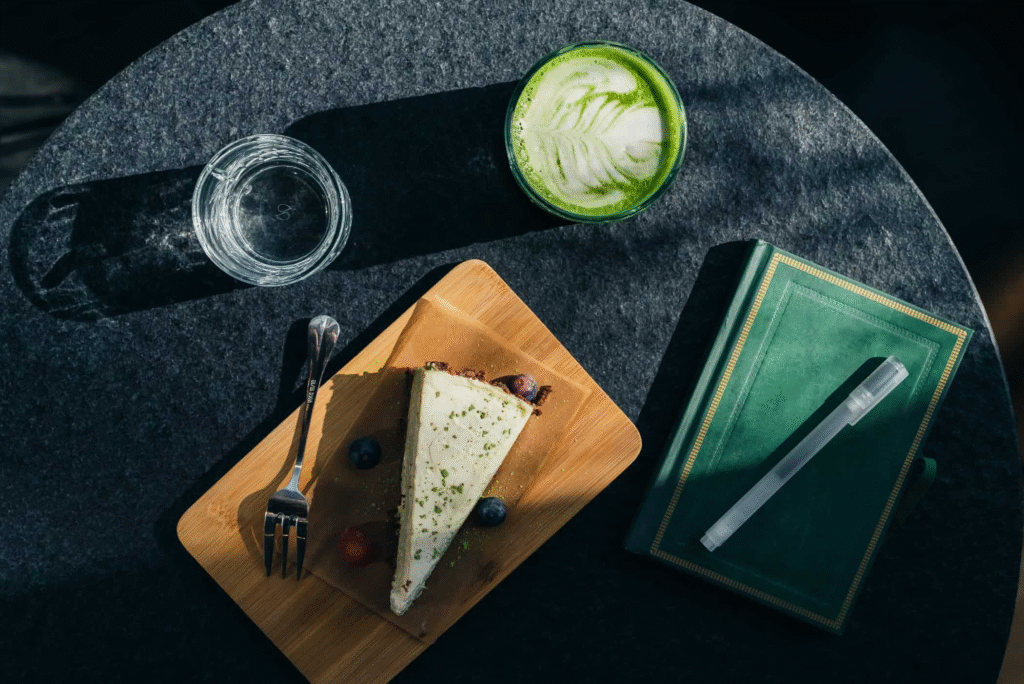
“Starry, starry night
Paint your palette blue and gray
Look out on a summer’s day
With eyes that know the darkness in my soul

Above: Portrait of Vincent van Gogh, Paul Gauguin (1888)
Shadows on the hills
Sketch the trees and the daffodils
Catch the breeze and the winter chills
In colors on the snowy linen land
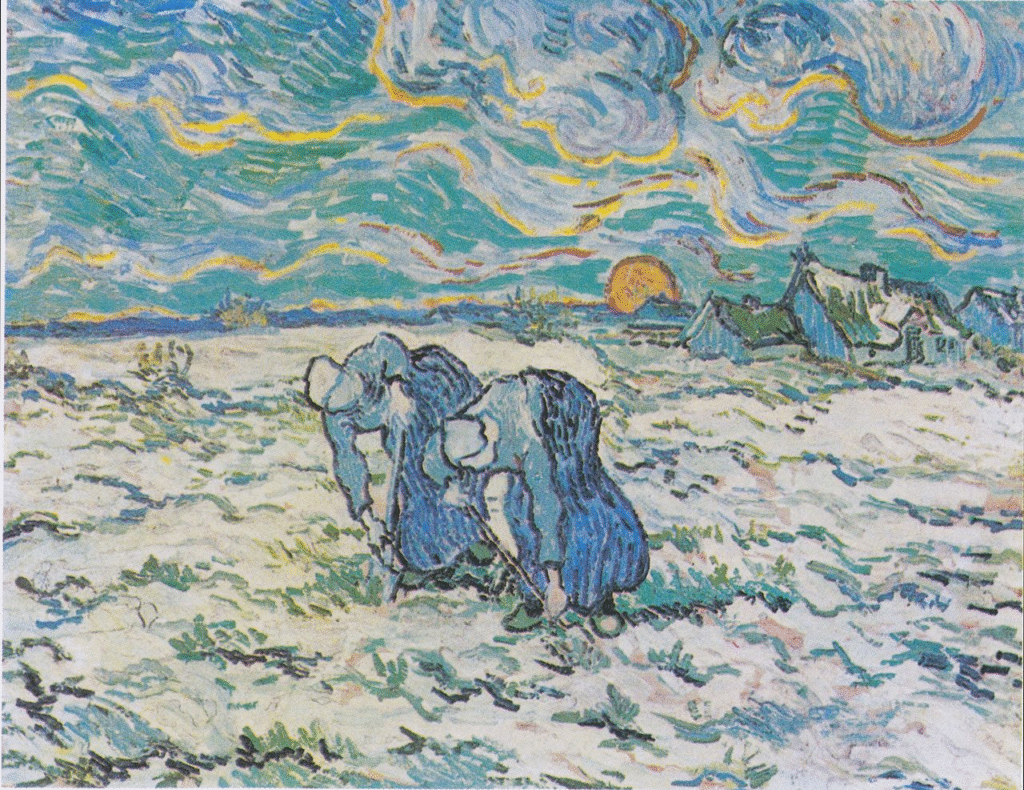
Above: Two peasant women digging in a snow-covered field at sunset, Vincent van Gogh (1890)
Now I understand
What you tried to say to me
And how you suffered for your sanity
And how you tried to set them free
They would not listen, they did not know how
Perhaps they’ll listen now.“

Above: Starry night, Vincent van Gogh (1889)
Fernando Pessoa practically lives in cafés.
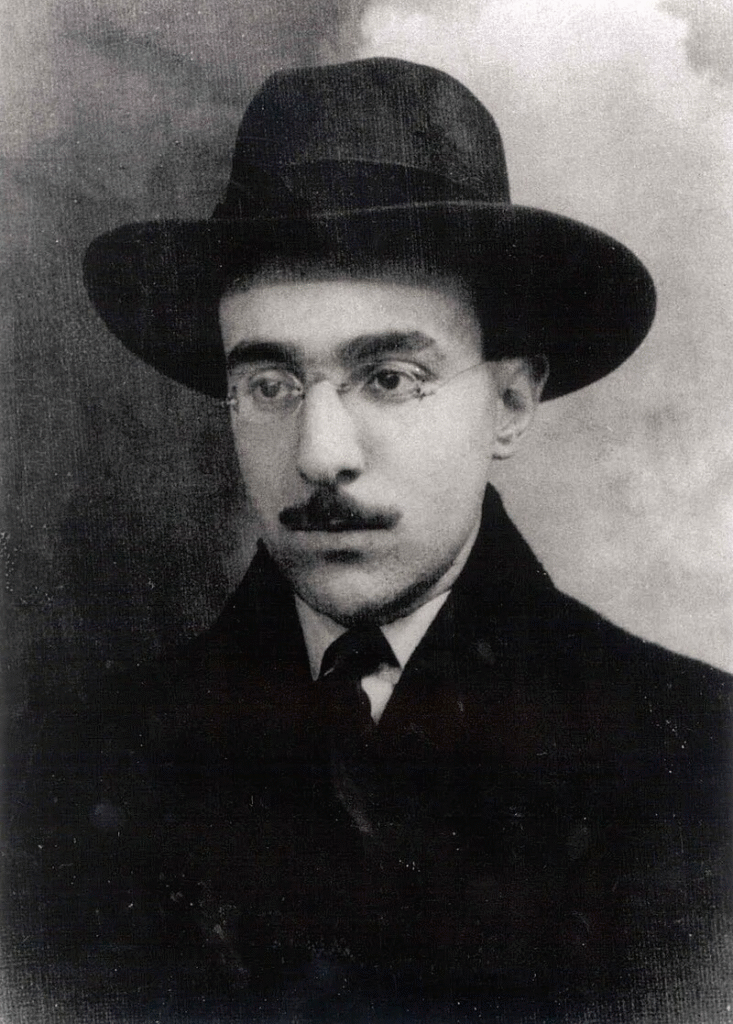
Above: Portuguese poet Fernando Pessoa (1888 – 1935)
They are his sanctuaries,
Laboratories of the soul,
Portals into his many literary identities.
Each table of a Pessoan café seems to host a different Pessoa –
The melancholic,
The futurist,
The disillusioned.

Above: Street scene, Lisbon, Portugal
You do not go to a café to drink.
You go there to witness your soul experiencing the world.
The people one sees may be real or projections of one’s dreams, regrets or alternate selves.

Above: The Night Café, Vincent van Gogh (1888)
In Pessoa’s Livro do Desassossego (The Book of Disquiet)(1982), the narrator is a solıtary clerk in Lisboa (Lisbon) who spends most of his time in a café, experiencing his life as if it were a dream he is merely watching.
The café is an inner temple – a place where nothing happens yet everything is felt.
“The café is my retreat, my cloister, my parish.
It is here that I experience the sacred ceremony of my own thought.“
Pessoa writes of seeing lifetimes pass by in the reflection of a spoon or feeling the ghost of a medieval poet sit down at his table.
His cafés are intellectual séances –
Where ghosts do not appear,
But where one’s self multiplies.
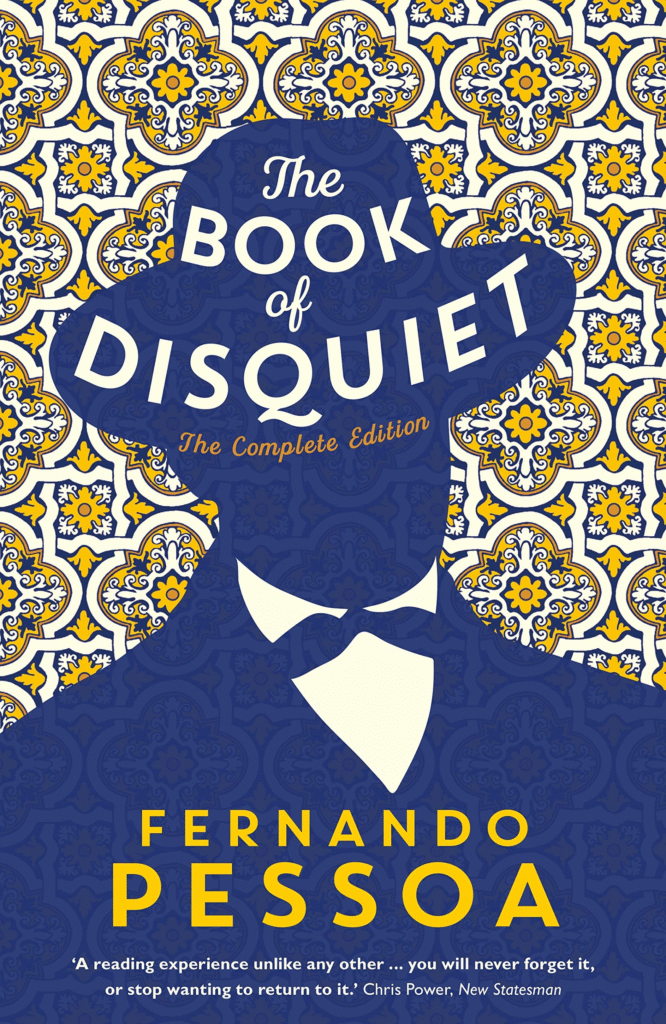
“Starry, starry night
Flaming flowers that brightly blaze
Swirling clouds in violet haze
Reflect in Vincent’s eyes of China blue.
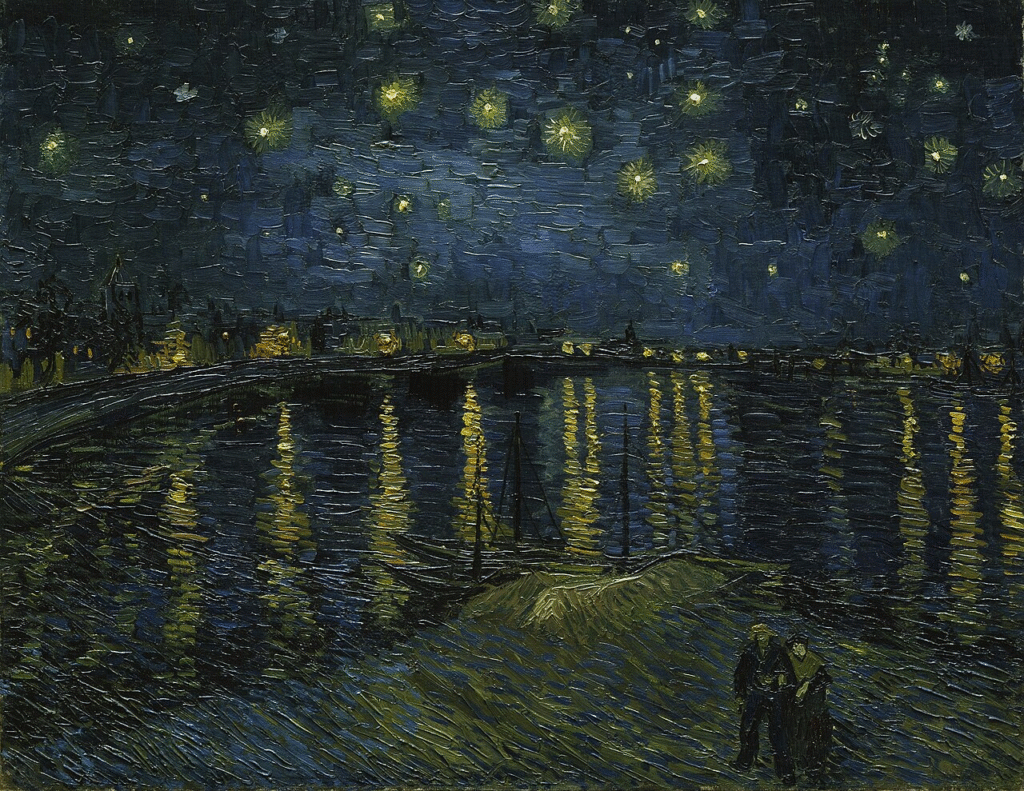
Above: Starry night over the Rhône, Vincent van Gogh (1888)
Colors changing hue
Morning fields of amber grain
Weathered faces lined in pain
Are soothed beneath the artist’s loving hand.

Above: The sower, Vincent van Gogh (1888)
Now I understand
What you tried to say to me
And how you suffered for your sanity
And how you tried to set them free.
They would not listen. They did not know how.
Perhaps they’ll listen now.“

Above: Fishing boats on the beach at Saintes Maries, Vincent van Gogh (1888)
In the Café de la Paix, the trio senses this same multiplicity.
Each table seems to hold not only the patrons,
But also countless versions of themselves —
Alternate choices,
Deferred dreams,
The selves they might have been….
Had fear, hesitation or distraction not prevailed.

Above: Café terrace at night, Vincent van Gogh (1888)
Étienne imagines dozens of manuscripts,
Each reflecting a different path,
Each authored by an unspoken self who had dared to write.

Mireille sees a spectrum of paintings across the walls,
Invisible yet radiant,
Each hue a testament to courage unclaimed.
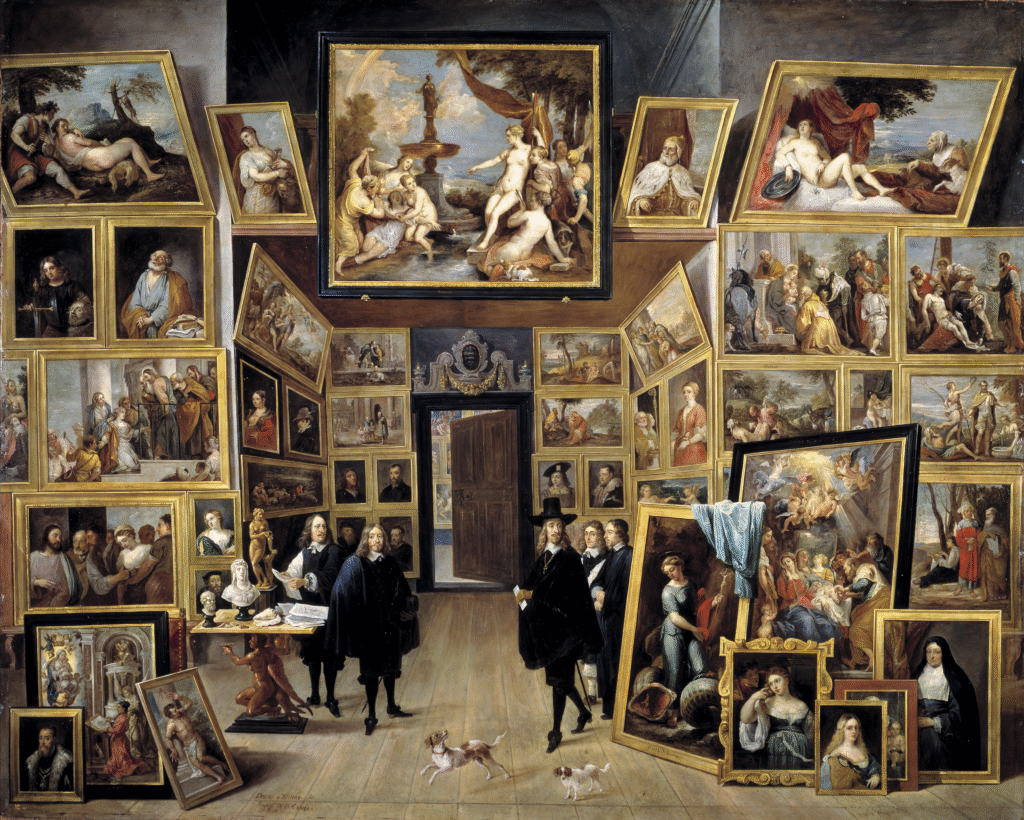
Clara feels countless melodies vibrating around her,
Half-formed, shimmering, waiting for her to claim them.
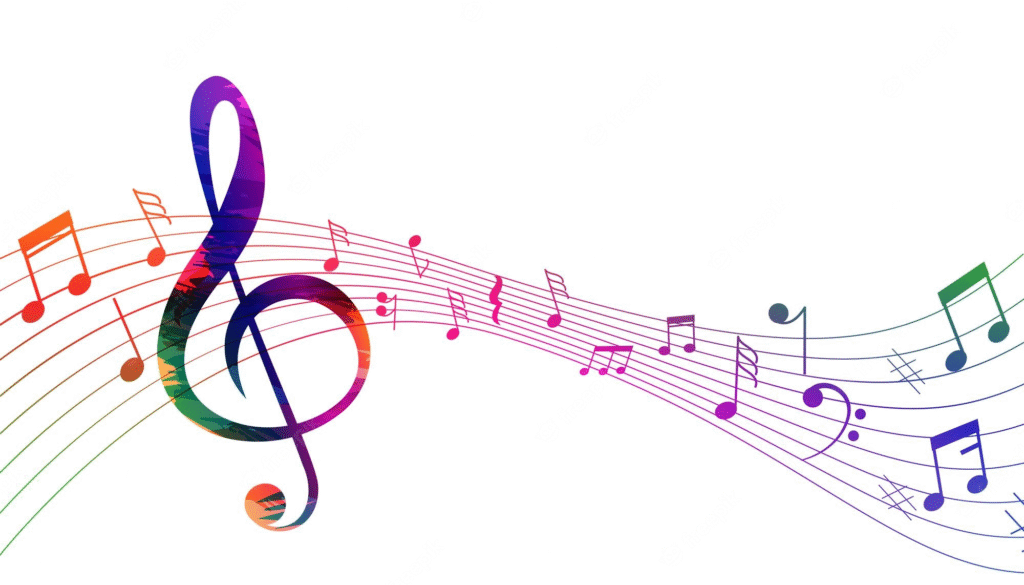
The Café does not demand they be perfect nor does it judge their failures.
It demands only attention.
To sit.
To notice.
To act.
And in that noticing, the unborn selves lean closer.
Not as critics, but as partners in creation.
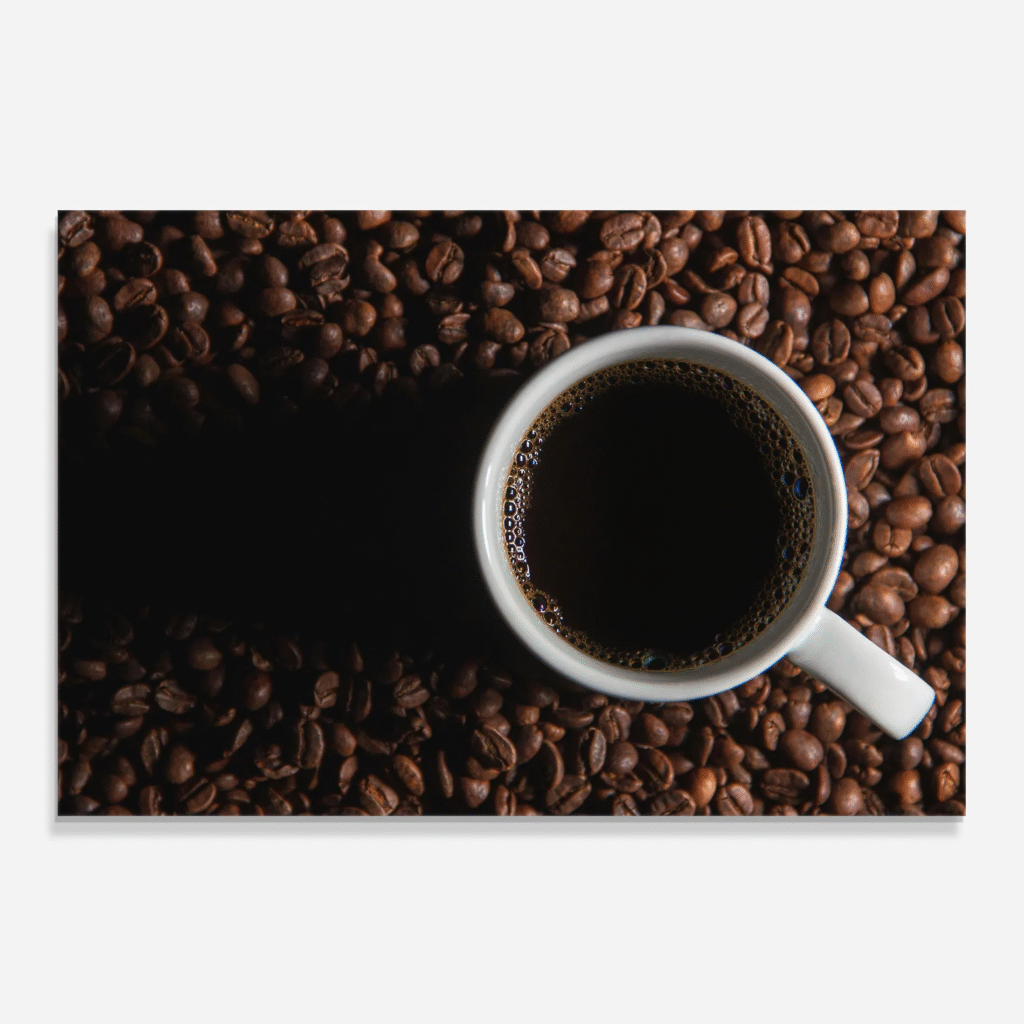
Pessoa’s voice, imagined, whispered through the amber glow of lamplight:
“The self is a café of mirrors — each reflection drinking a different cup of destiny.
Observe them.
Converse.
Argue.
And then, if you dare, choose the self you wish to feed.“
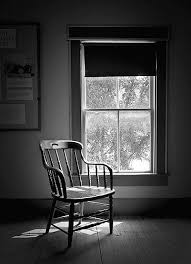
The trio exchange glances, recognition flickering like candle flames.
They have not come to be haunted.
They have come to meet themselves —
Fully, unflinchingly, without apology.
And in that moment, the Café of memory and imagination becomes more than a threshold.
It becomes a crucible.
Where fear is transmuted into creation.
Where silence is not emptiness but the pulse of possibility.
Where the unborn selves, always patient, finally find interlocutors worthy of dialogue.
The Café de la Paix waits, as always,
But now the three are ready to speak.

“For they could not love you
But still, your love was true
And when no hope was left in sight on that starry, starry night
You took your life, as lovers often do
But I could have told you, Vincent
This world was never meant for one as beautiful as you.“

Above: Memory of the Garden of Eden, Vincent van Gogh (1888)
The Café de la Paix is a place where inspiration is neither summoned nor discovered, but awakened.
Inside the café sits Italo Svevo, an Italian novelist from Trieste (the city a liminal port between empires and identities – Austrian and Italian, Jewish and Catholic, Mediterranean and Mitteleuropa).
Svevo, like Pessoa, lives here.

Above: Italian writer Italo Svevo (1861 – 1928)
Here where self-doubt is a permanent state,
Procrastination is a philosophical stance,
Where the desire to improve oneself is perpetually thwarted by one’s own psychology,
Haunted not by great figures,
But by one’s own unfinished self.
Svevo does not summon ghosts of dead masters.
Rather he is haunted by the ghost of the man he might have been.
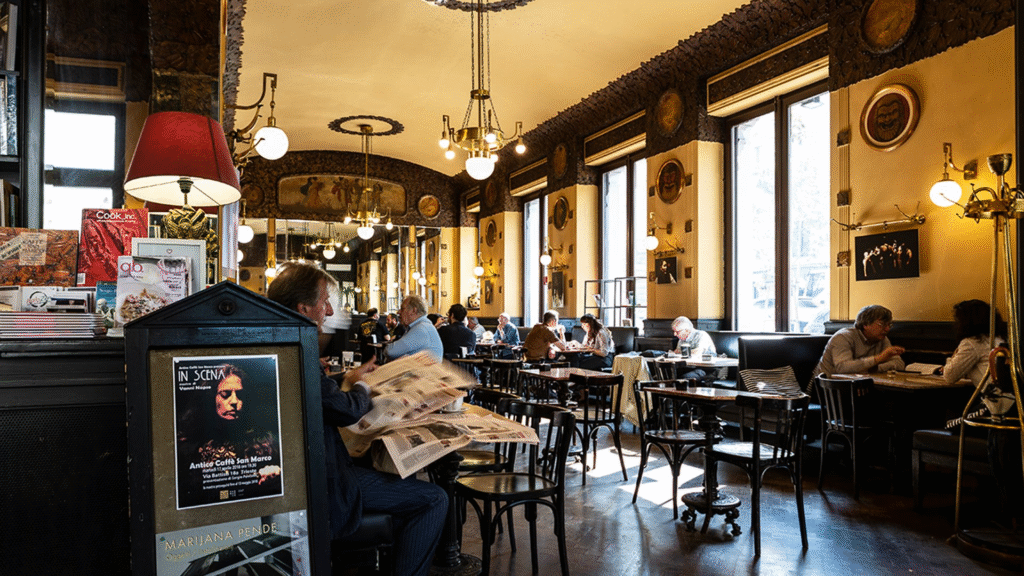
Above: Café scene, Trieste, Italy
Svevo’s La Coscienza di Zeno (The Confessions of Zeno)(1923) is the fictional memoir of Zeno Cosini, a man trying to cure his neuroses through psychoanalysis.
This is a tale tragic and comic,
Conveyed in a tone that is self-deprecating,
Lucid and agonizingly human.
Zeno is always quitting smoking,
But never quite quits.
Always about to become a better man,
But never changes.
He blames his failures on fate,
While secretly suspecting it is all his own fault.
He reflects constantly.
His life is a dialogue between the present self and the ghost of his past selves.

“Starry, starry night
Portraits hung in empty halls
Frameless heads on nameless walls
With eyes that watch the world and can’t forget
Like the strangers that you’ve met
The ragged men in ragged clothes
The silver thorn, a bloody rose
Lie crushed and broken on the virgin snow
Now I think I know
What you tried to say to me
And how you suffered for your sanity
And how you tried to set them free
They would not listen, they’re not listening still
Perhaps they never will.“

Above: Self-portrait with grey felt hat, Vincent van Gogh (1888)
Étienne watches Svevo from across the room.
Not as a figure to emulate, but as a mirror of possibility unclaimed.
Svevo’s presence is quiet, almost imperceptible —
The weight of a life perpetually postponed,
The energy of ambition deferred yet never extinguished.
He does not give answers.
He offers instead a model of vigilance:
To notice one’s own hesitation,
To confront it without flinching,
To recognize that procrastination is also a dialogue —
A conversation between who we are and who we refuse to become.

Above: Italo Svevo
Mireille’s gaze follows Svevo’s gestures, slight and deliberate.
She feels her own fear mirrored there:
The fear of beginning,
Of painting a truth that might shame her into stillness.

Above: Road with Cypress and Star, Vincent van Gogh (1890)
Clara, sensing the echoes of Svevo’s unfinished symphonies, allows her hands to float again above the phantom keys.

The piano, the brush, the pen —
They are instruments of self-confrontation,
Not merely creation.
Svevo, like Pessoa, does not speak aloud,
Yet the room resonates with his lesson:
“The ghosts you seek are not outside you.
They are the selves you have left waiting in the shadows.
Attend to them, or they will attend to you in silence.“

Above: The writer with his wife Livia and daughter Letizia
The trio absorbs this quietly,
Letting it settle around them,
Thick as incense and expectation.

And then, as if answering without speaking, the fourth chair — their unborn selves — leans forward again, reminding them that the Café de la Paix is not a place to worship genius nor to fear it.
It is a place to confront it within themselves.
Here, creativity is less a gift than a summons:
To notice,
To act,
To live deliberately,
In the gap between who they are and who they might yet become.
The Café holds its breath.
And the trio — pen, brush, and imagined keys poised — begin once more.

That’s life (that’s life).
That’s what all the people say.
You’re riding high in April, shot down in May.
But I know I’m gonna change that tune
When I’m back on top, back on top in June.
I said that’s life (that’s life).
And as funny as it may seem,
Some people get their kicks
Stomping on a dream.
But I don’t let it, let it get me down,
‘Cause this fine old world, it keeps spinnin’ around.
I’ve been a puppet, a pauper, a pirate, a poet,
A pawn and a king.
I’ve been up and down and over and out
And I know one thing.
Each time I find myself
Flat on my face,
I pick myself up and get
Back in the race.
That’s life (that’s life).
I tell you, I can’t deny it.
I thought of quitting, baby,
But my heart just ain’t gonna buy it.
And if I didn’t think it was worth one single try,
I’d jump right on a big bird and then I’d fly.

Here in the Café de la Paix, one does not see Cervantes nor Van Gogh nor Beethoven,
But instead one feels the Unwritten Self who each artist could become,
If only they found their true voice.
Our characters at the Café de la Paix are not merely longing for ghosts.
They are longing to argue with them, question them, challenge them.
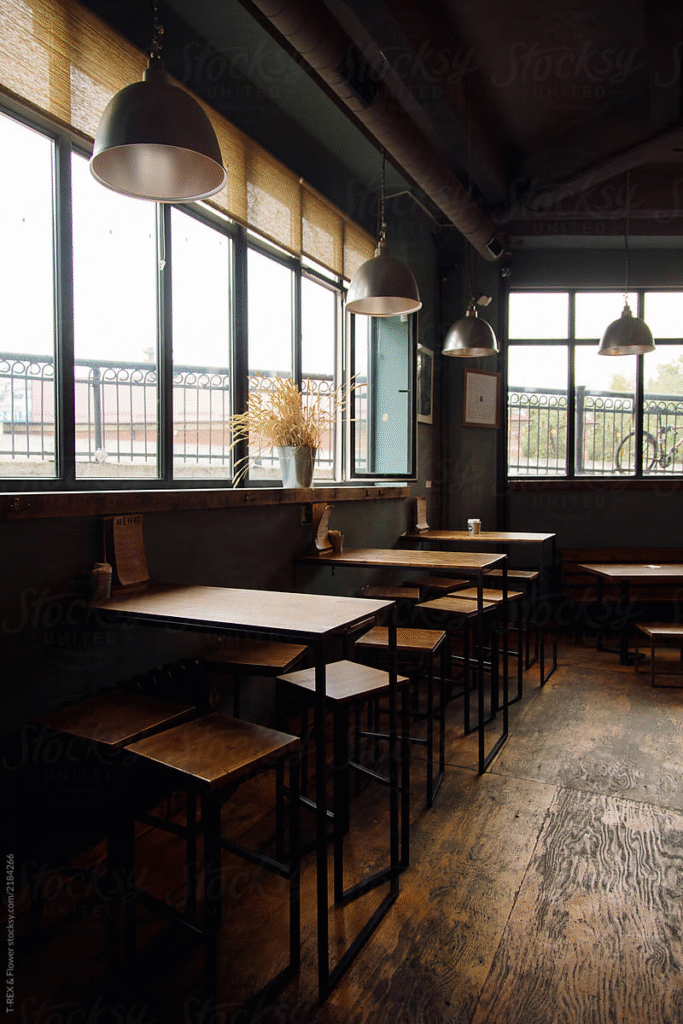
“Let’s go down to the Sunset Grill
We can watch the working girls go by
Watch the “basket people” walk around and mumble
And stare out at the auburn sky
There’s an old man there from the Old World
To him, it’s all the same
Calls all his customers by name
Down at the Sunset Grill
Down at the Sunset Grill
Down at the Sunset Grill
Down at the Sunset Grill“

One of them carries a battered book — annotated to death — where conversations with the dead are scribbled in the margins.

Margin notes are the fingerprints of a soul in contact with a mind across centuries.
They are miniature acts of immortality on both sides.
Reading is not consumption —
It is conversation.
To write in the margins is to enter into dialogue with the author across time.
It is a declaration:
“You have not merely spoken.
I am here, speaking back.”
A great book is not one that merely informs you —
It transforms you by engaging you in a mental struggle.
When you write questions, disagreements, affirmations in the margins, you are thinking, not merely receiving.
(This is what the young of today fail to grasp.)
That dialogue is the mark of active reading and, more profoundly, creative response.
To write is to respond to those who came before you.
To create is to enter the conversation of civilization.

I read your book
And I find it strange
That I know that girl and I know her world
A little too well
And I didn’t know
By giving my hand
That I would be written down, sliced around, passed down
Among stranger’s hands
Three days in Rome
Where do we go?
I’ll always remember
Three days in Rome.

Another hears music in her mind that is not homage but argument with Beethoven.

“Night time sharpens, heightens each sensation
Darkness stirs and wakes imagination
Silently the senses abandon their defenses
Helpless to resist the notes I write
For I compose the music of the night.
Slowly, gently, night unfurls its splendor
Grasp it, sense it, tremulous and tender
Hearing is believing, music is deceiving
Hard as lightening, soft as candlelight
Dare you trust the music of the night.”

The painter is not trying to imitate Van Gogh’s sunflowers —
But to say:
“Vincent, you were wrong.
The sun does not burn.
It bleeds.”
She paints not to copy him, but to converse with him.

Above: Painter on the Road to Tarascon, Vincent van Gogh (1888)
Étienne’s pen trembles in his hand.
He stares at the blank page as if it were a precipice.
And then, without thought, he begins.
The words come raggedly at first,
Halting,
Uncertain —
A confession more than a narrative.
But each line he writes seems to clear the air,
Each sentence a small exorcism of fear.
He stops only when he realizes he has written a paragraph that astonishes him,
Not for its elegance,
But for its honesty.

“I must have got up about twenty to seven
Had a shower and had breakfast
And had a couple of pieces of toast
You know, forced it down
Then had a cup of coffee
It was pouring with rain
And I thought, “Oh, God,
You know, good old England“.
I get this writer’s block
It comes as quite a shock
And now I’m stuck between
A hard place and the biggest rock
In my own head consumed
I sit back in my room
It’s like the tapestries of life
Get tangled in the loom
I’m like a butterfly
Caught in a hurricane
My pulse is quickenin’
As my heart plays a new refrain
I’m lovin’ Mary Jane
Flyin’ with Lois Lane
On board a bullet train
Don’t know yet if I’m glad I came
Don’t know yet if I’m glad I came
Don’t know yet if I’m glad I came
Don’t know yet if I’m glad I came
(I always hoped that it would happen)
(But I never thought it really would)
Sometimes at night I think too much
About life and love and music and stuff
I mustn’t sort of build
My hopes was too high
I’m livin’ in the past
My clock’s an hour fast
Should really go and make a coffee
But I can’t be arsed
I’ve lost my mobile phone
You’ll have to call my home
On second thoughts, just leave a message
When you hear the tone
My grimy windows show
The early morning glow
Another day, another dollar
In my one man show
I’m lovin’ Mary Jane
Flyin’ with Lois Lane
On board a bullet train
Don’t know yet if I’m glad I came
Don’t know yet if I’m glad I came
Don’t know yet if I’m glad I came
Don’t know yet if I’m glad I came
(I always hoped that it would happen)
(But I never thought it really would)
I fell out with Mary Jane
I don’t speak to Lois Lane
And I missed that bullet train
But now I know I’m glad I came

Mireille’s brush follows a similar impulse.
She mixes vermilion and cobalt with no plan,
Letting instinct guide her.
The first stroke startles her —
A slash of color she had always deemed too bold, too brash, too revealing.
Yet the canvas does not reject her audacity.
It embraces it.
Each subsequent stroke becomes dialogue —
With herself,
With Van Gogh,
With the unborn self who has waited decades for courage to emerge.

Above: Cypresses in Starry Night, Vincent Van Gogh (1889)
Clara, finally, allows her fingers to fall on the imagined keys.
A chord emerges,
Hesitant at first, then insistent,
Pulsing in the room like a heartbeat.
She imagines the melody as if it were visible —
A ribbon of sound weaving through candlelight, curling around the table, brushing against the unborn selves seated beside them.
For the first time, it is not homage.
It is argument, confession, revelation.

The trio pauses,
Breathless.
In the Café de la Paix, no applause answers them.
No ghost leans forward in approval.
Only the thick, expectant silence —
Which now feels alive, attentive, receptive.
The fourth chair shifts again, subtly,
Almost imperceptibly.

But this time, Étienne senses it differently.
It is not judgment.
It is companionship.
The unborn selves are no longer specters to haunt them,
But partners to witness them —
To affirm that beginning is itself an act of courage,
That creation is the acknowledgment of one’s own existence.

“And I am a writer, writer of fictions
I am the heart that you call home
And I’ve written pages upon pages
Trying to rid you from my bones
My bones
My bones
And I am a writer, writer of fictions
I am the heart that you call home
And I’ve written pages upon pages
Trying to rid you from my bones
I am a writer, I am all that you have home
Home
And I’ve written pages upon pages
Trying to rid you from my bones
My bones
My bones
And if you don’t love me, let me go.“

The candlelight trembles across the table.
The Café seems to lean closer.
And in that liminal glow — between fear and audacity, memory and possibility — the three creatives create for themselves,
Fully, irrevocably,
Alive.
Not for the dead.
Not for the world.
But for the selves who have waited all along.
The haunting becomes — beautifully — a marginalia of the soul.

“Close your eyes, for your eyes will only tell the truth
and the truth isn’t what you want to see.
In the dark it is easy to pretend
That the truth is what it ought to be.
Softly, deftly, music shall caress you
hear it, fear it, secretly possess you
Open up your mind, let your fantasies unwind
this darkness which you know you cannot fight
The darkness of the music of the night.“

In that quiet, tremulous space, the Café itself seems to breathe.
Each flicker of candlelight casts not shadows, but suggestions
Possibilities of what each might yet become.
No master speaks,
No chord resolves fully,
No pigment reaches its final form.
And yet, in the unformed, the unfinished,
The trio find a strange perfection:
The perfection of engagement,
Of confrontation with their own potential,
Of communion with the unborn self.

Étienne’s pen never pauses long enough to doubt.
Mireille’s brush never falters, even when the colors clash violently, insisting on being seen.
Clara’s imagined piano sings a fugue of defiance, hope, and confession,
Audible only in the space between thought and action.
The fourth chair remained, always there, a constant reminder:
The self that waits,
The self that dares,
The self that will never stop observing until met with courage.

Here, in the Café de la Paix, creation is not the act of the living over the dead.
It is a conversation —
With time,
With possibility,
With one’s own unclaimed existence.
And as the trio works, the Café whispers once more, faintly, tenderly:
“Begin.”
And they do.
Again and again.
Not for glory.
Not for homage.
Not for eternity.
But for themselves.
The marginalia of their souls,
Written in strokes of ink, color, and imagined sound,
Became their testament —
Proof that the unborn self needs not remain silent,
If only one dares to speak.

“Close your eyes, start a journey to a strange new world.
Leave all thoughts of the world you knew before.
Close your eyes and let music set you free.
Only then can you belong to me.
Floating, falling, sweet intoxication
Touch me, trust me, savor each sensation
Let the dream begin, let your darker side give in
To the power of the music that I write
The power of the music of the night
You alone can make the song take flight
Help me make the music of the night.”

Svevo whispers to anyone, perhaps himself, who might be listening:
“The greatest master who haunts you is the one who lives within you, unrealized.“

Above: Italo Svevo’s violin
If only Van Gogh would guide my hand…
If only Beethoven would light the fire in my veins…
If only Cervantes would whisper narrative truth into my ear…
Why can I not hear my own voice above theirs?

“Sing, sing a song
Sing out loud
Sing out strong
Sing of good things not bad
Sing of happy not sad.
Sing, sing a song
Make it simple to last
Your whole life long
Don’t worry that it’s not
Good enough for anyone
Else to hear
Just sing, sing a song.
Sing, sing a song
Let the world sing along
Sing of love there could be
Sing for you and for me.
Sing, sing a song
Make it simple to last
Your whole life long
Don’t worry that it’s not.
Good enough for anyone
Else to hear
Just sing, sing a song.“
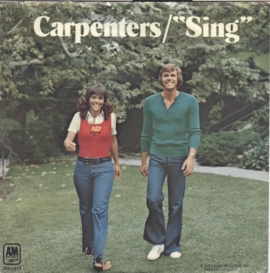
This is a journey from imitation to individuation —
From worship to awakening.

“All the late night bargains have been struck
Between the satin beaus and their belles
Prehistoric garbage trucks
Have the city to themselves
Echoes and roars of dinosaurs
They’re all doing the monster mash
And most of the taxis, most of the whores
Are only taking calls for cash
I don’t know how it happened
It all took place so quick
But all I can do is hand it to you
And your latest trick.“

“Genius is not a visitation,” Étienne says, running his fingers over the ink-stained margins of his book.
“It is a quarrel.
And I will not find peace until I win an argument with a man who has been dead for hundreds of years.”
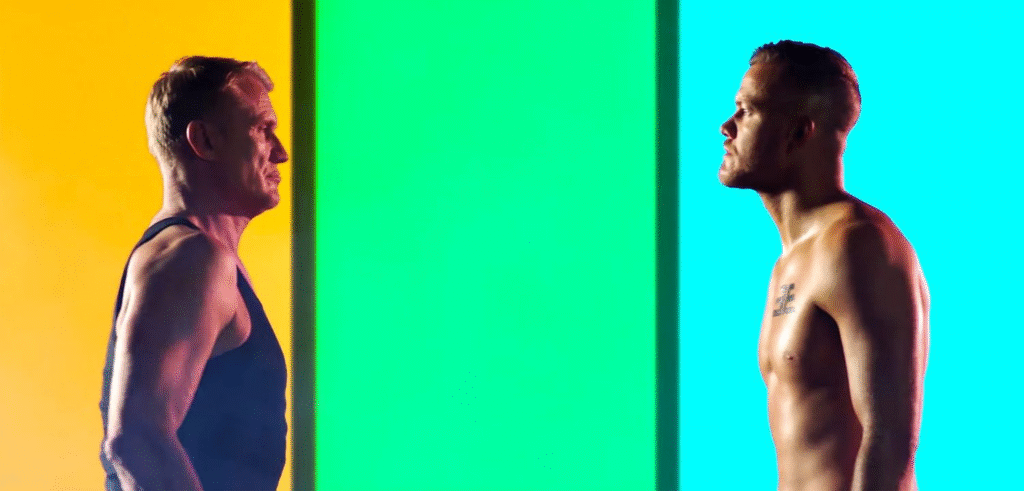
“Well, now it’s past last call for alcohol
Past recall has been here and gone
The landlord, he finally paid us all
The satin jazzmen have put away their horns
And we’re standing outside of this wonderland
Looking so bereaved and so bereft
Like a Bowery bum when he finally understands
The bottle’s empty and there’s nothing left.
I don’t know how it happened
It was faster than the eye could flick
But all I can do is hand it to you
And your latest trick.“
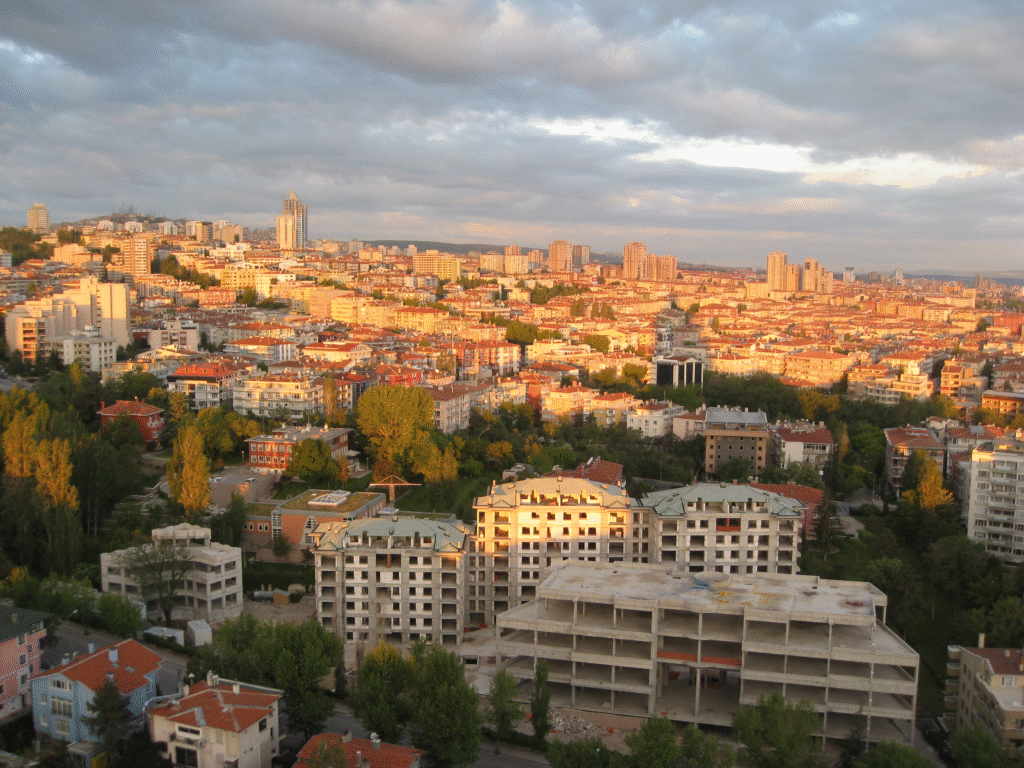
Above: Ankara morning
Cervantes (the voice of irony and resilience) impatiently bangs the table and stares at Étienne:
“You three sit here wounded by invisible battles.
Be comforted:
The noblest journeys are those where the dragons are within.
I wrote of windmills not to mock madness, but to honour it —
For the world calls madness what the soul calls truth.
If you seek peace, do not wait for it.
Charge it as a knight charges a phantom foe —
Because peace is not the absence of battle, but the conquest of oneself in the midst of it.“
Cervantes raises a glass:
“To battles that are illusions —
Yet must be fought.”

Above: Miguel de Cervantes
Pessoa answers:
“To selves we have not yet met, but already are.”
Pessoa (the voice of multiplicity and metaphysical exhaustion) addresses the assembled:
“My friends, do not be too eager to be ‘one thing.’
I lived as many men, each one truer than the last.
The self is a café of mirrors — each reflection drinking a different cup of destiny.
If you suffer, it is only because you are trying to compress infinity into a single identity.
Instead, allow yourself to be plural.
Invite your sorrow and your joy to share the same table.
And they will cease to quarrel.“
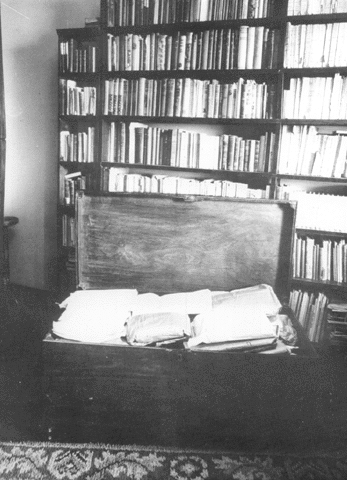
Above: Pessoa’s estate: the famous chest, with more than 25,000 pages, and part of his personal library.
Van Gogh (the voice of tenderness and blazing faith in beauty) speaks to Mireille:
“Even as I painted the stars, they burned in me like unanswered prayers.
Do not be afraid of your torment —
It is the price you pay for seeing beauty clearly.
Every brushstroke I laid upon the canvas was a cry for peace, yes, but also a declaration that peace is made, not found.
If you cannot find peace in life, create it in colour, in words, in acts of kindness nobody notices but God.“
Van Gogh adds softly:
“To beauty that breaks us — and heals us.”
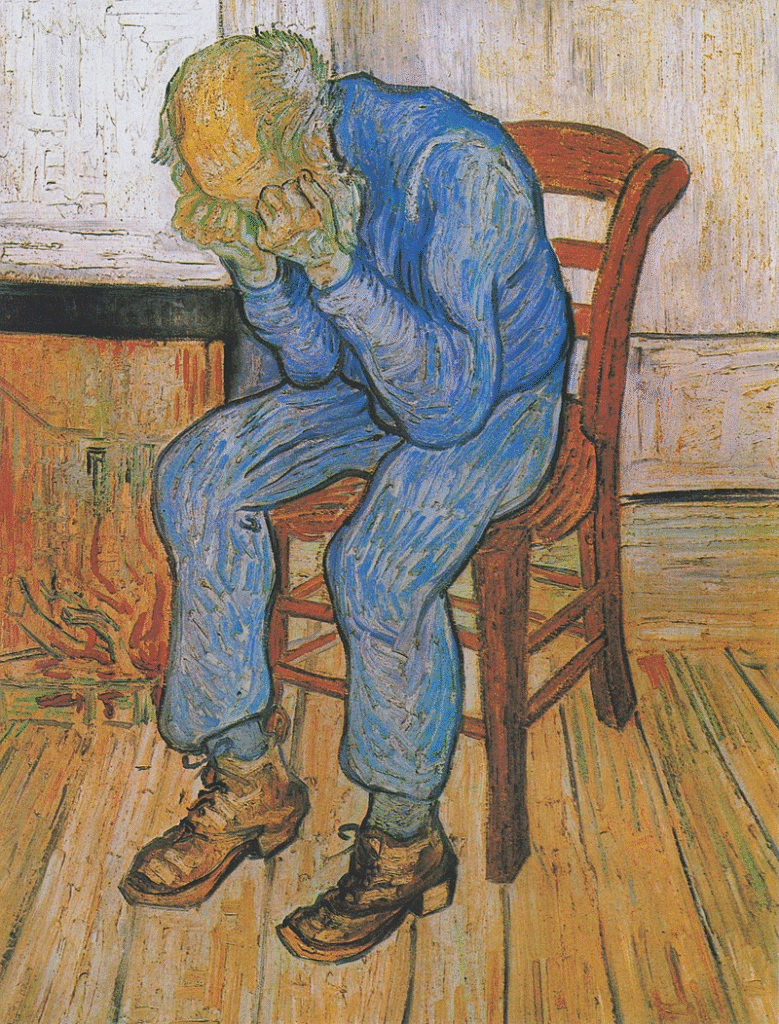
Above: Sorrowing old man at Eternity’s gate, Vincent van Gogh 1890
Beethoven (the voice of defiance against fate) glares at Clara:
“I lost my hearing so that I could hear eternity.
You complain of storms?
Good.
Storms are the only real teachers.
Do not seek peace as an escape from dissonance —
Learn to resolve it.
Build your fugue from your despair and end it in a triumphant chord.
The world may never understand you, but your struggle itself will become a symphony.“
Beethoven thunders:
“To peace wrested from the jaws of thunder!”

Above: Ludwig von Beethoven
Mozart (the voice of innocence and divine spontaneity) chimes in, advising Clara:
“Why so serious?
Peace is a child that hides under the piano.
You do not wrestle it into being —
You play it into being.
Laugh more.
Be astonished more.
Your pain is real, yes —
But so is joy.
It is not childish to seek joy.
It is godlike.
For even the angels describe creation not as suffering, but as singing.”
Mozart laughs:
“To the café where Eternity stops in for a drink.”
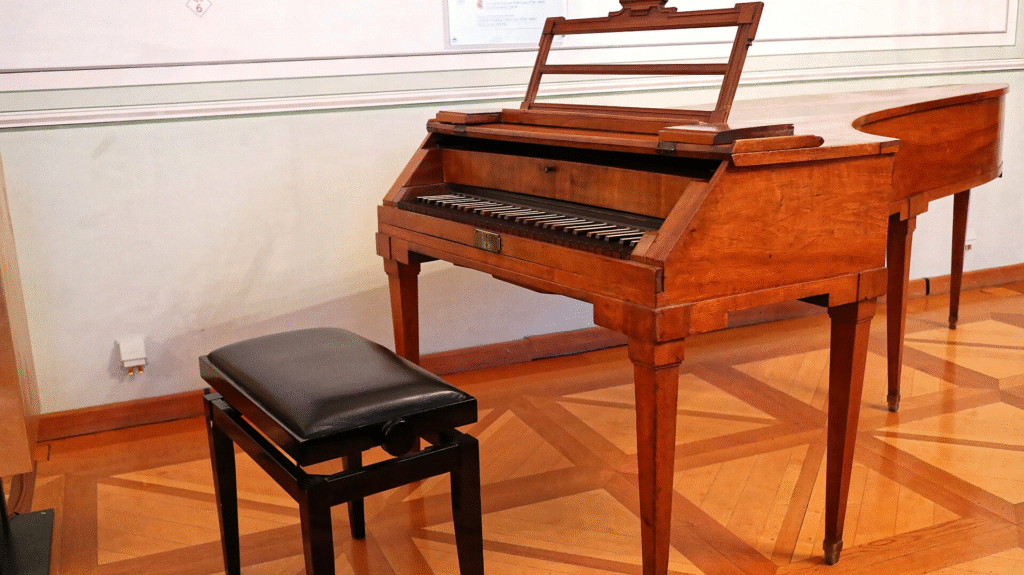
Above: Mozart’s fortepiano, Mozarthaus, Salzburg, Austria
The Café’s denizens don’t just want to be haunted —
They want to enter negotiations:
They seek not possession by the past
But permission to alter and continue the past.
But ghosts come not to be worshipped, but to be confronted —challenged — set free or reanimated.
They are not haunted by the dead.
They are haunted by the version of themselves that is not yet born:
A self shaped by the past but imprisoned by reverence to it.
The lamplight trembles again, casting flickering reflections across the table.
The unborn selves lean closer —
Not visible, not audible, but undeniably present.
Each breath, each hesitant movement of pen, brush or hand, seems to draw them nearer.
They are not critics.
They are witnesses, mirrors, provocateurs.
Étienne feels them in the tremor of his wrist, the pull of sentences yet unwritten.
Every word he has hoarded seems to ripple with the weight of potential, as if the fourth chair exhales quietly, a patient insistence:
Begin.
Do not fear yourself.

Mireille’s brush hovers, suspended above the palette.
The colors vibrate with the hum of unseen eyes.
She paints not for Van Gogh nor for any master, but for the child of herself who had never dared to claim a stroke.
With each movement, the canvas answered, whispering the truths she had denied:
Desire is courage.
Color is confession.
Life itself is audacious.

Clara’s fingers fall on the imagined keys again.
The air shimmers as a fugue emerges —
Not a composition from memory or imitation,
But a resonance of the unborn selves pressing into being.
She does not hear Mozart or Beethoven.
She hears herself in conversation with what has yet to exist.

The Café leans in.
It is no longer just a space,
No longer a threshold.
It is a crucible.
The walls themselves seems to pulse with the heartbeat of creation,
Each flickering candle a heartbeat,
Each shadow a question:
Who will you be if you refuse to wait?

“Are you waiting on a lightning strike?
Are you waiting for the perfect night?
Are you waiting ’til the time is right?
What are you waiting for?
Don’t you wanna learn to deal with fear?
Don’t you wanna take the wheel and steer?
Don’t you wait another minute here?
What are you waiting for?“

And then — soft, almost imperceptible — the fourth chair shifts again.
Not a movement, but a suggestion of weight, a sigh, a presence acknowledging the trio’s courage.
Étienne feels it as a light pressure on his back, Mireille as a warmth in her palms, Clara as the vibration of an unseen chord.
“You are beginning,” the silence seems to say.
“But the journey is not toward them.
It is toward yourself.”
The trio exchange glances, understanding at last that the ghosts of greatness have never been the prize.
The prize is always the confrontation with their own deferred selves —
The children of imagination, courage and fear who have waited in quiet accusation.

“You gotta go and reach for the top.
Believe in every dream that you got.
You’re only living once, so, tell me,
What are you, what are you waiting for?
You know you gotta give it your all,
And don’t you be afraid if you fall.
You’re only living once, so, tell me,
What are you, what are you waiting for?”
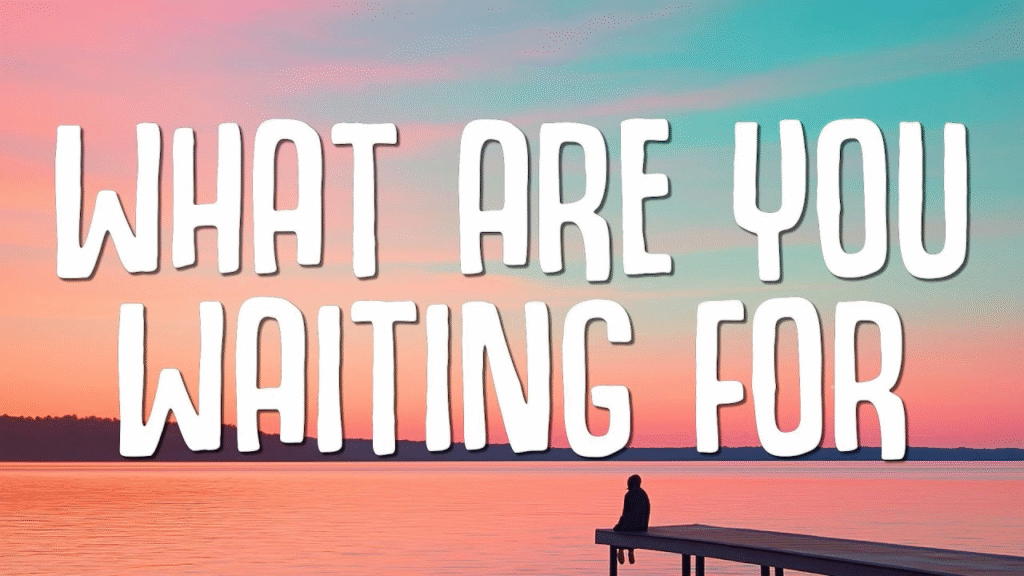
A wind stirs through the Café, though the windows are shut.
The candle flames dance higher, casting the shadows into sudden motion.
The unborn selves are everywhere now, not oppressive, not accusatory, but active —
Alive in expectation.
Étienne’s pen flies.
Mireille’s brush sings.
Clara’s hands speaks.
The room vibrates — not with applause, not with validation — but with acknowledgment:
That the act of beginning is itself the creation they have sought, the argument they have wished to have, the conversation they have imagined across centuries.

“Are you waiting for the right excuse?
Are you waiting for a sign to choose?
While you’re waiting it’s the time you lose
What are you waiting for?
Don’t you wanna spread your wings and fly?
Don’t you really wanna live your life?
Don’t you wanna love before you die?
What are you waiting for?
What are you waiting for?”
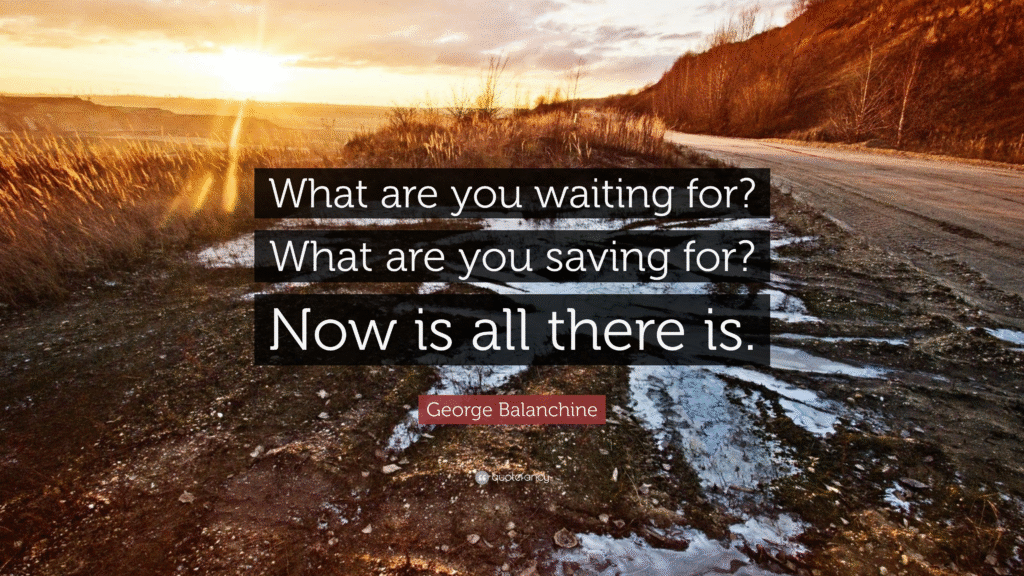
And then, just as the crescendo seems infinite, the Café exhales.
The shadows fall still.
The candlelight steadies.
The fourth chair — ever patient, ever present — tilts ever so slightly toward them, a subtle gesture of assent.
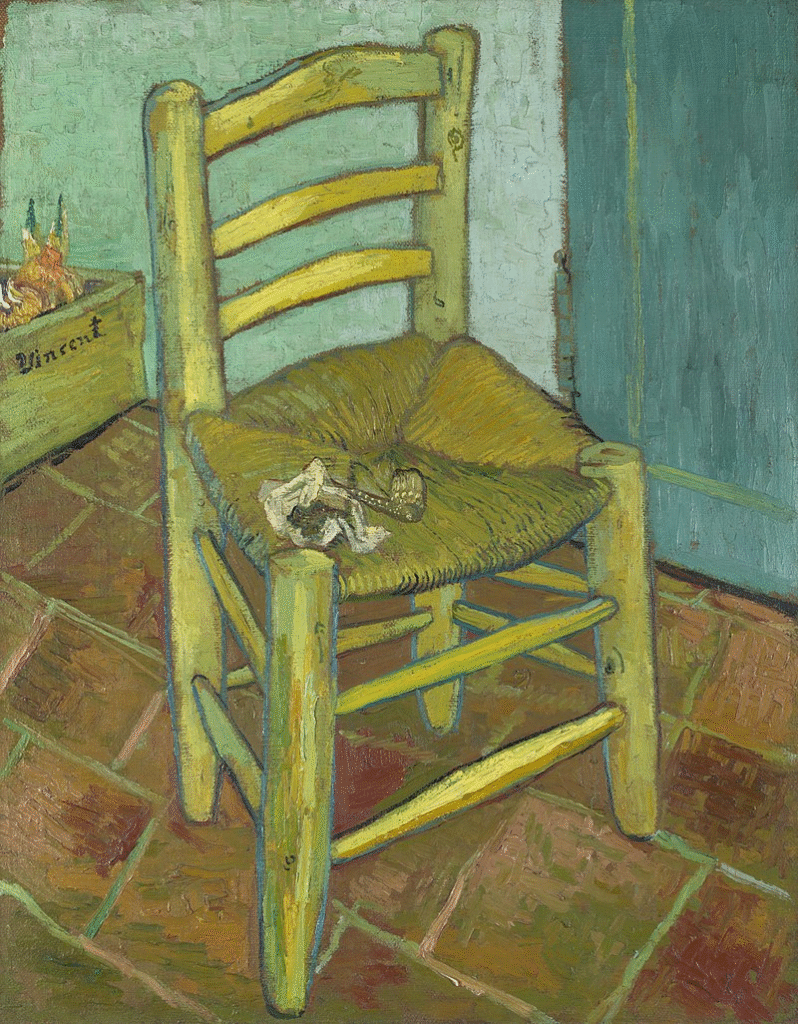
Above: Chair, Vincent van Gogh (1888)
In that instant, the trio understands:
The turning point has come.
Not a revelation from the dead, not a moment of clarity from the past, but a birth within themselves.
They are no longer waiting.
They are no longer seeking ghosts.
They are awake.

“Everybody’s gonna make mistakes,
But everybody’s got a choice to make.
Everybody needs a leap of faith.
When are you taking yours?
What are you waiting for?“

And in the Café de la Paix, the night settles around them like a promise:
That creation is always possible, once the courage to speak to the unborn self is found.
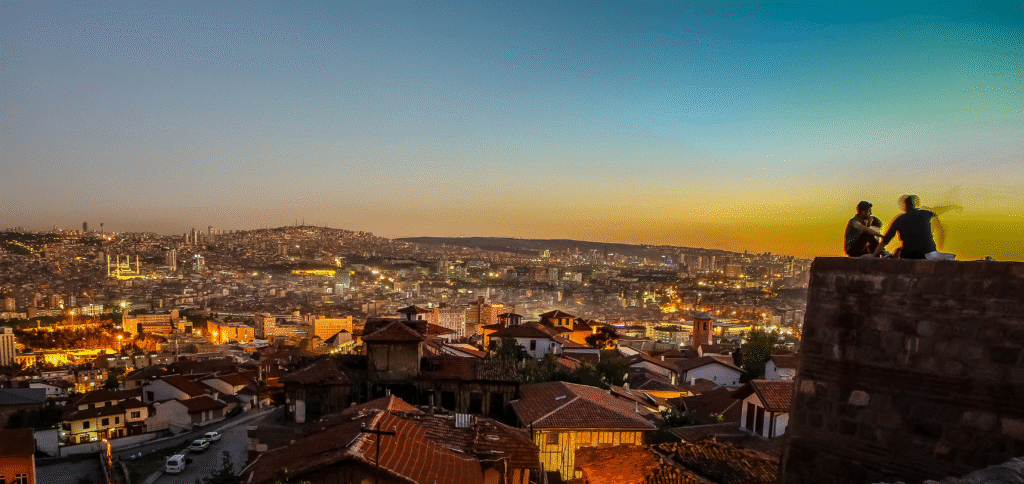
Above: Ankara sunset
Evening is when the city loosens its collar.
Couples meet beneath the trees, hands brushing as they share roasted chestnuts.
Cafés around Kuğulu Park (such as Cafemiz or Kaktüs) are known for quiet flirtation and candlelit corners.
The mood here is intimate tenderness — romantic, poetic, emotionally charged.
This is where seduction begins with eyes and poetry.

Above: Kuğulu Park, Ankara
I live in Çankaya.
Embassies infiltrate this district, giving it a distinctly cosmopolitan air.
Wine bars, roof lounges and international restaurants host diplomats, NGO workers and expats.
The sensuality here is sophisticated power-play — connections formed over wine, cigarettes and subtle innuendo rather than overt displays.
Seduction here is political, elegant, strategic.

Above: Çankaya, Ankara
I live near Bestekar Sokak in the Tuneli area.
Jazz bars and dimly lit lounges awaken as night settles.
Live music, slow rhythms, bodies leaning toward each other — not for the dance, but for the closeness of conversation.
This is where sensual energy is auditory and atmospheric, the kind that enters through the ears and settles in the blood.
Here, seduction is rhythm.

Above: Ankara
In nearby Kızılay, one finds old style meyhanes (rakı houses) where voices soften in the haze of anise and melancholy.
Lovers of literature and philosophy gather here — a place of emotional vulnerability.
Sensuality here is born of confession, the desire to be known in one’s rawness.
Seduction here is truth shared in low light.
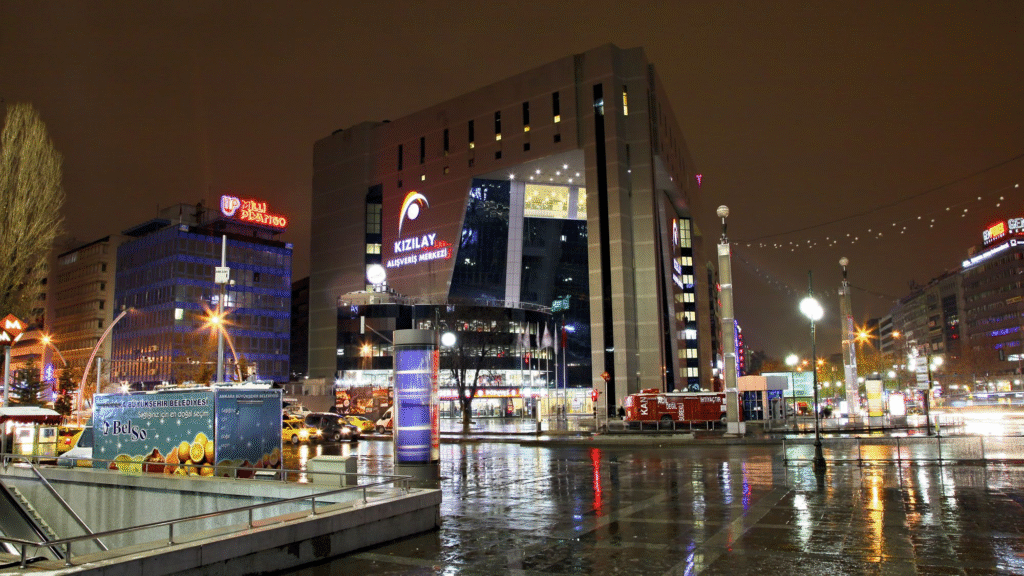
Above: Kızılay, Ankara
Seğmenler is a quiet, sprawling park where young lovers retreat from the city.
The darkness creates invisibility.
The trees hold secrets.
Murmured conversations.
Laughter under breath.
Movement in shadow.
This is the sanctuary of stolen moments.
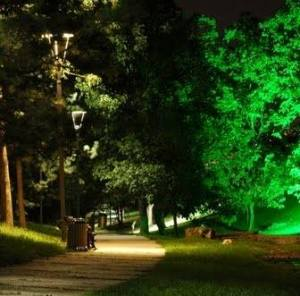
Above: Seğmenler Park, Ankara
The city conceals hidden apartments.
Not spoken of openly, but understood.
Luxury flats rented for short-term privacy, often for discreet meetings of power and passion.
This is Ankara’s veiled world —
Where sensuality slips into secrecy.
Seduction here is hidden behind heavy curtains and government plates parked outside.

Above: Ankara
Night in Hamamönü.
Lanterns lit.
Traditional homes turned into tea gardens.
The blend of Ottoman architecture, the fragrance of shisha, soft music evokes an oriental timelessness — the sensuality of nostalgia and yearning.
Here, desire wears the robe of memory.

Above: Hamamönü, Ankara
Ankara’s sensuality is:
Intellectual, not flamboyant.
Inward, not performative.
Emotional, not purely physical.
Rooted in longing, not satisfaction.
This is a city where seduction is not displayed —
It is discovered.
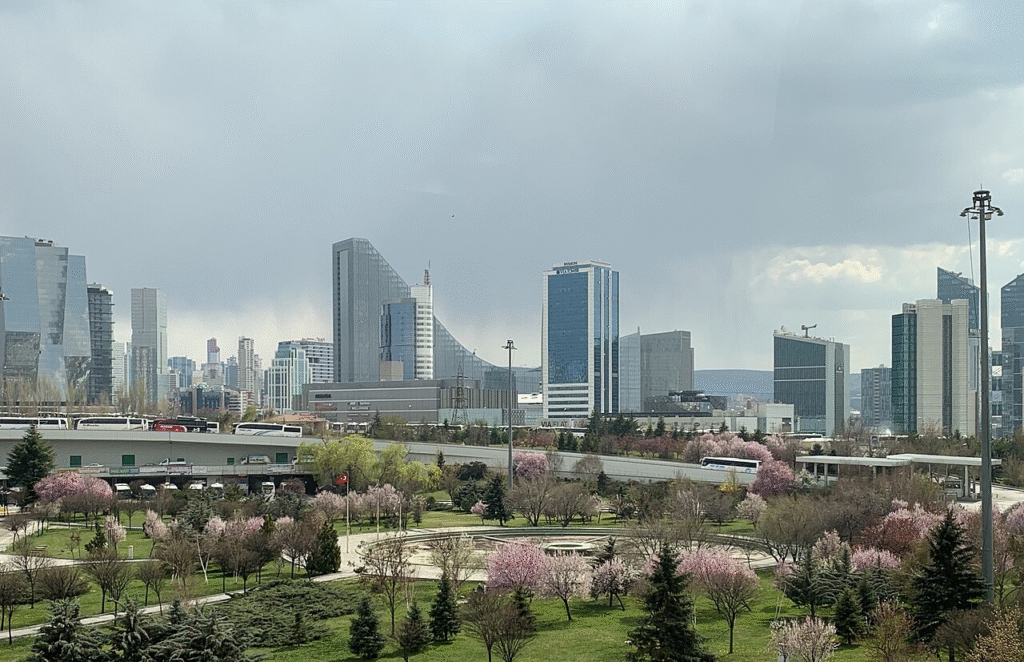
Above: Ankara
Ankara does not give its sensuality easily —
It is not like Istanbul, which sings it from the sea.
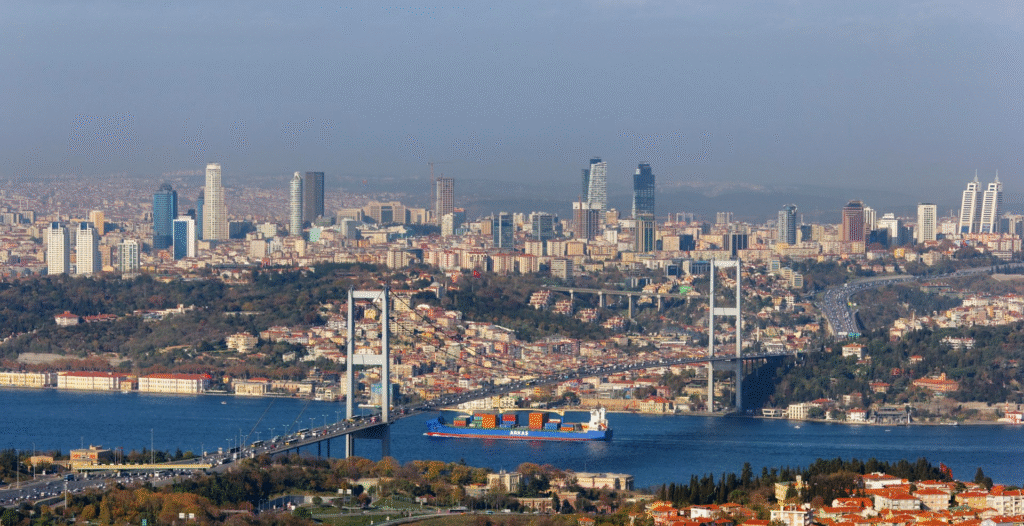
Above: Istanbul
Ankara whispers —
And only those who know how to listen will hear.
The sensual side of the capital is subtle, intellectual and emotionally charged.
It lies in conversations that go too long, gazes that stay a moment too long, and places where inhibitions soften — not through spectacle, but through intimacy.
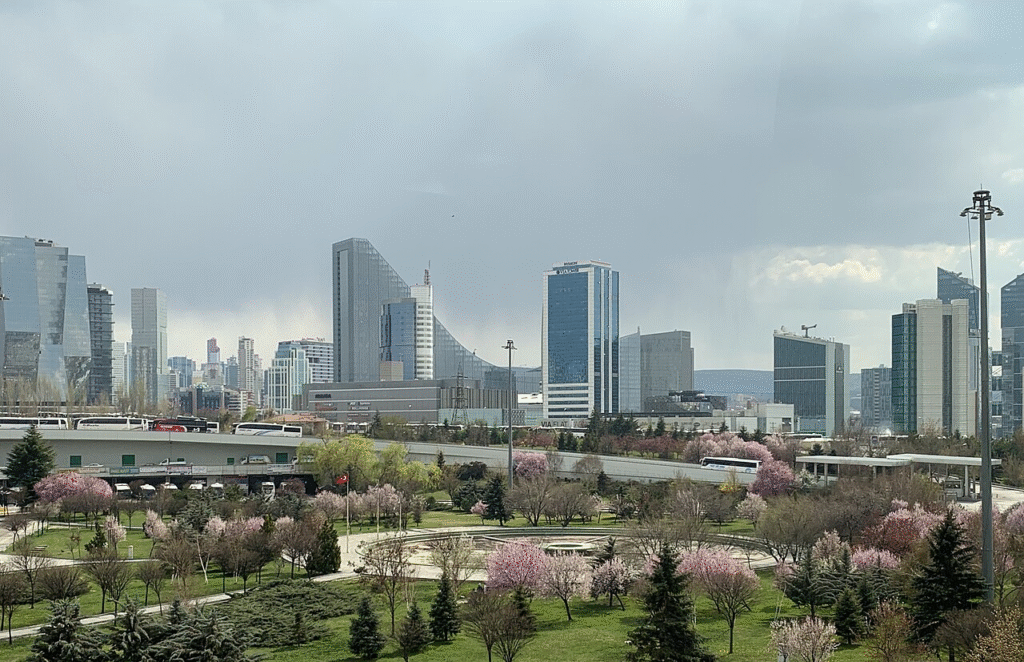
Above: Ankara
Ankara has an undercurrent of intimacy and attraction beneath its formal, governmental exterior — but in a subtle, human sense rather than a lurid one.
The capital’s public face is reserved:
Ministries, embassies, universities, conferences.
Yet that very reserve creates small fissures where personal desire and connection show through.

Above: Ankara
Late-night cafés around Kızılay, jazz bars in Çankaya, embassy receptions, and student gatherings in Tunali often carry that low hum of attraction that lives in any big city.

Above: Kızılay, Ankara
It’s less about overt sexuality and more about the tension between duty and longing, between official roles and private lives.
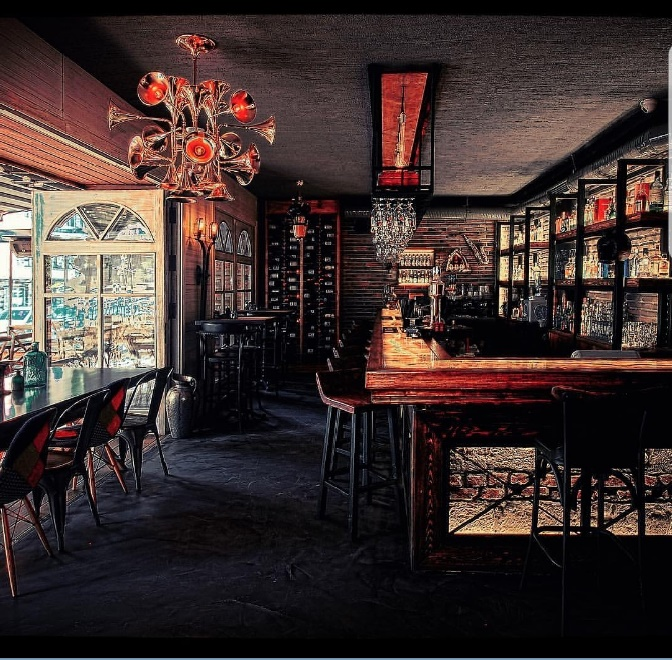
Above: June Bar, Çankaya, Ankara
Writers often find in Ankara a quiet sensuality — the warmth of shared tea after a long day, the intimacy of conversation in lamplight, the yearning for authenticity in a city of appearances.
It is the sort of seduction that happens through intellect, wit and presence rather than display.
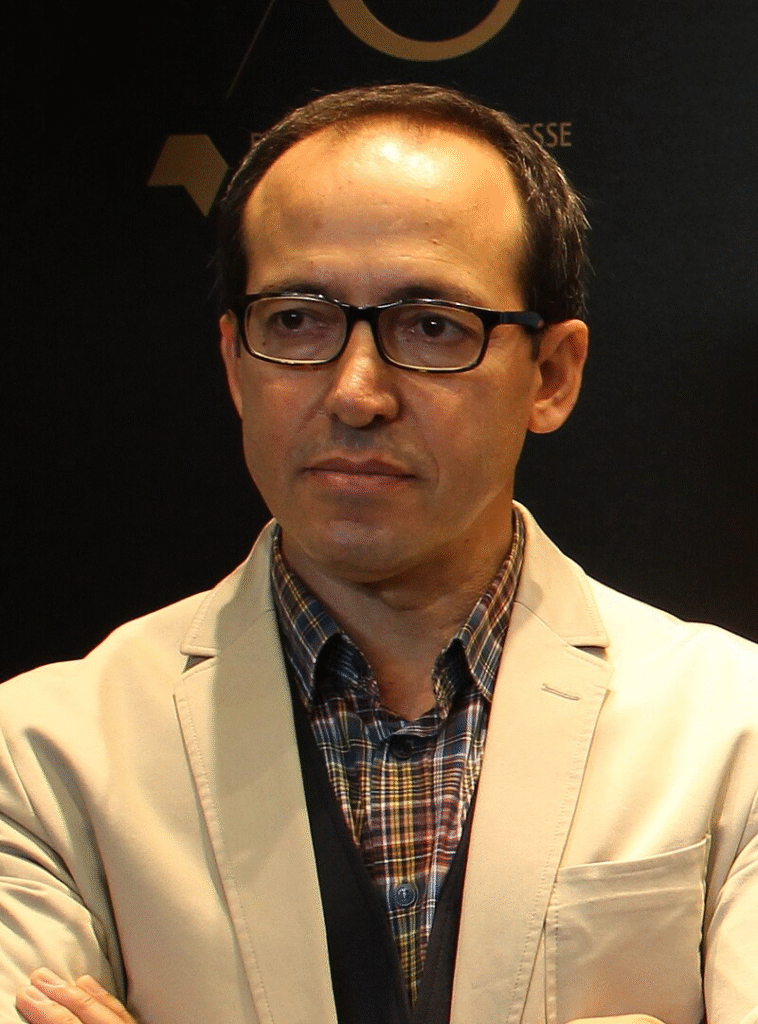
Above: Turkish writer Burhan Sönmez
There is a café in our city that does not exist on any map.
It appears only to those who are not at peace with themselves.
The sign above the door reads Café de la Paix, as if naming could conjure what the soul could not find.
Inside, time moves not forward, but inward.
On most evenings, pilgrims of the creative spirit sit at the far corner table, hoping to be haunted by the masters they revere —
Never suspecting that it is their own unborn selves who have come to claim them.
They seek peace, but find truth instead.
Peace is the promise of the Café, but perhaps not its gift.
It is a place of conversation, reflection, intellectual refuge.
Neutral ground between public and private life.
They pursue peace by invoking ghosts of greatness — only to discover that peace requires the courage to let go of those ghosts.
They go there to escape themselves, yet it is the only place where their true selves speak.
It promises tranquility, yet it is where the deepest unrest of the soul surfaces.
It is a sanctuary, yet also a mirror — reflecting what they are afraid to see:
Not the ghosts of the past, but the ghosts of their own unlived lives.
Just as “peace” is not the absence of conflict but the presence of understanding, the Café de la Paix is not an escape from longing —but the crucible in which longing is transformed into identity.
This is the Café de la Paix where they seek peace from the turmoil within themselves.
We came to the café hoping to be haunted by the dead.
But it was the unborn parts of our own souls that took their seats beside us, and asked why we had kept them waiting so long.

The Café de la Paix will still be there when you return —
Its lamps dimmed, the air fragrant with memory, your chair waiting.
Let your subconscious stroll its quiet streets and perhaps meet those unborn selves in dream.

“The clouds rolled in and hit that shore.
Now that Glory Train, it don’t stop here no more.
Now I look at the years gone by and wonder at the powers that be.
I don’t know why Fortune smiles on some and lets the rest go free.
Maybe the time has drawn the faces I recall,
But things in this life change very slowly, if they ever change at all.
No use in asking why, it just turned out that way.
So, meet me at midnight, baby, inside the Sad Café.
Why don’t you meet me at midnight, baby, inside the Sad Café?”
